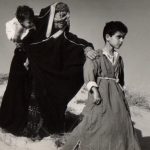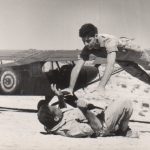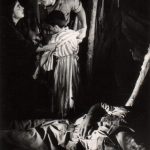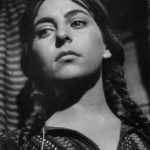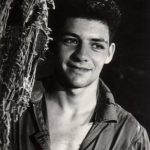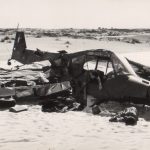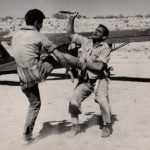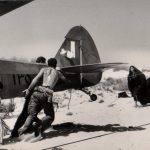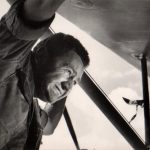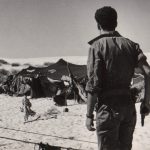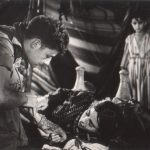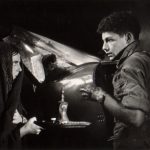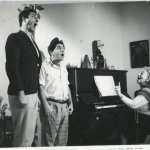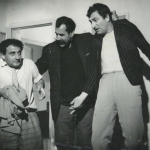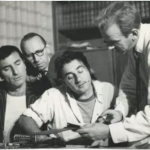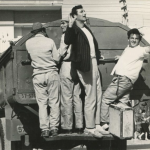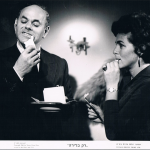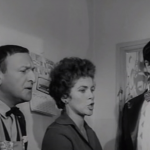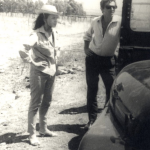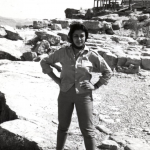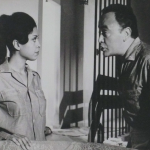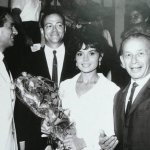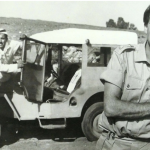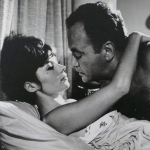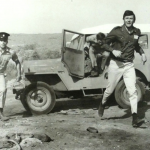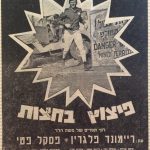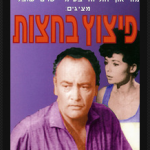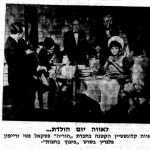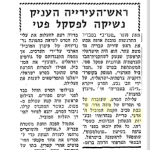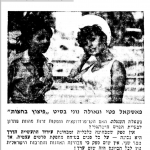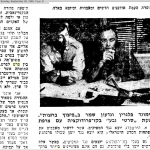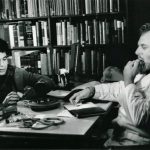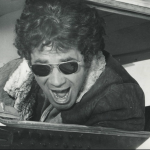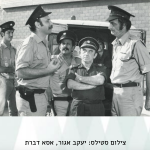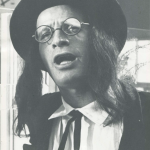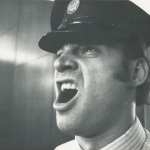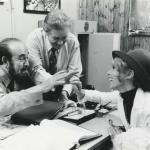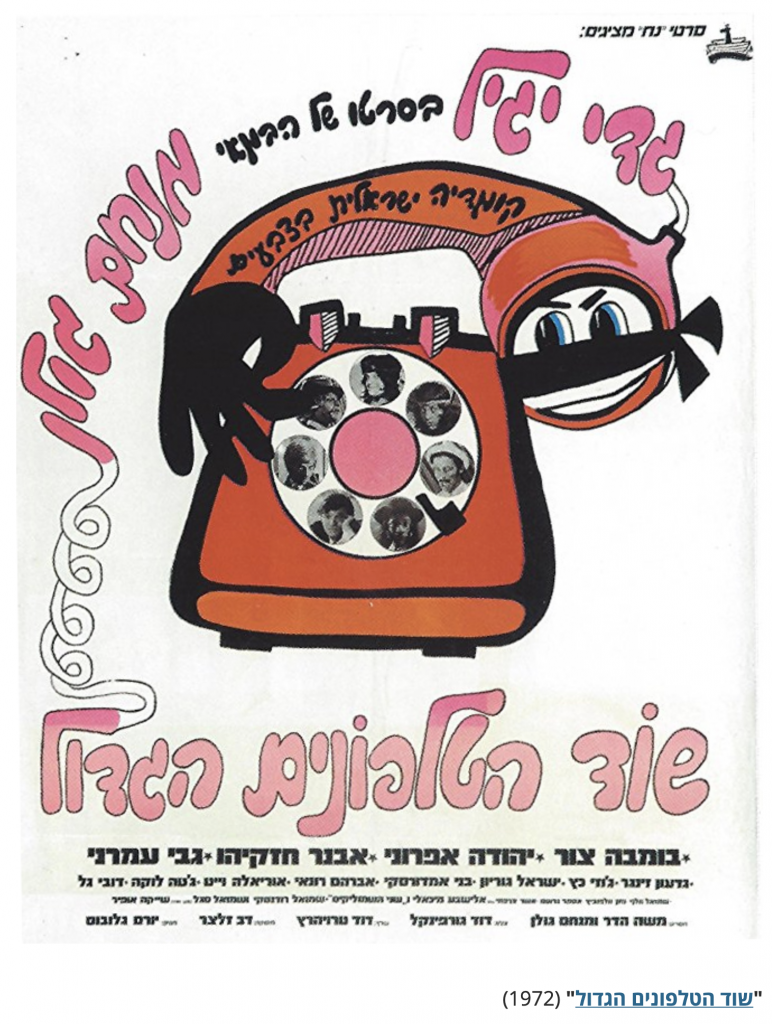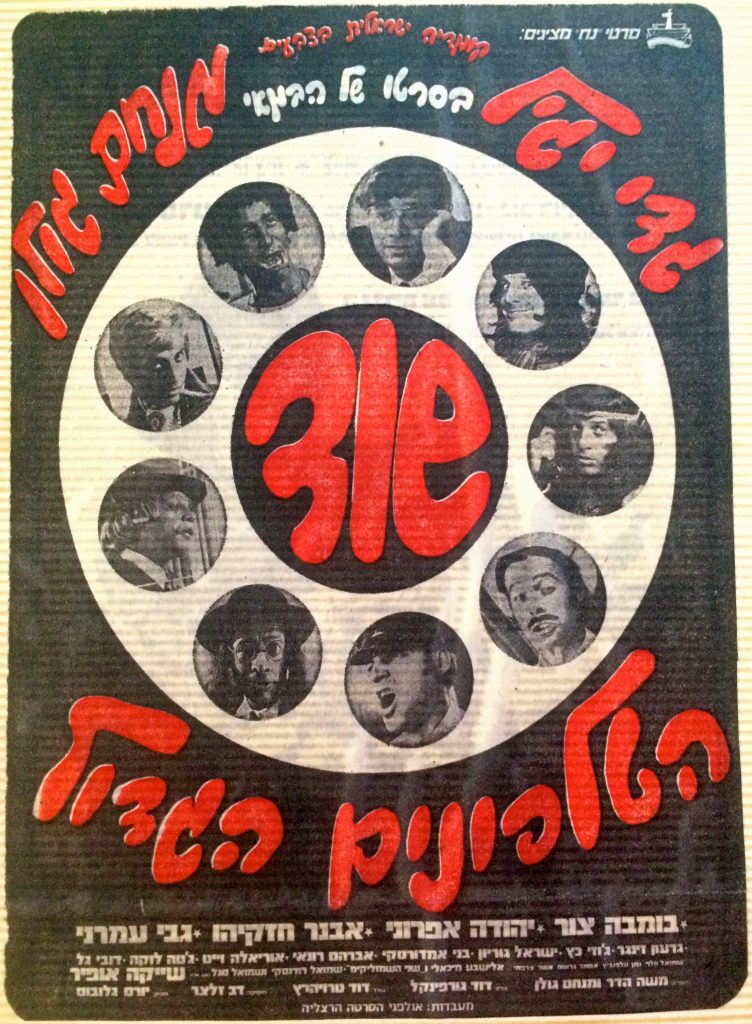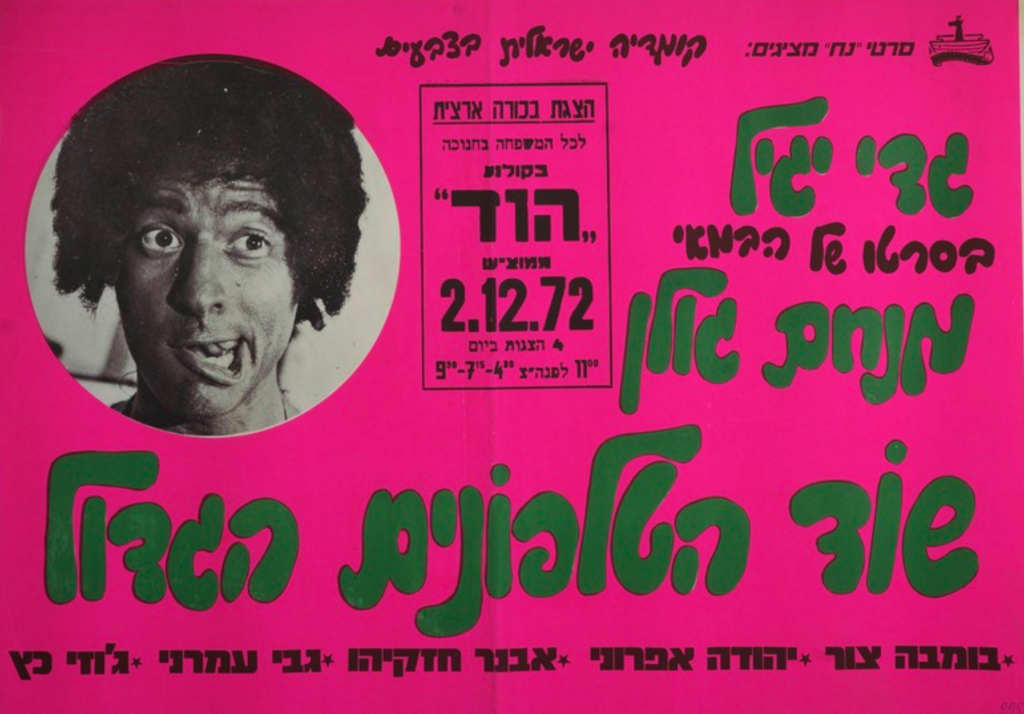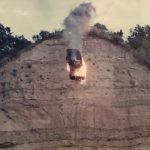Clouds Over Israel (Sinaia) – 1963
Screenplay: Moshe Hadar
Director: Ivan Langel
Cast: Dina Doron, Yiftach Spector, Shimon Israeli, Ehud Banai (as the eight-year-old), Sinaia in the role as herself
The movie "Sinaia" describes the tragedy of an Israeli jet pilot who must bail out over the Sinai as his jet begins to crash. He soon discovers that his downed plane killed a group of Bedouins. The only survivors were a severely burned woman (Dina Doron), her 5-year old son (Ehud Banai), and a baby daughter (Sinaia). The pilot takes care of them as best he can. Another Israeli officer comes and wants to kill the Bedouins, but the pilot will not let him.
Based on true story, two days before the close of the Sinai Campaign (Operation Kadesh), 1956, a little Bedouin girl was saved by IDF soldiers. The soldiers found on the scorching desert the body of a young Bedouin woman lay sprawled in the sand. Her dead hand was clutching desperately to her baby girl. The bullet that killed her mother had passed through and penetrated the young baby’s lung. She was rushed to a nearby field-hospital and was put in the care of Dr. Albert Bachar.
The baby was later brought to Kibbutz near Eilat. At the home of Joseph Levy, later mayor of Eilat, life defeated death in the feverish little body. There the unknown girl was given her new name "Sinaia". Later, Dr. Bachar, brought her to his Jerusalem flat, to live with his family, hoping to legally adopt the baby. His application awakened nationalist sentiments among several Arab notables. Finally, Sinaia was adopted by Knesset member Faris Hamdan, from the village of Baqa al-Gharbiya. Her name was changed from Sinaia to "Sena", an Arabic name that means "Light". As an adult, Sinaia married a Bedouin doctor from the Negev and proudly raised a family.
"The precious life saved in the midst of the horrors of war and desert," wrote David Greenberg, "sparked the imagination of screenwriter Moshe Hadar, editor of the Air Force Magazine. Usually, Hadar devoted himself to humorous scripts. This time he deviated. Although, the plot he developed is far from the facts, Hadar weaves around the image of the baby, a drama of assassination between two Israeli soldiers, who are caught in a remote Bedouin tent in Sinai – where only one mother survives with her two children. One of the two soldiers wish to abandon the mother and children without giving it a second thought, leaving them to die in the desert. His lifetime experiences taught him the concept of hate. The other soldier refuses to accept this viewpoint, and his love of tolerance and the need for compassion toward the local Arab population wins even when he himself falls a victim."
Roger Ebert, the American film critic, wrote about Clouds Over Israel (April 13, 1967), "Here is an unpretentious, moving Israeli film that has crept into town with such stealth…such a bald summary of the plot does injustice to Moshe Hadar's screenplay, which is concerned with the ways in which the soldiers and the Bedouins discover each other as human beings rather than "the enemy." Some of the subtitles are unnecessarily thematic (as the soldier bandages her arm, the woman thinks, "Could this be our enemy?"), but the over-all effect is convincing and touching…Surely the very point of the film itself is that such super-nationalism becomes irrelevant among people who understand each other. If you can arrange to arrive five minutes late and avoid the commercial, ever, you can anticipate a moving and authentic film experience."
In one Israeli newspaper, the critic wrote, "a human affair – as a movie," he continues, "and the screenwriter – the muscular, Moshe Hadar, who is worthy of being called, ‘The Screenplay # 1 of Israel’ because of his seniority and the plethora of screenplays and short screenplays he had written, said: 'In the film, we intend to give two perspectives on the Israeli Arab conflict. More precisely, the relationship between Arabs and Israelis. Two extremist point of views are battling each other in the film and only one is victorious: the one that advocates a fair and good humane attitude."
In an article by M. Ben-Yosef (Ma'ariv, August 28, 1961), he writes, “Moshe Hadar explains that his intention in the film was to raise the issues of the Jewish-Arab relations. The soldiers, Dan and Uri portray the two extreme vertices of Israeli youth to this issue. Dan is more humane, willing to help regardless of the religion and race of the needy. Uri was educated to hate the Arabs who hurt his family. His negative trend of fear and suspicion takes over, even as he faces an Arab woman and her helpless children. The violent tension between the two young soldiers raises baldly the ongoing conflict between Israel and the Arabs. At the end of the film, the recognition is highlighted that through understanding and mutual help you could find the path to enhanced better relations, coexistence and shared society.
As we read Pommy’s words, spoken so many moons ago, one can hear and vividly see an image of the humane and inclusive man, which some of us were fortunate enough, to know up close.
Dina Doron
As the Bedouin
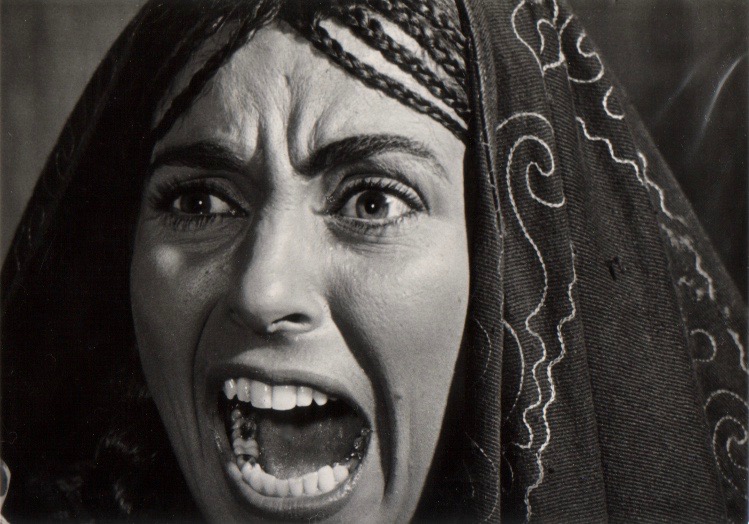
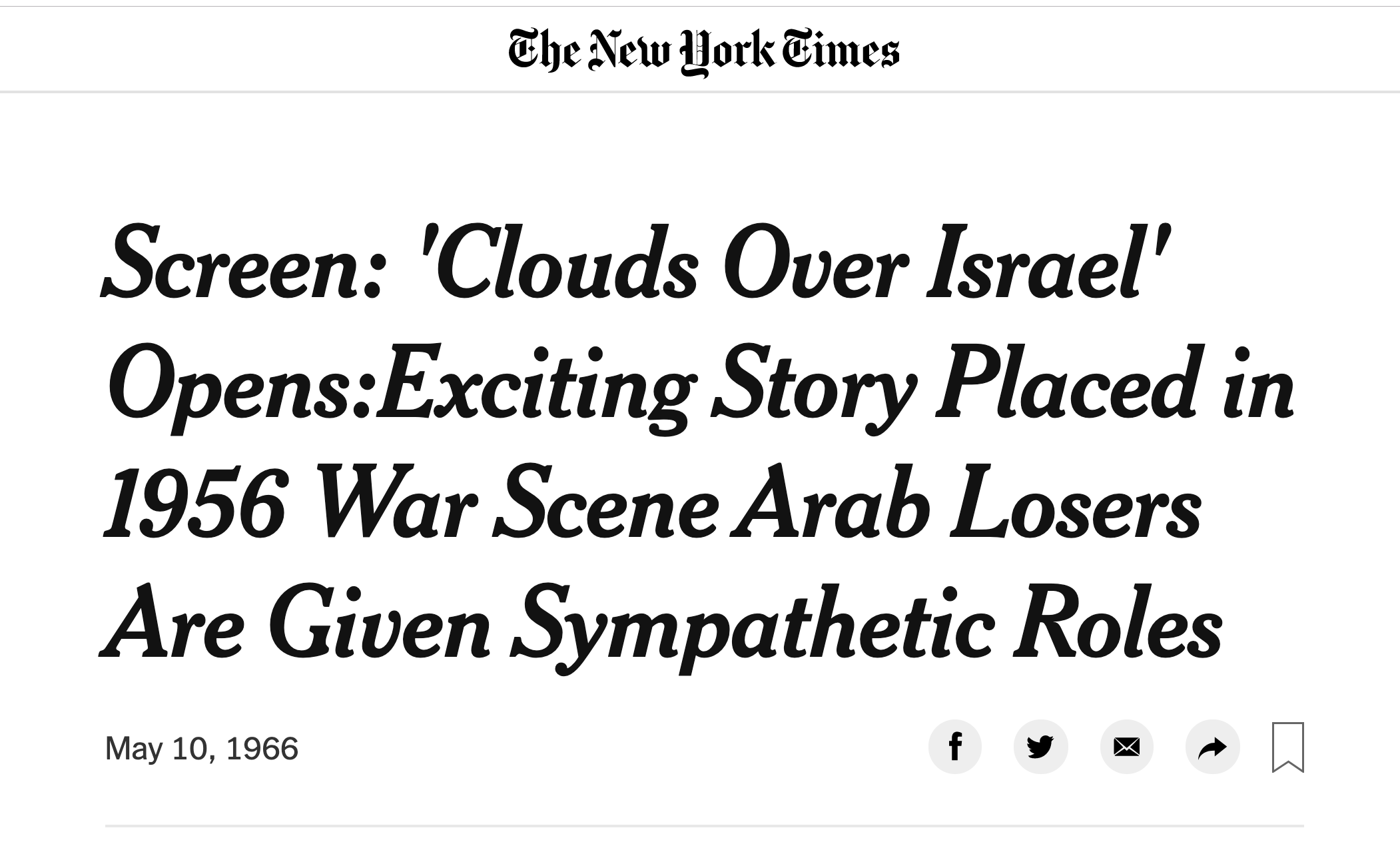
Sinaia in the USA
The movie Sinaia, in English "Clouds over Israel”. It was highly regarded by the American press. The New York Times reporter wrote, "Moshe Hadar's screenplay is brilliant in intensity, wisely saves in dialogues… approaching the truth, perhaps more than any other war movie…"
Dr. Albert Bachar and Baby Sinaia
Courtesy of Israel State Archives, 31 October 1951
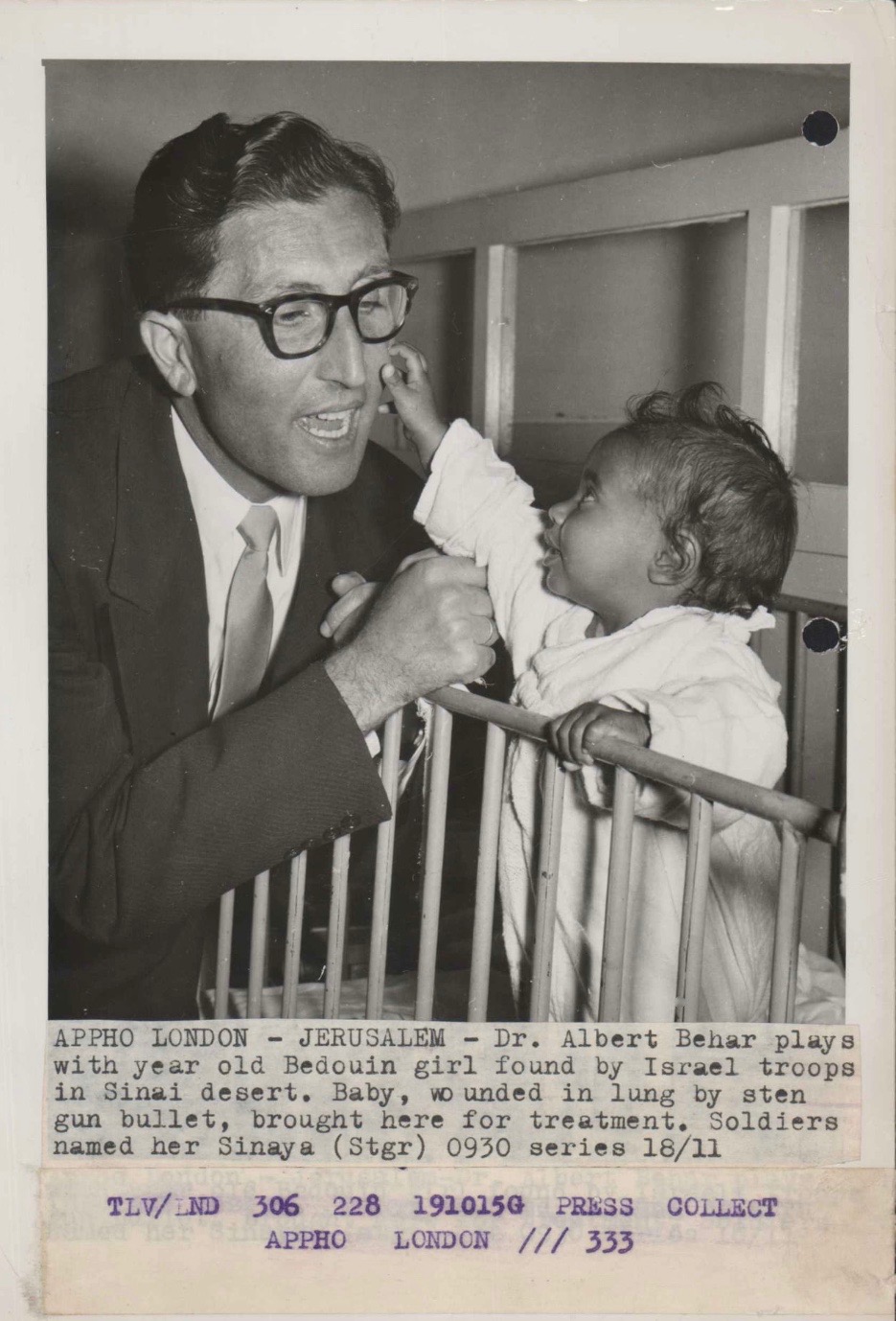
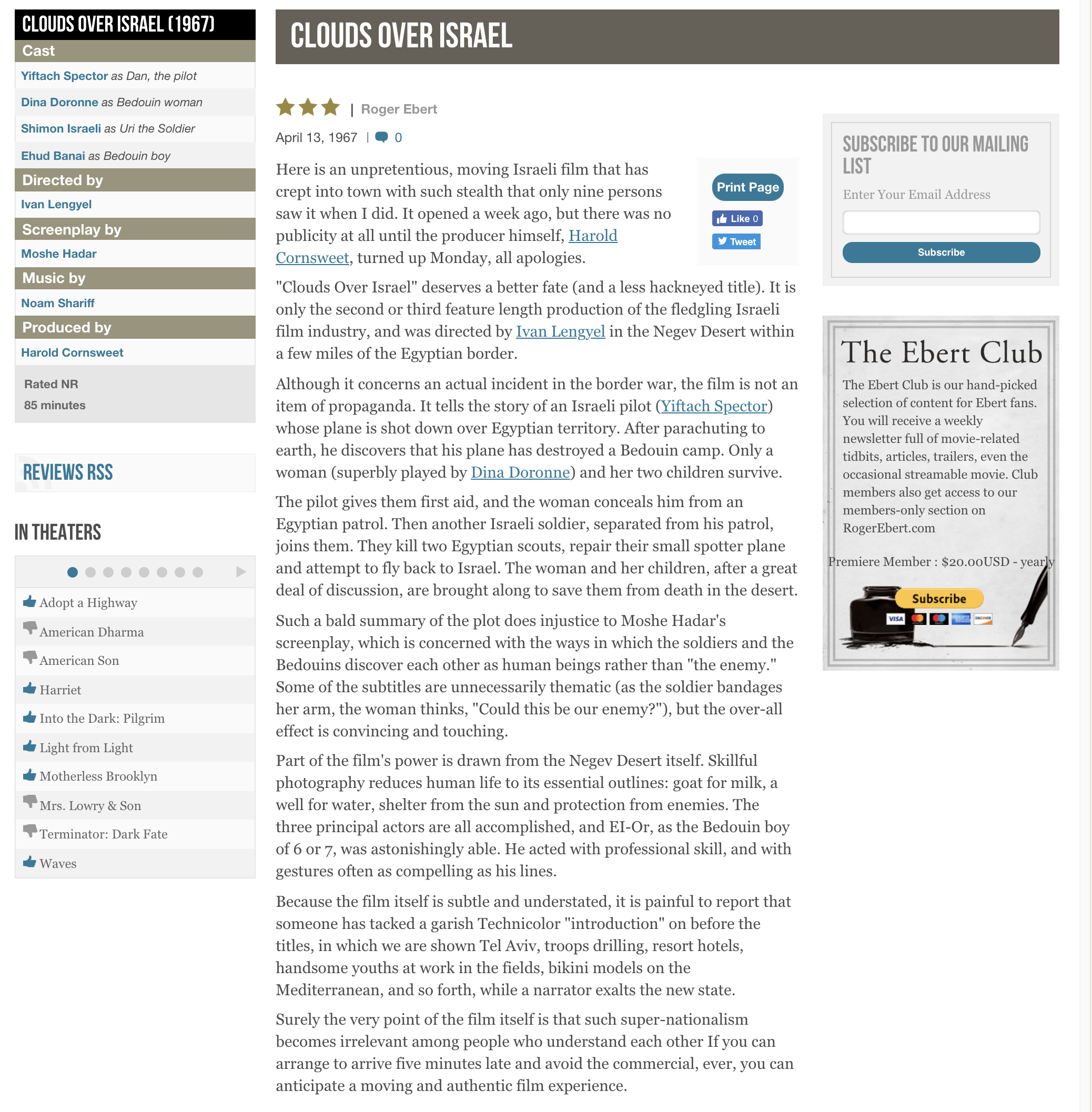
Clouds Over Israel
Film Critic, Roger Ebert, April 13, 1967
T.V. and Newspaper Reviews
1965-1966
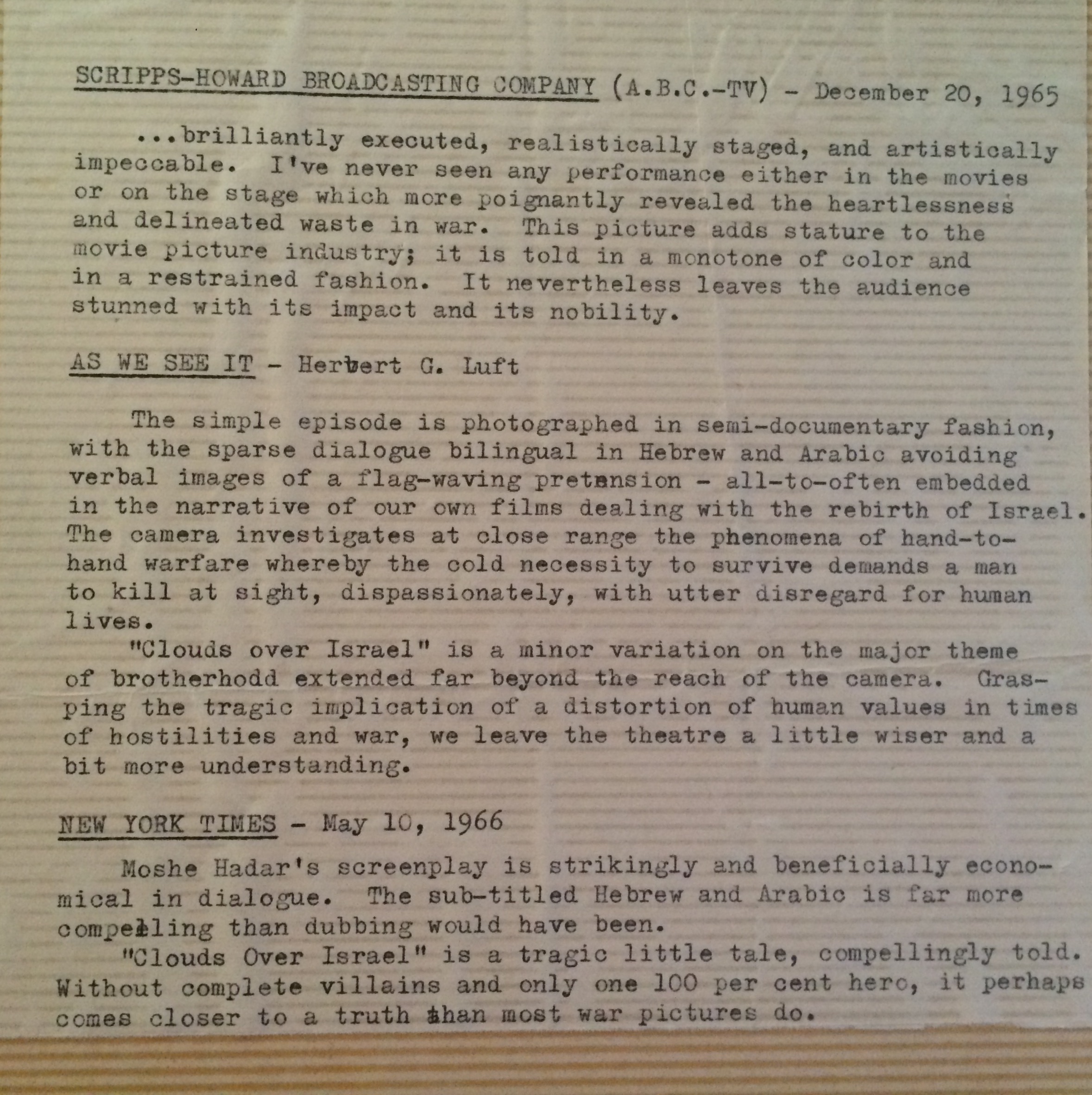
Once Upon the Movies, The Fifties Review - Sinaia, June 5, 2012
Above the Desert, sings Shimon Israeli
Didi Manusi, wrote the lyrics; Noam Sharif wrote the melody. Above the Desert, had sung itself into the hearts of the Israeli citizens
Sinaia Brochure - English and Hebrew
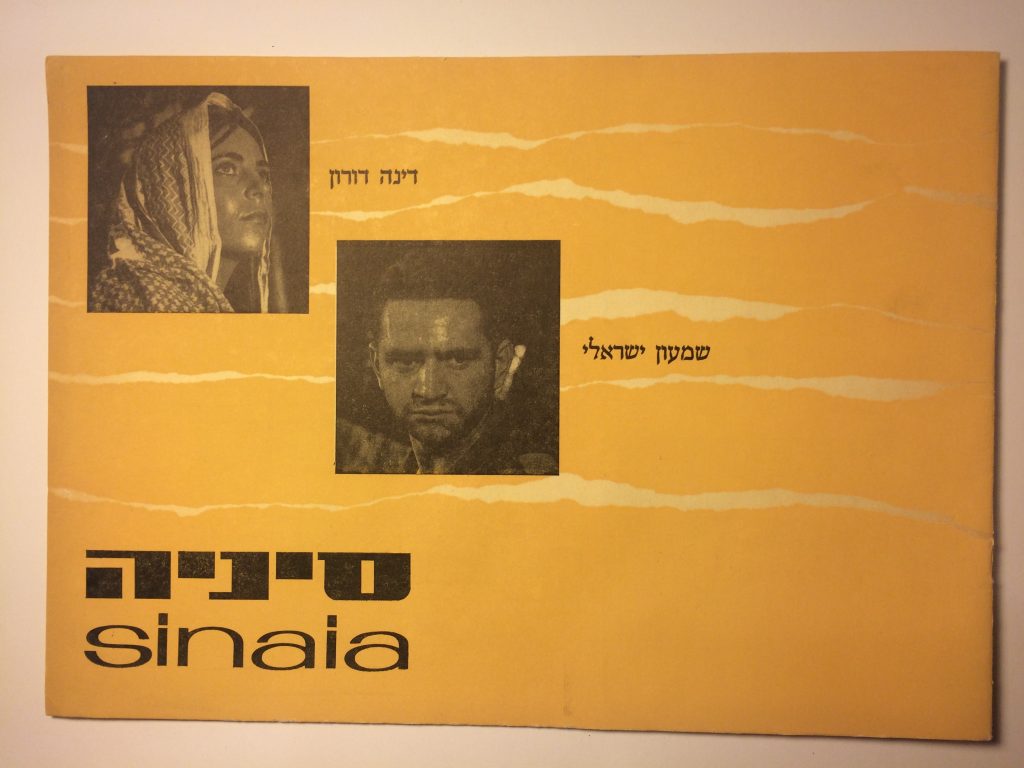
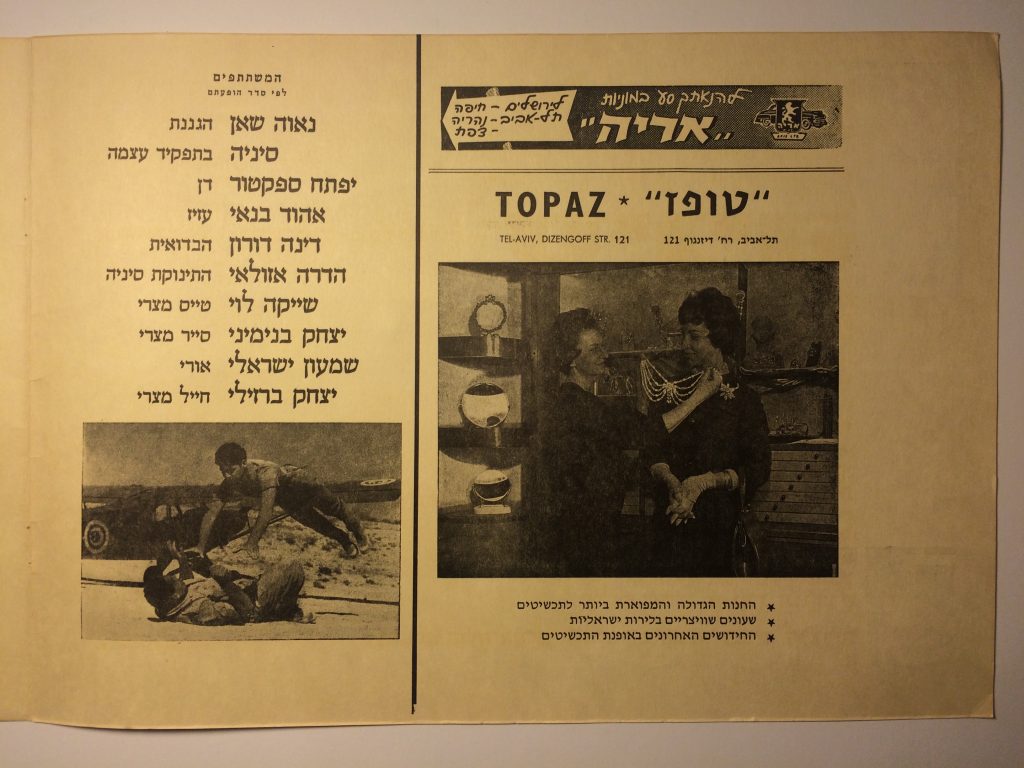
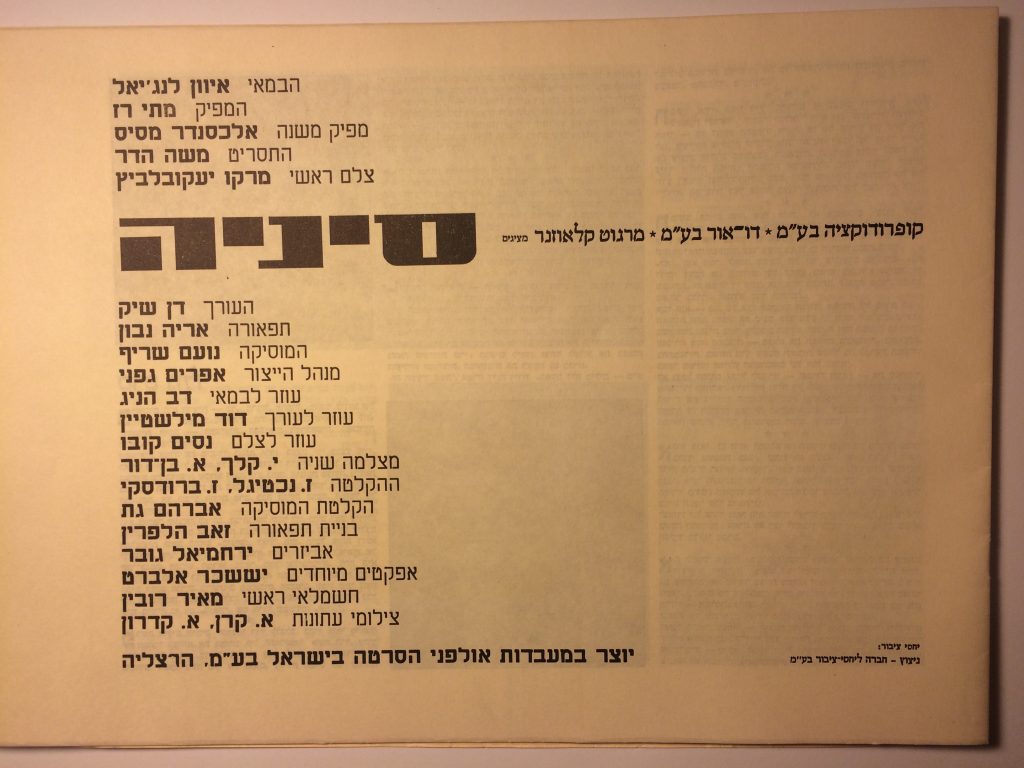
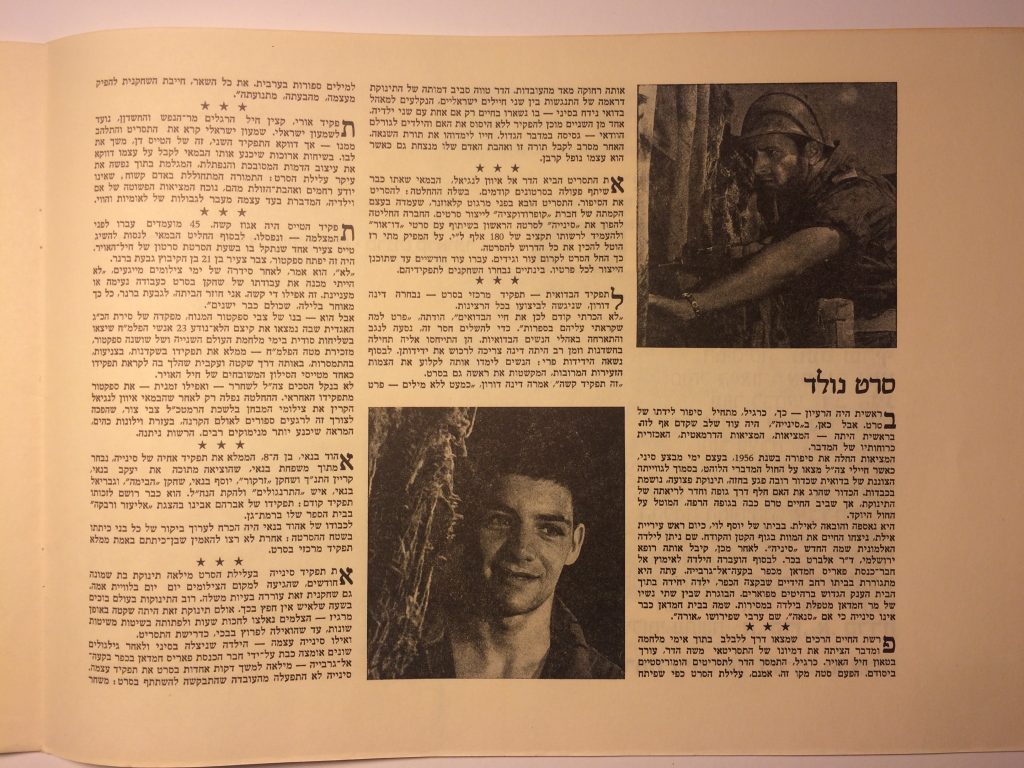
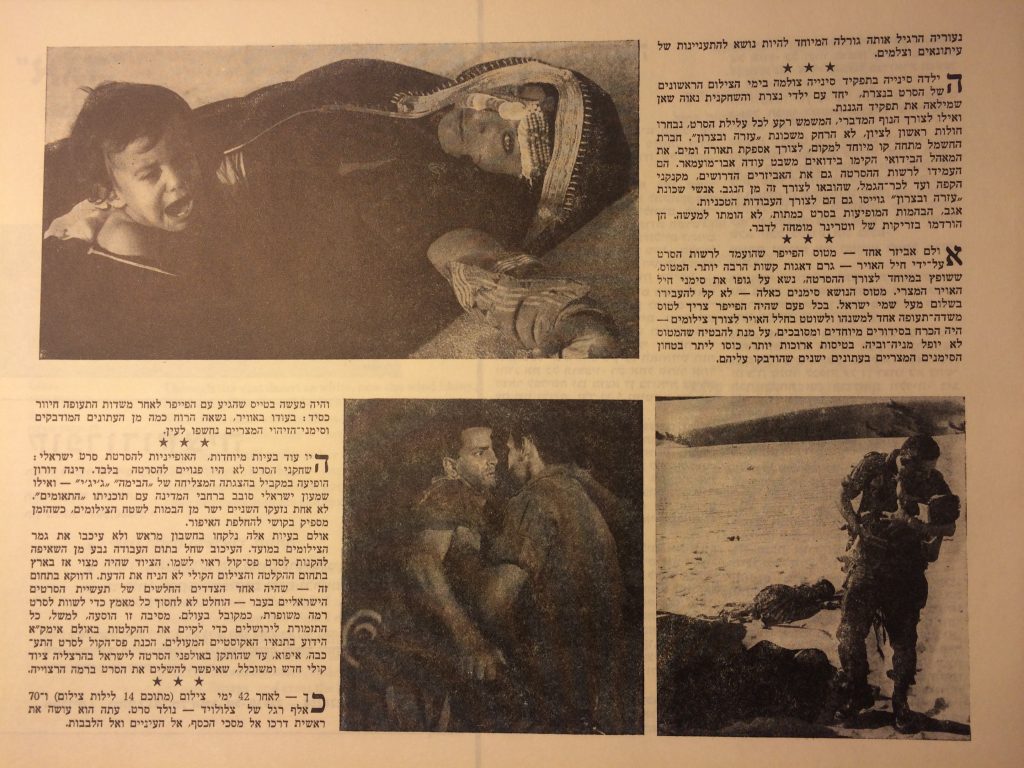
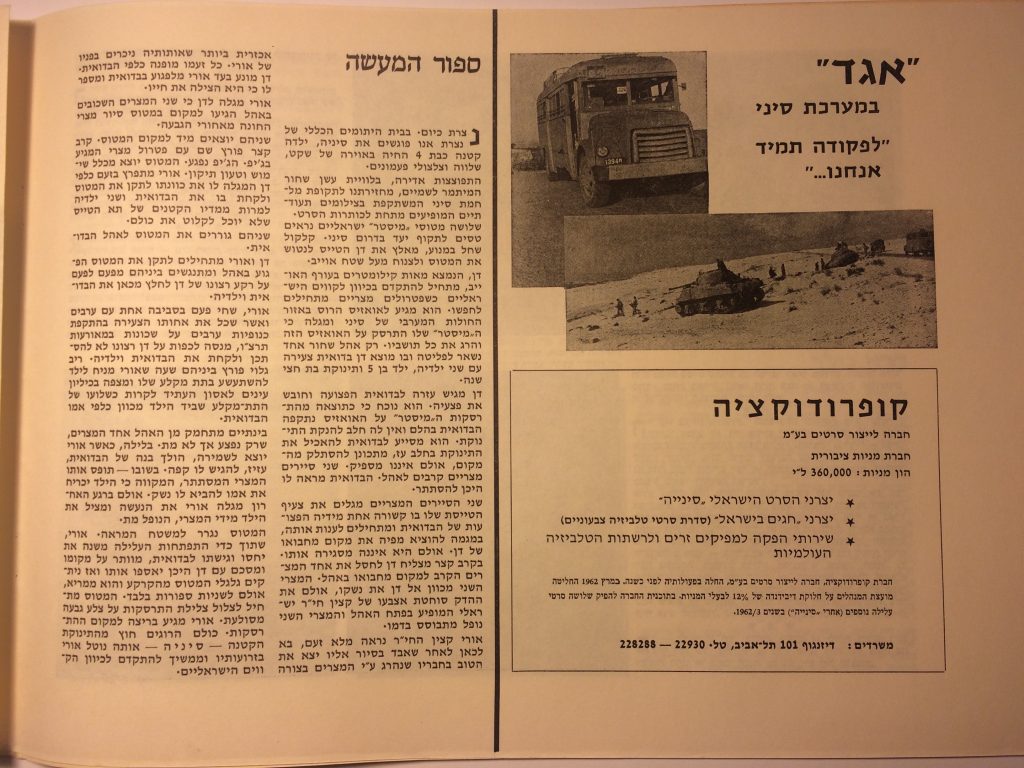
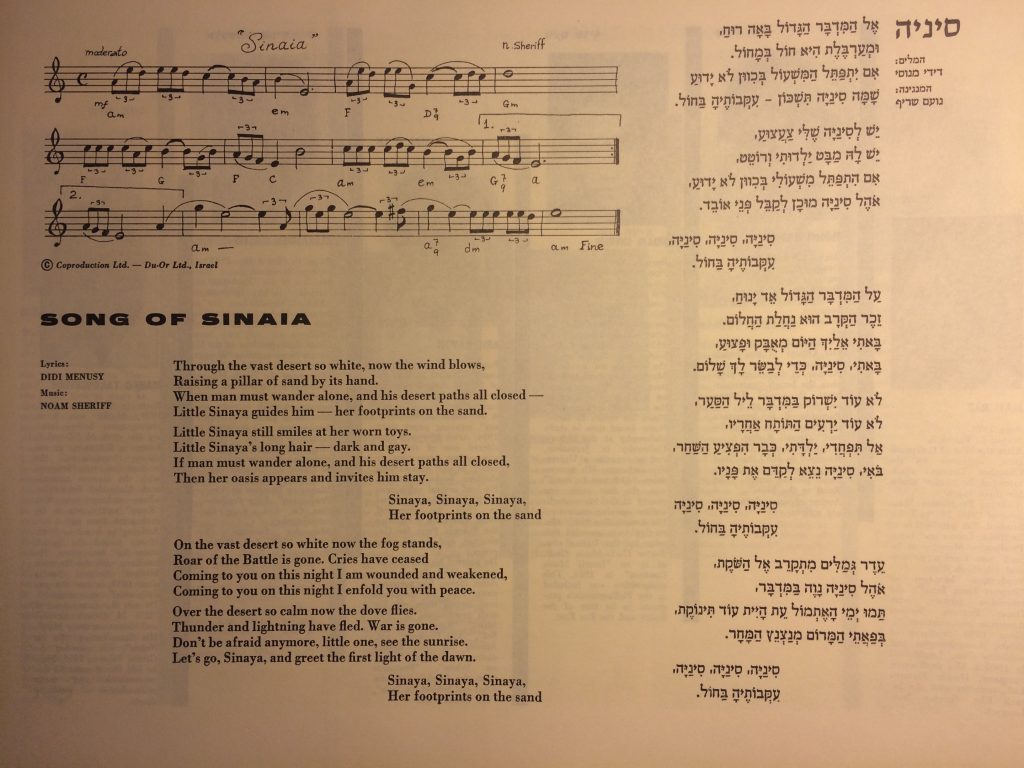
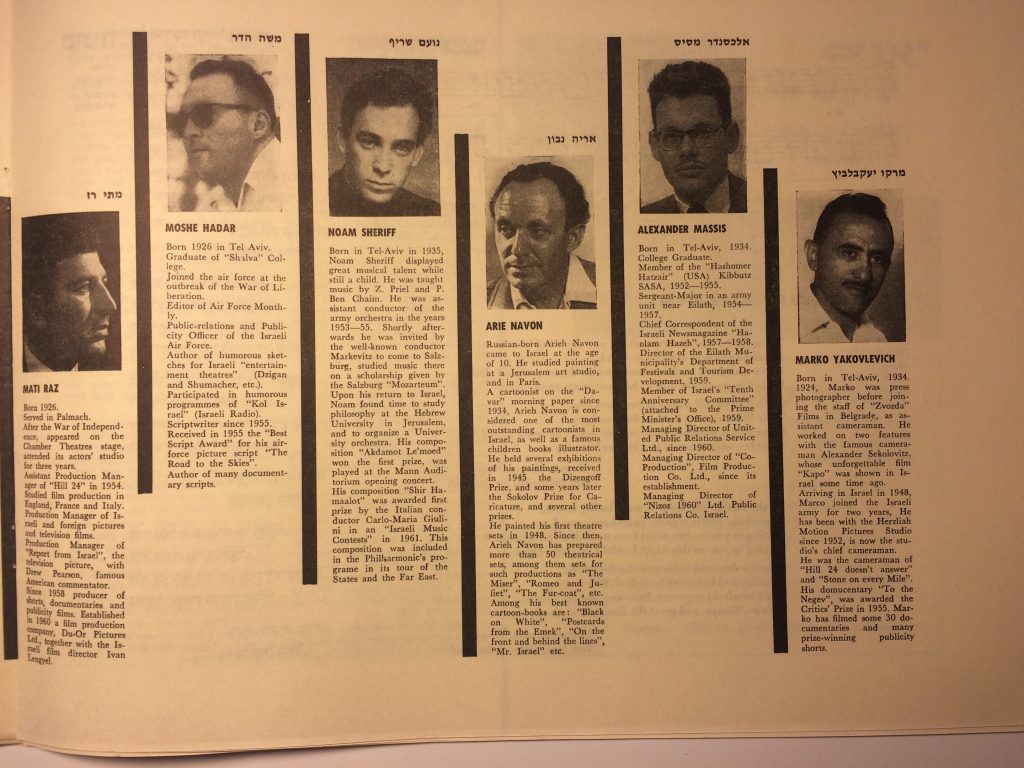
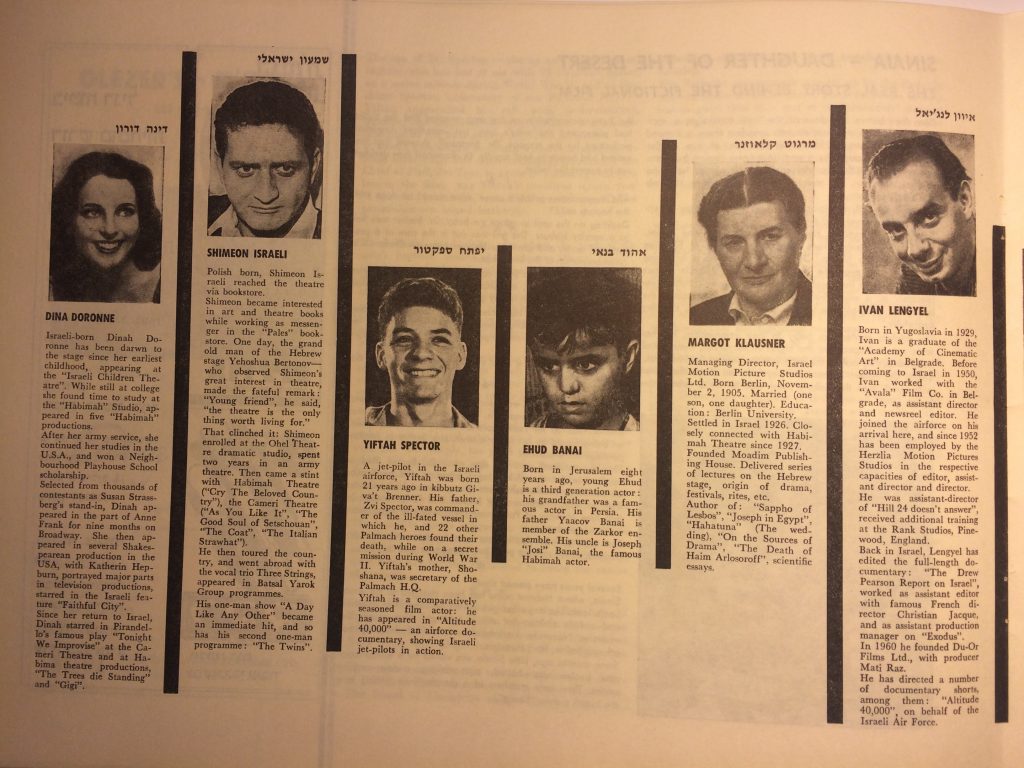
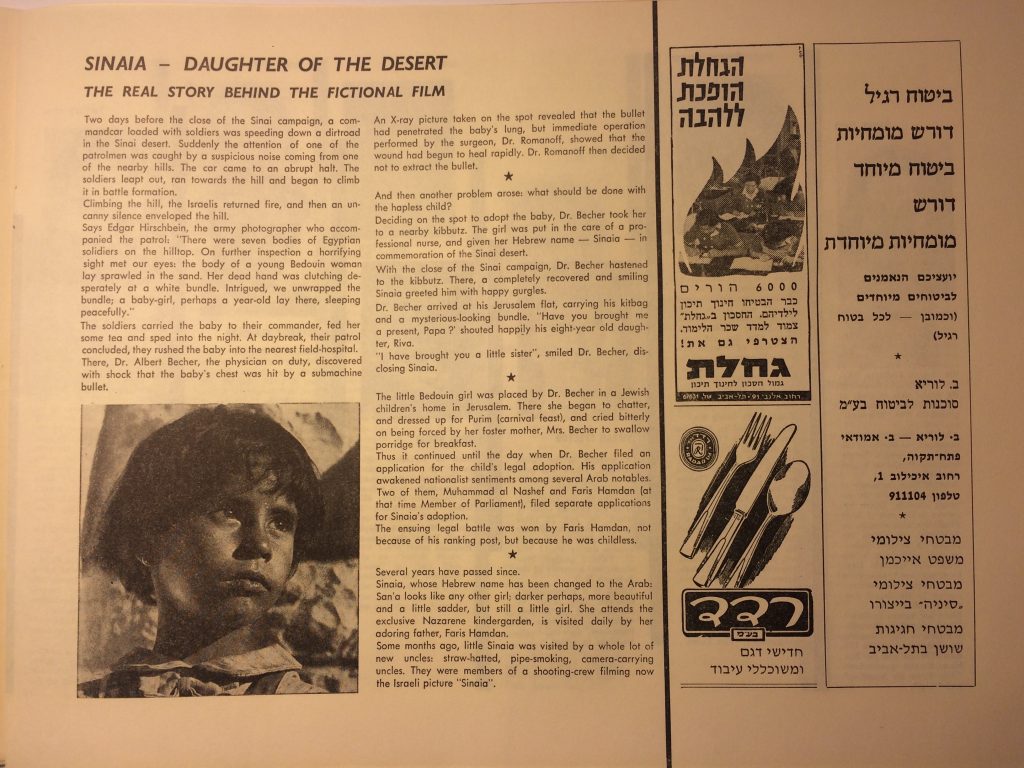
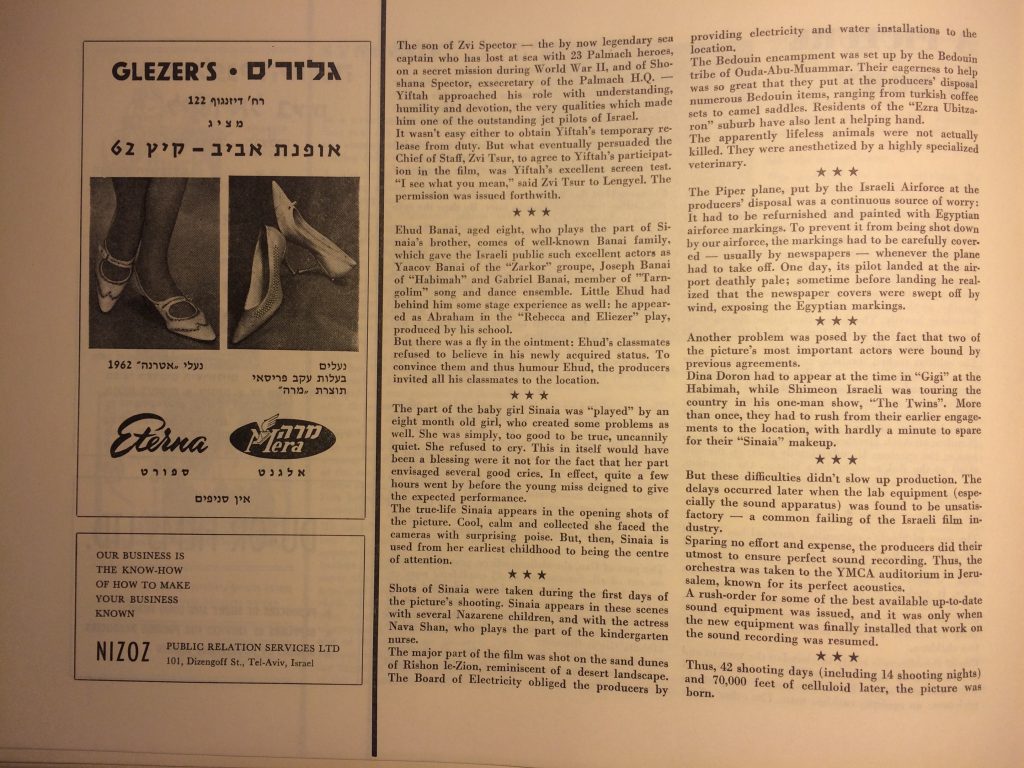
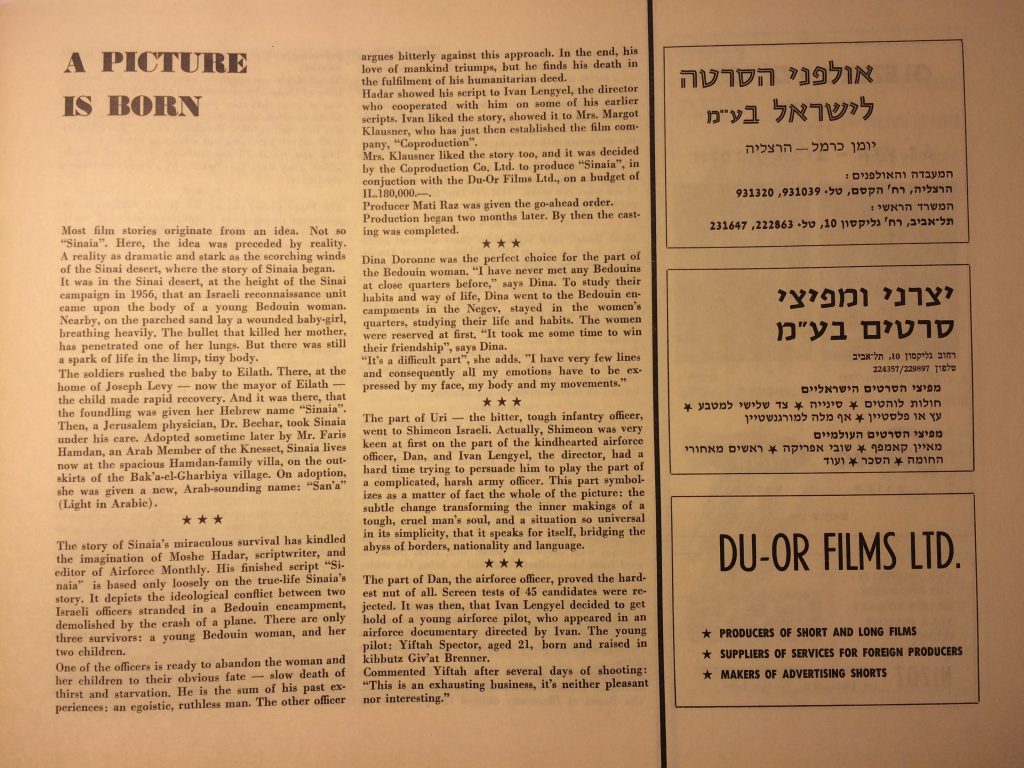
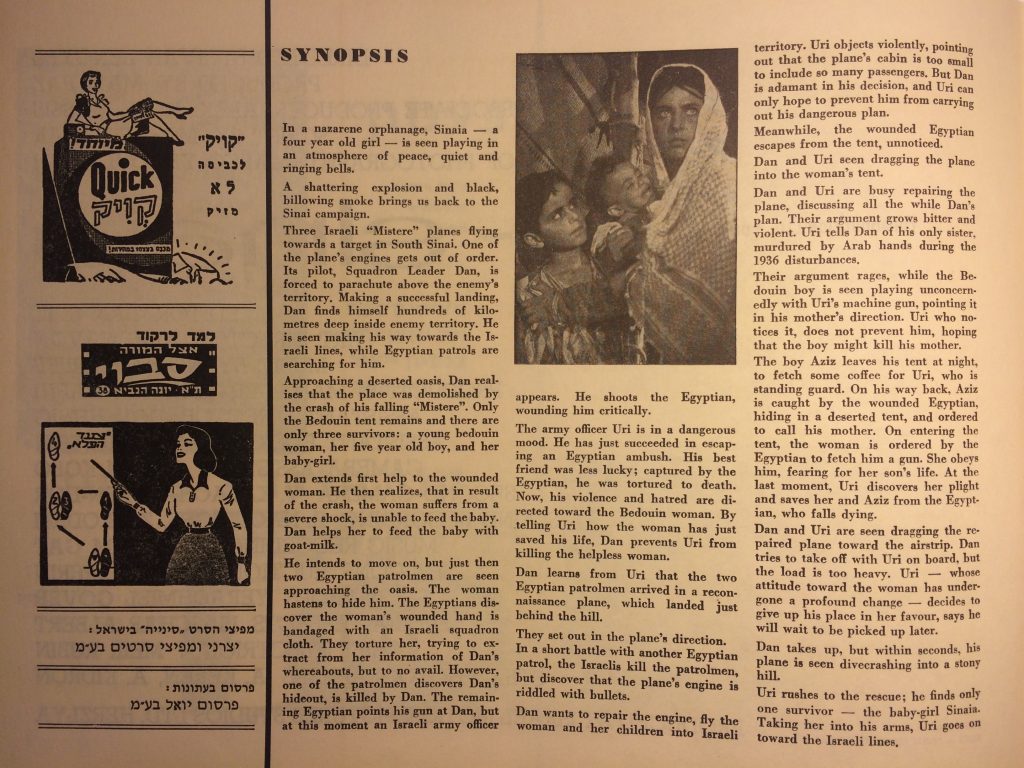
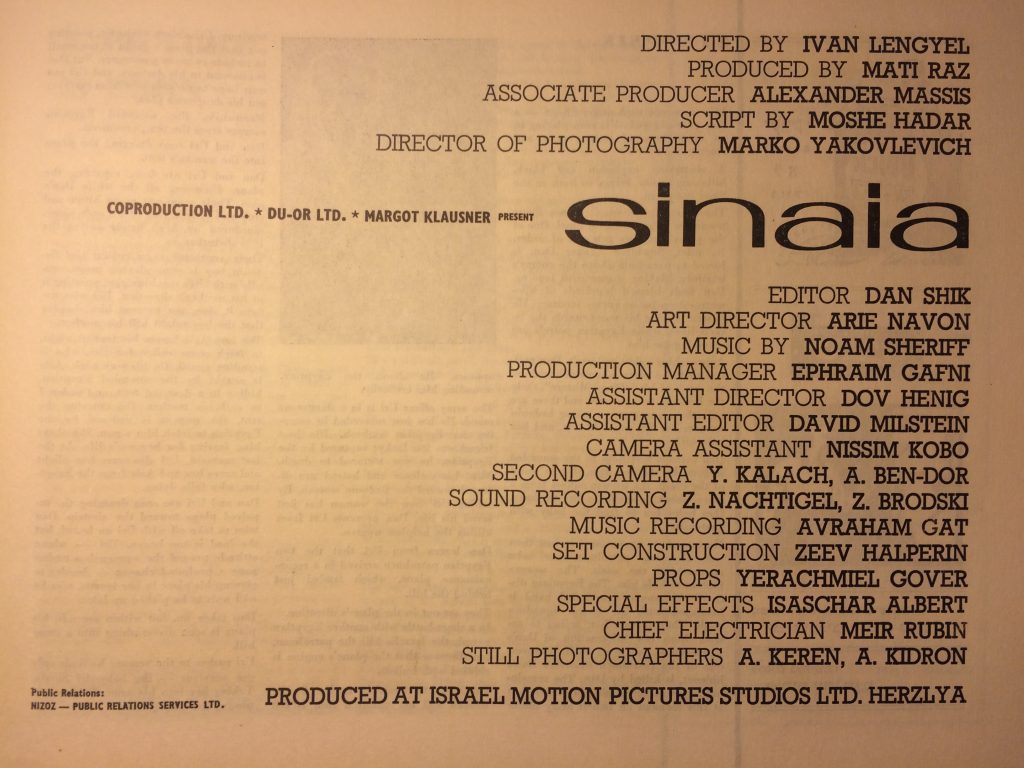
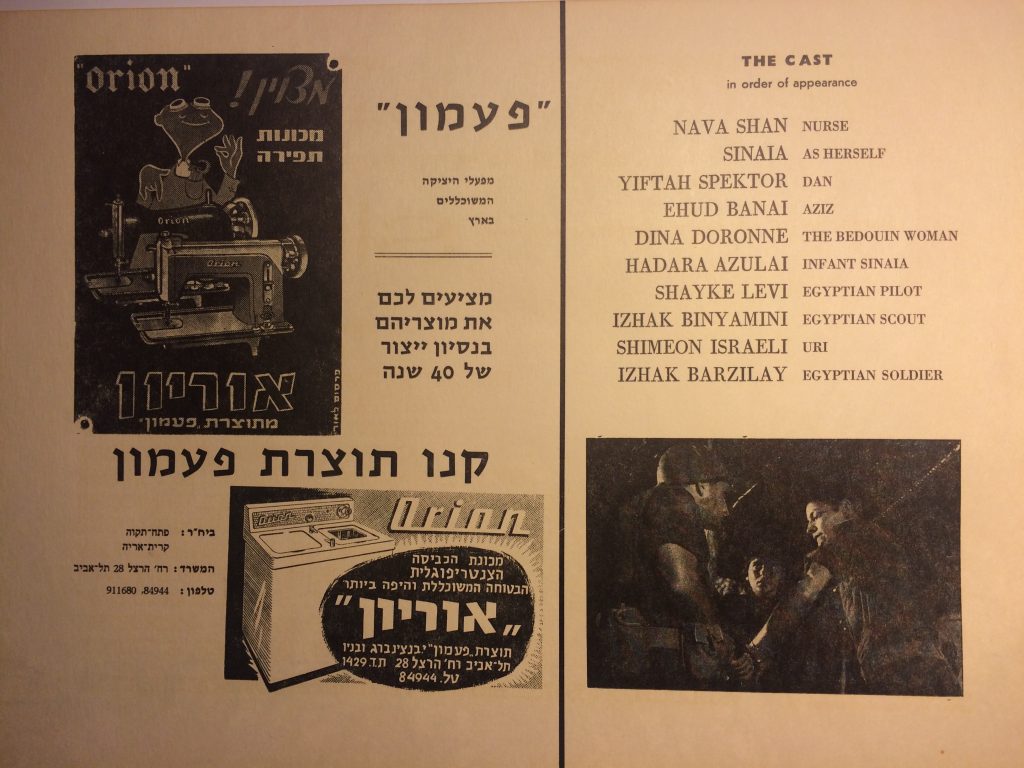
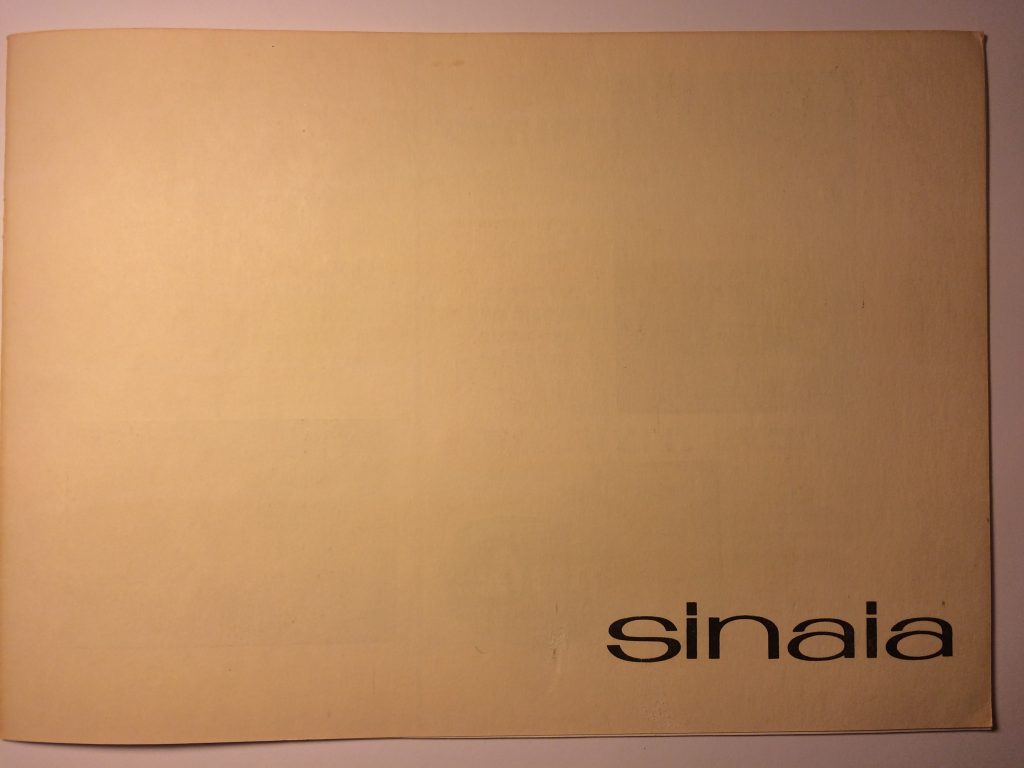
Newspaper Clippings
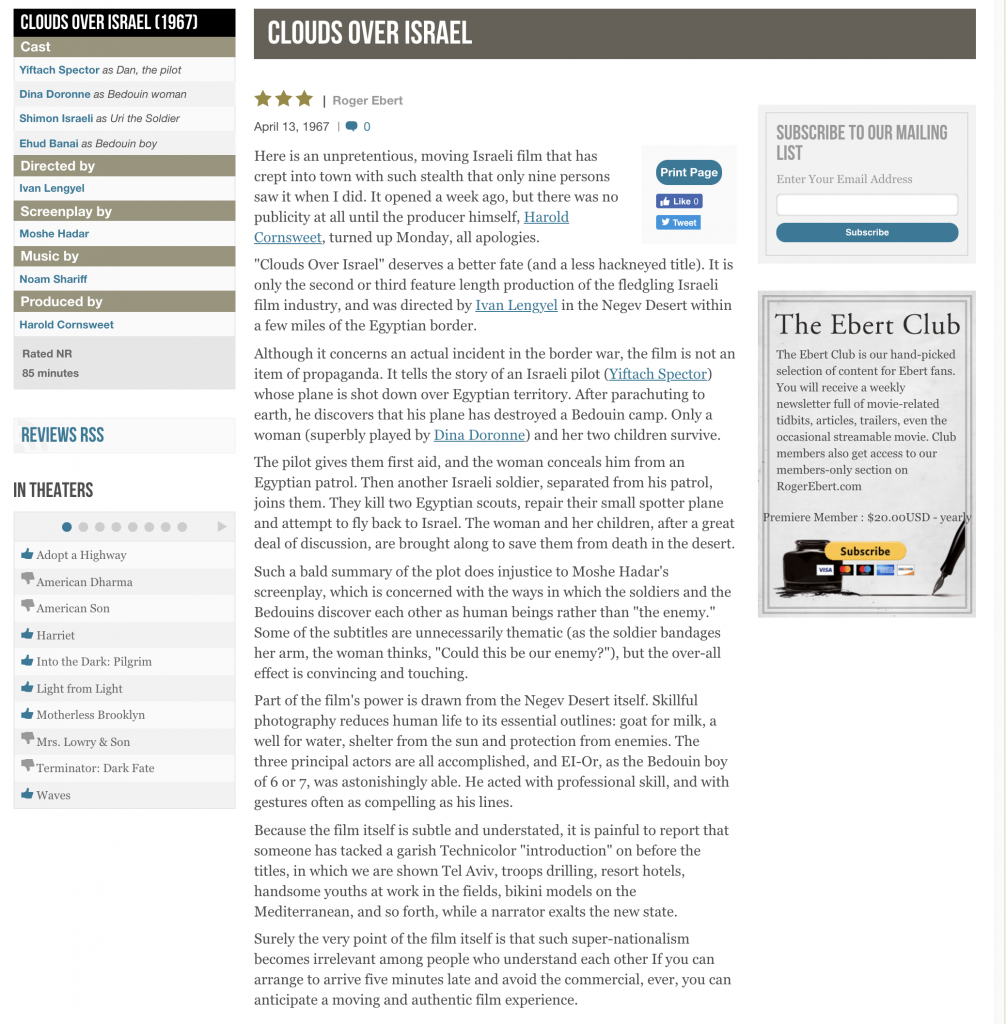
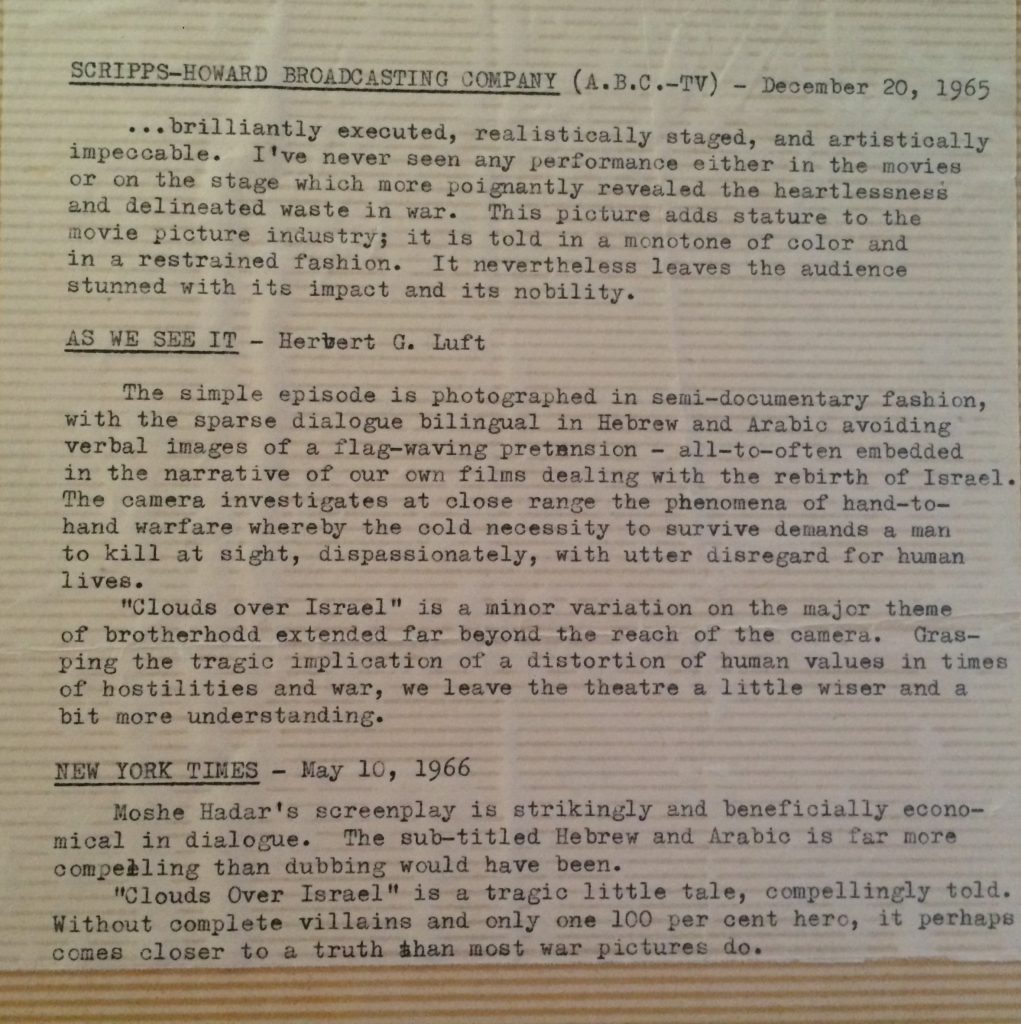
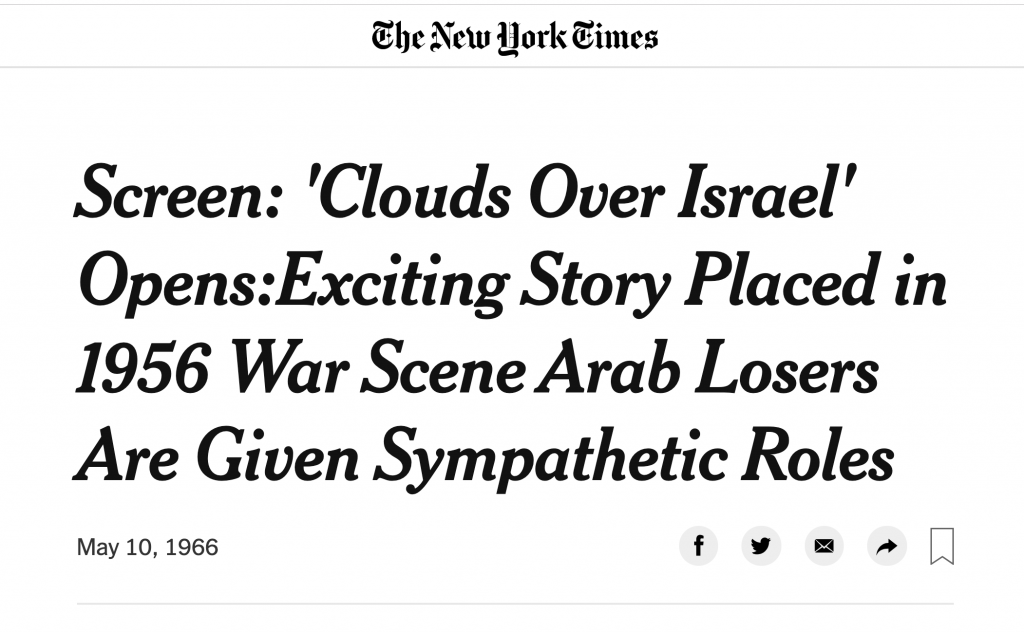
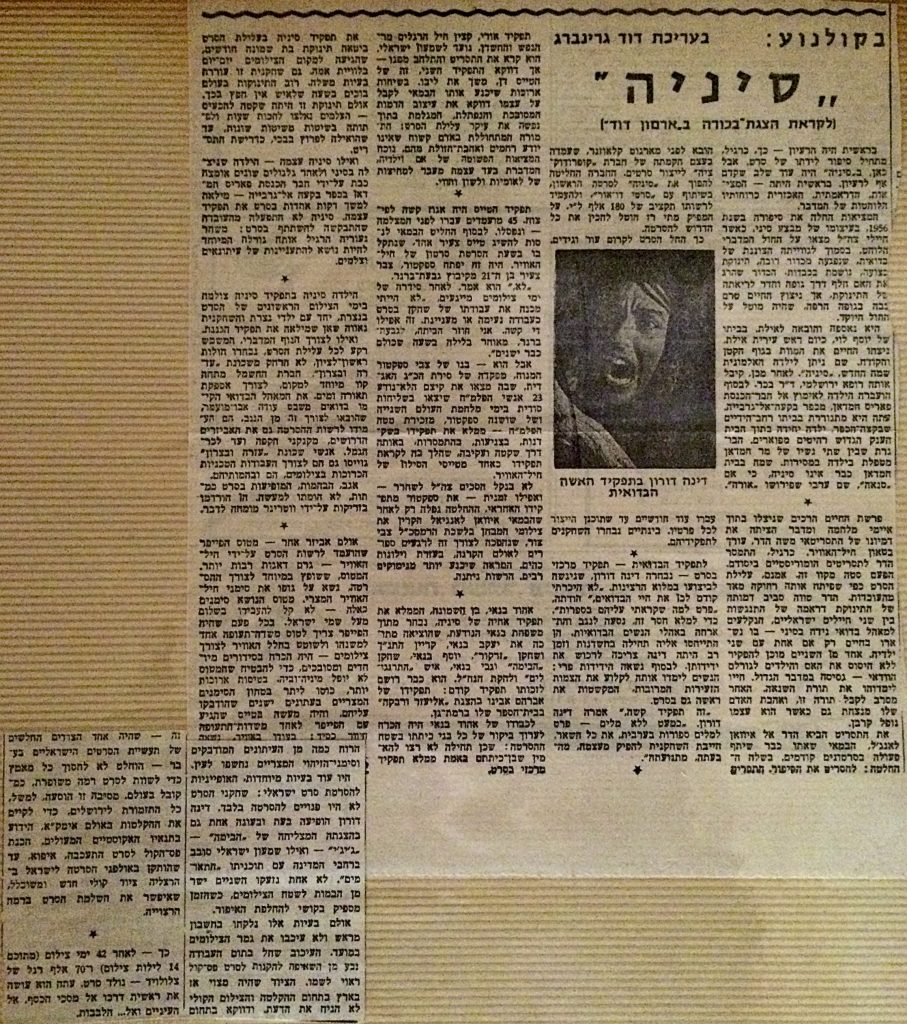
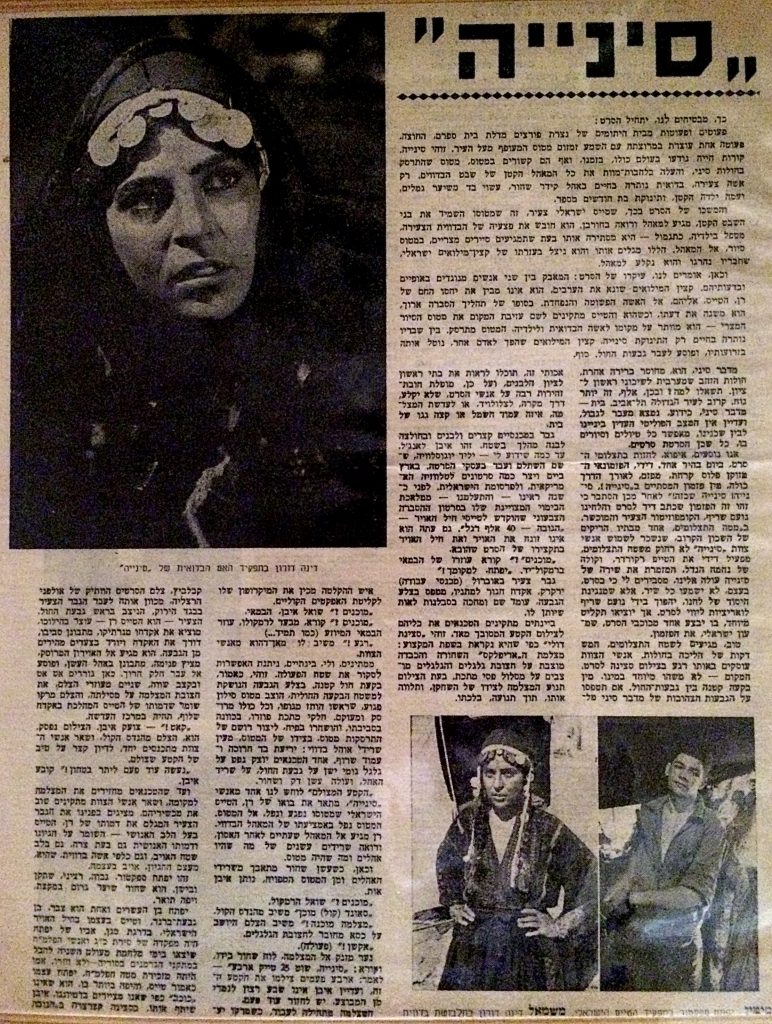
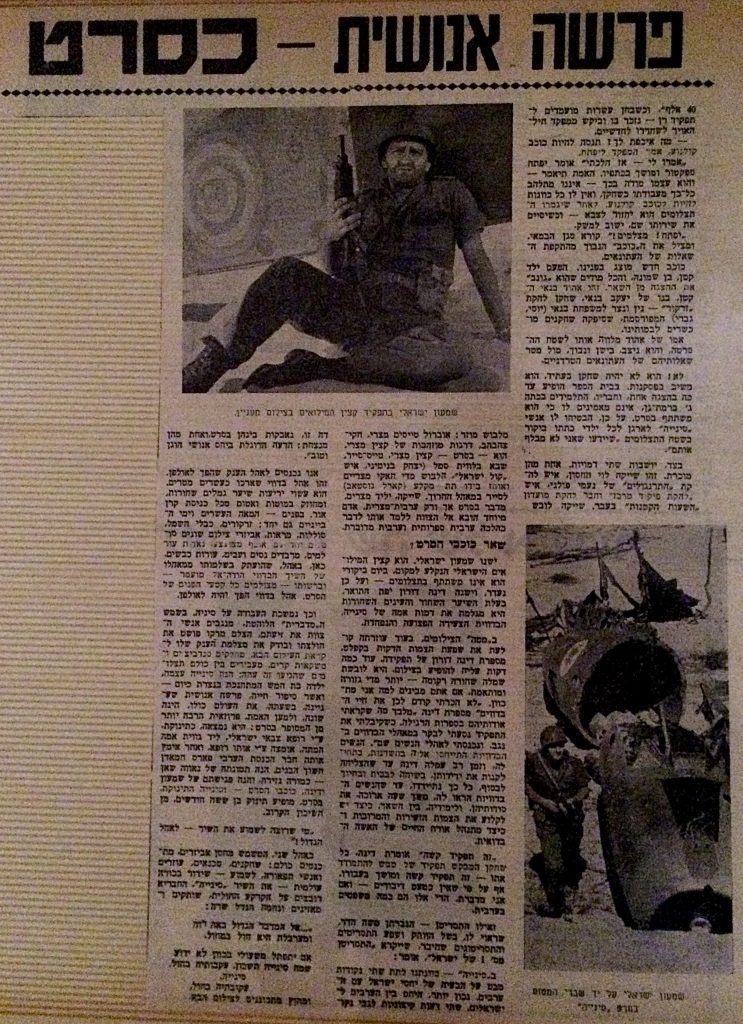
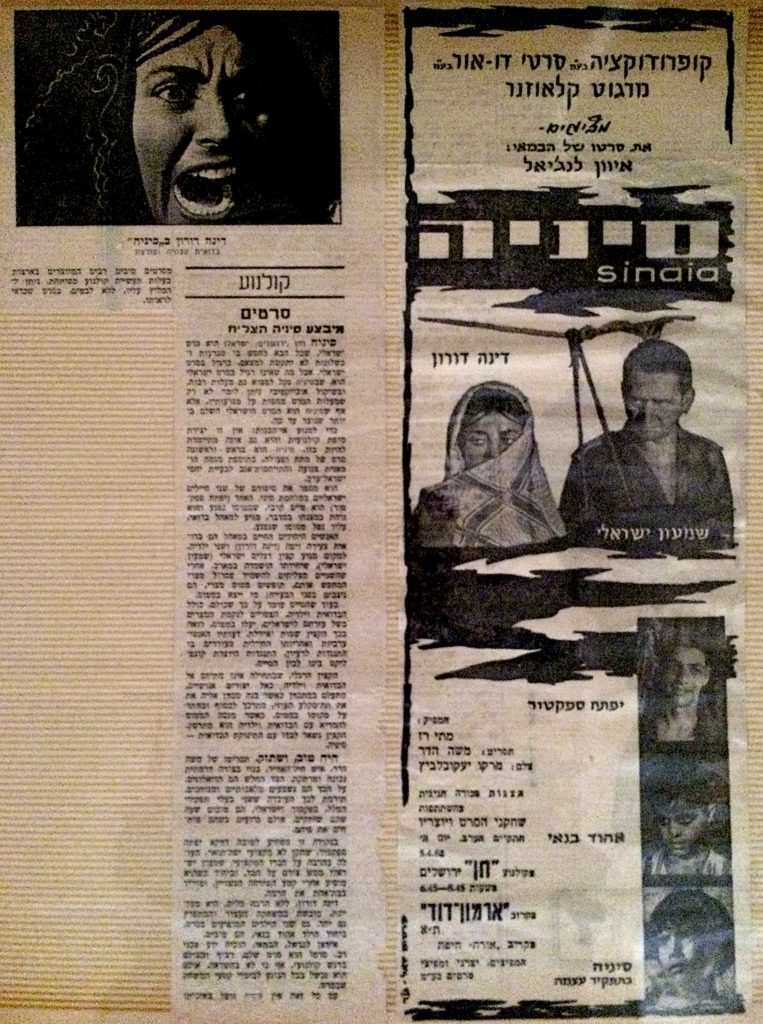
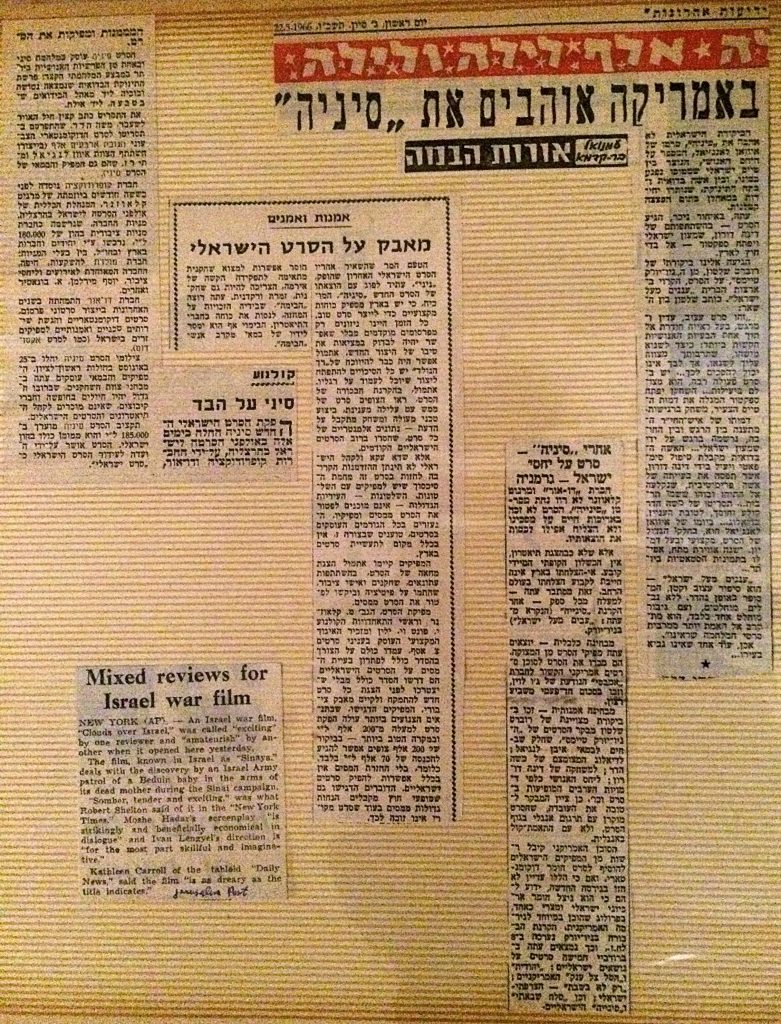
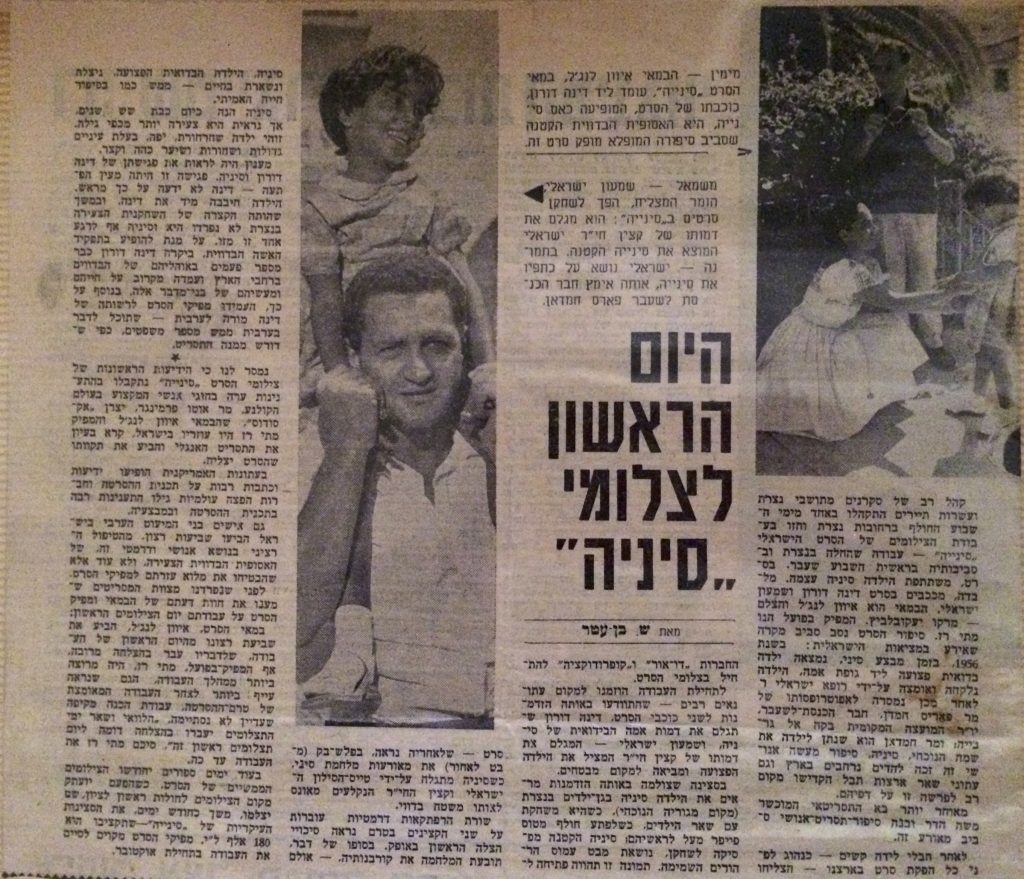
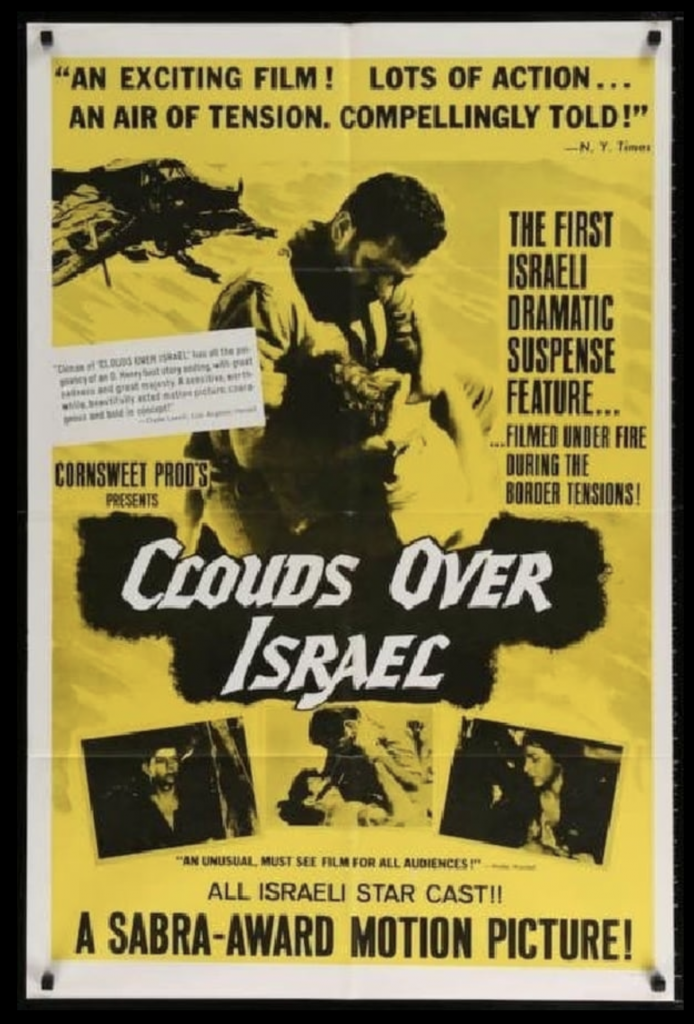
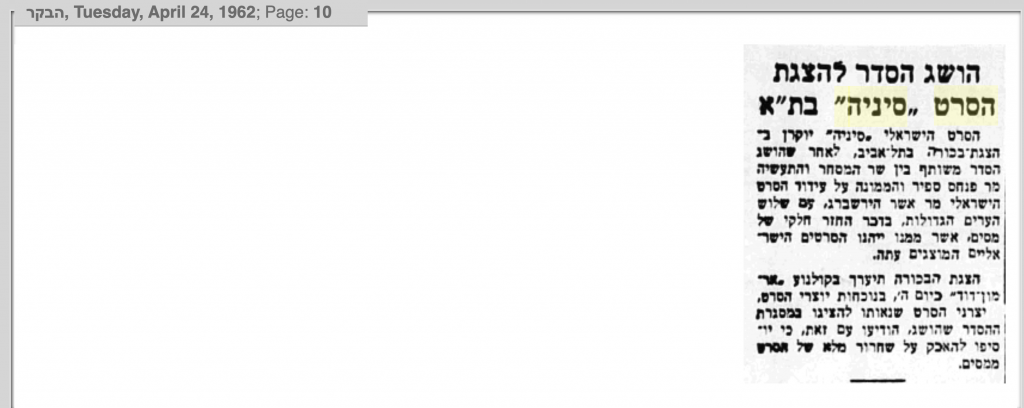
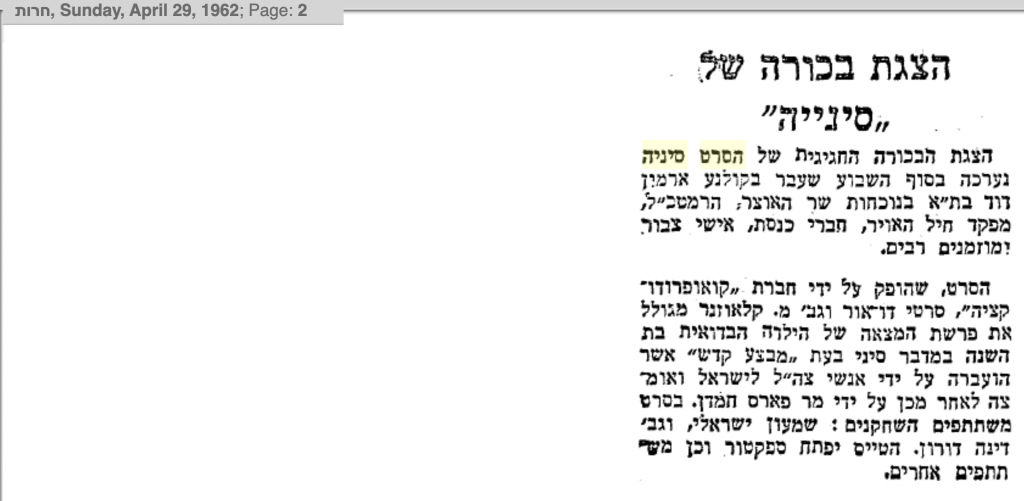
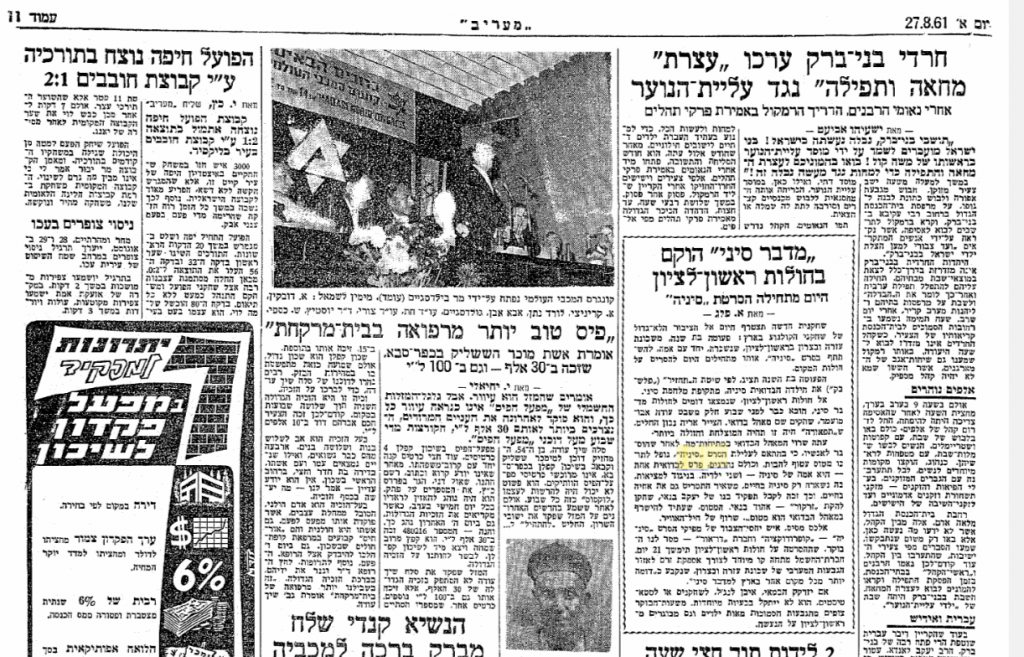

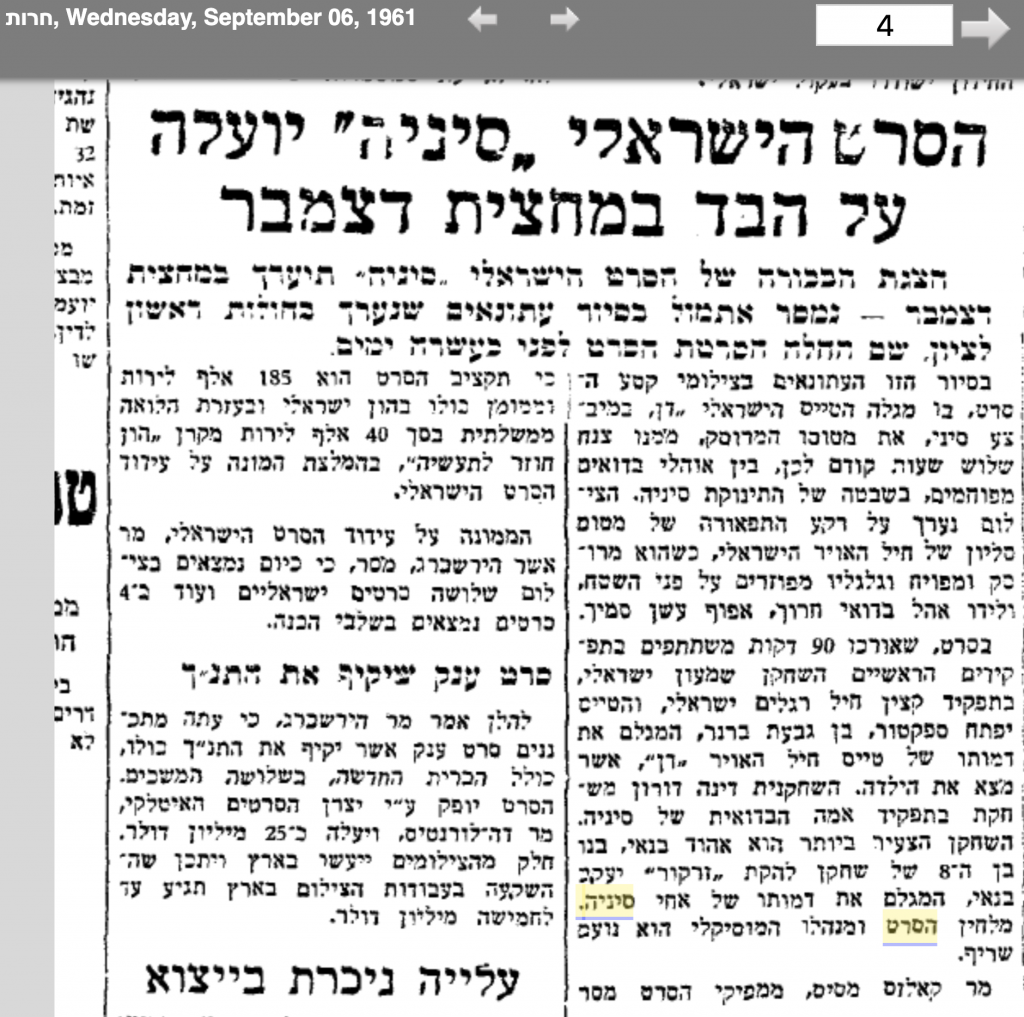
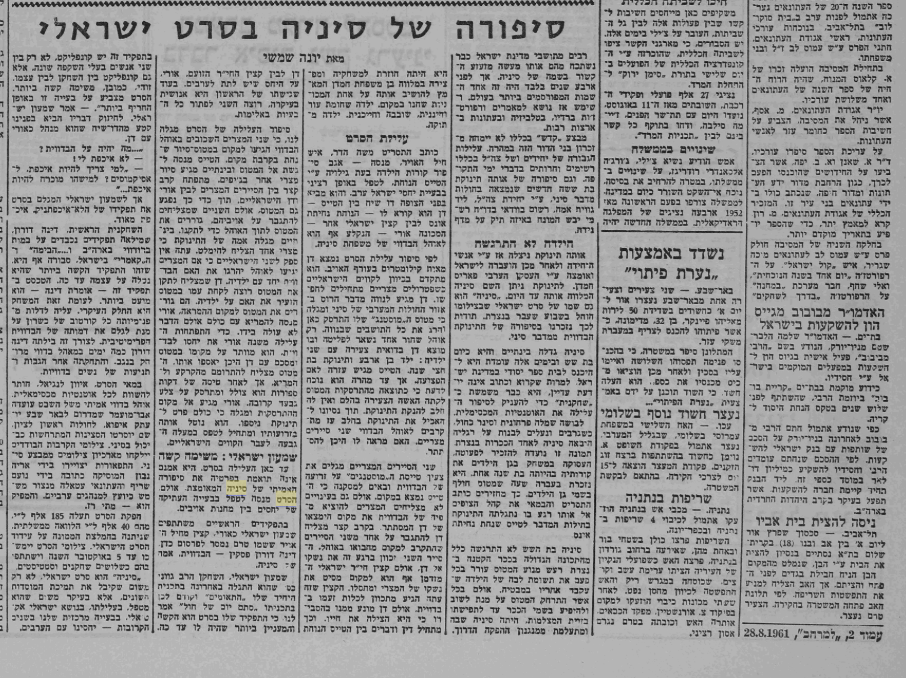
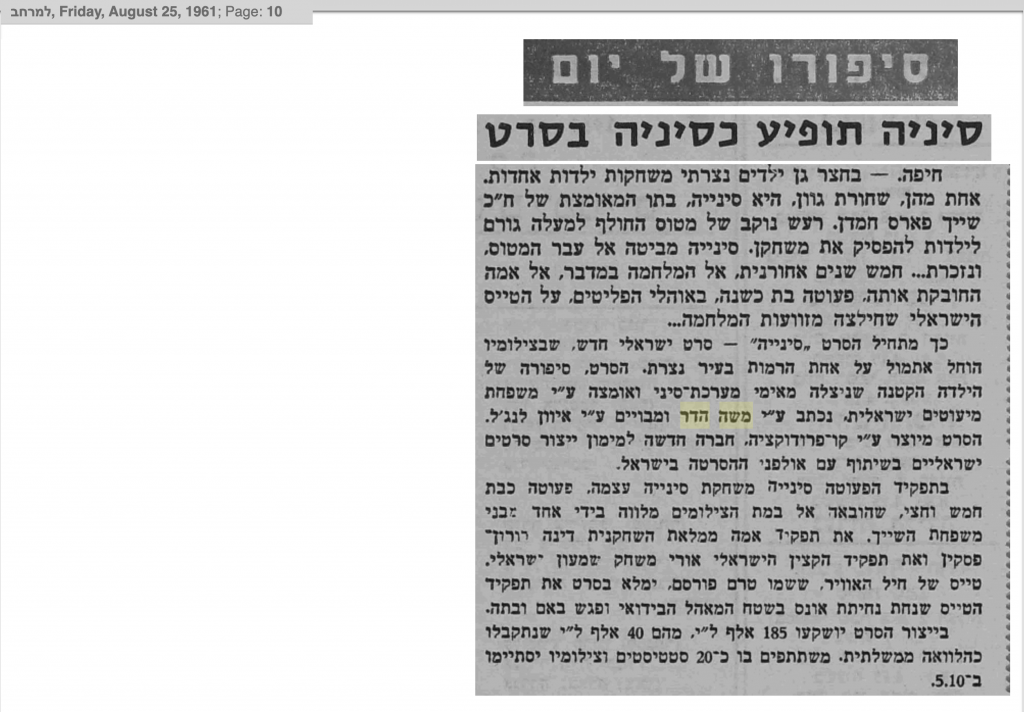
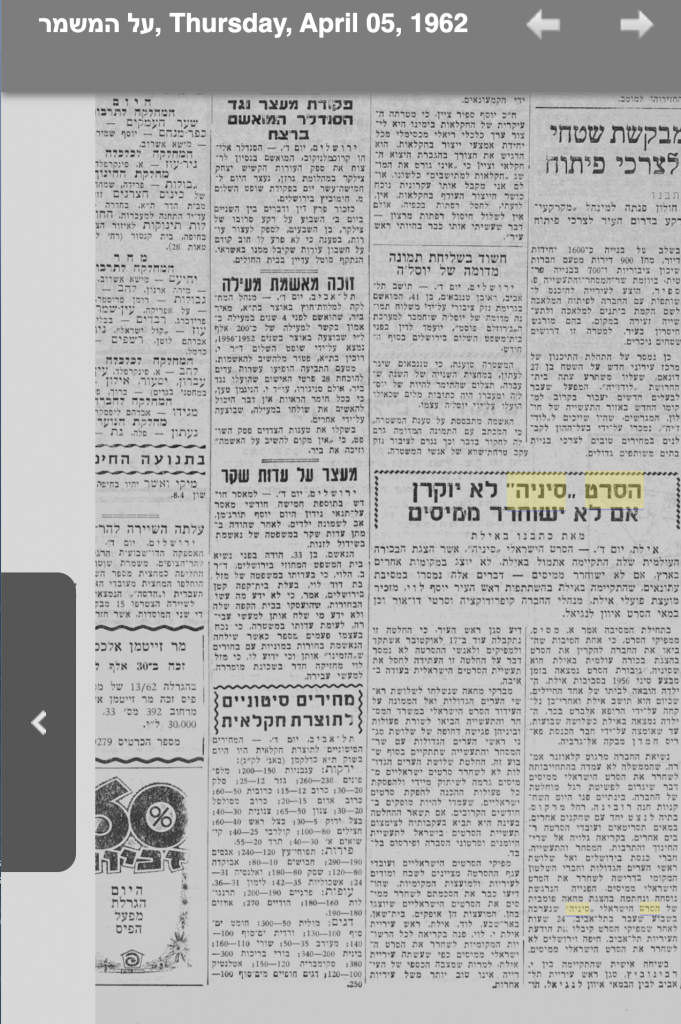
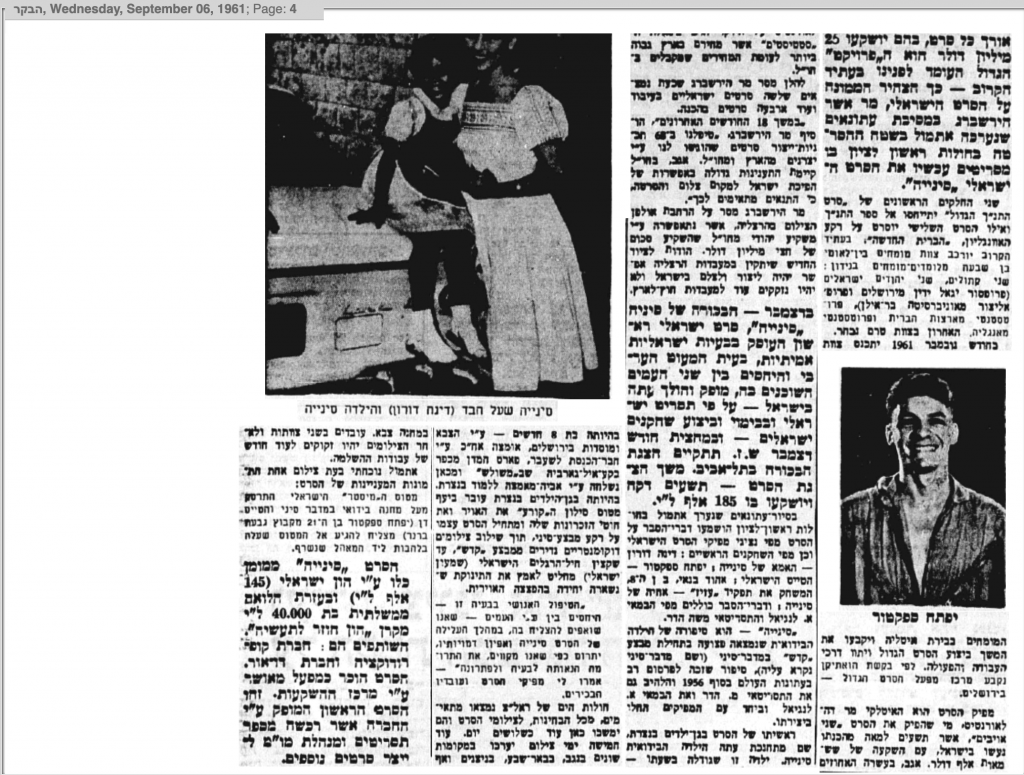
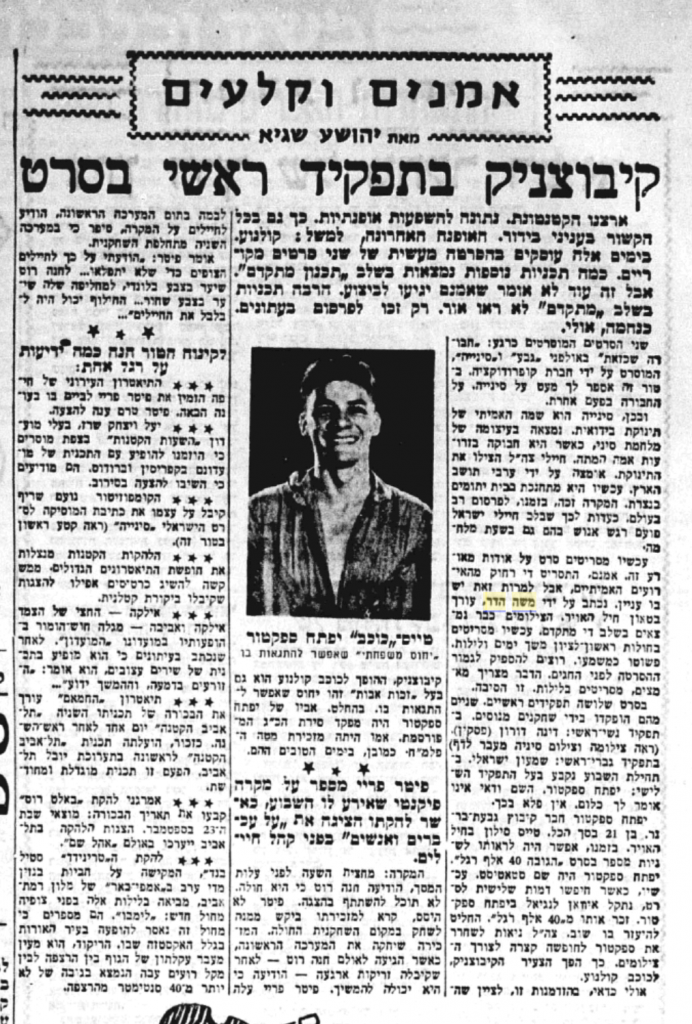
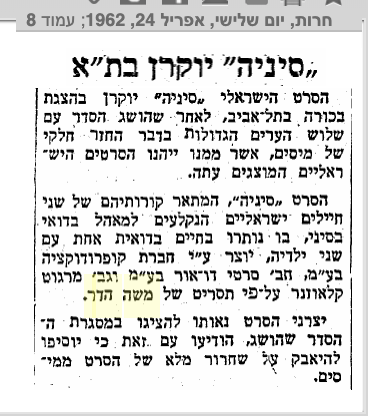
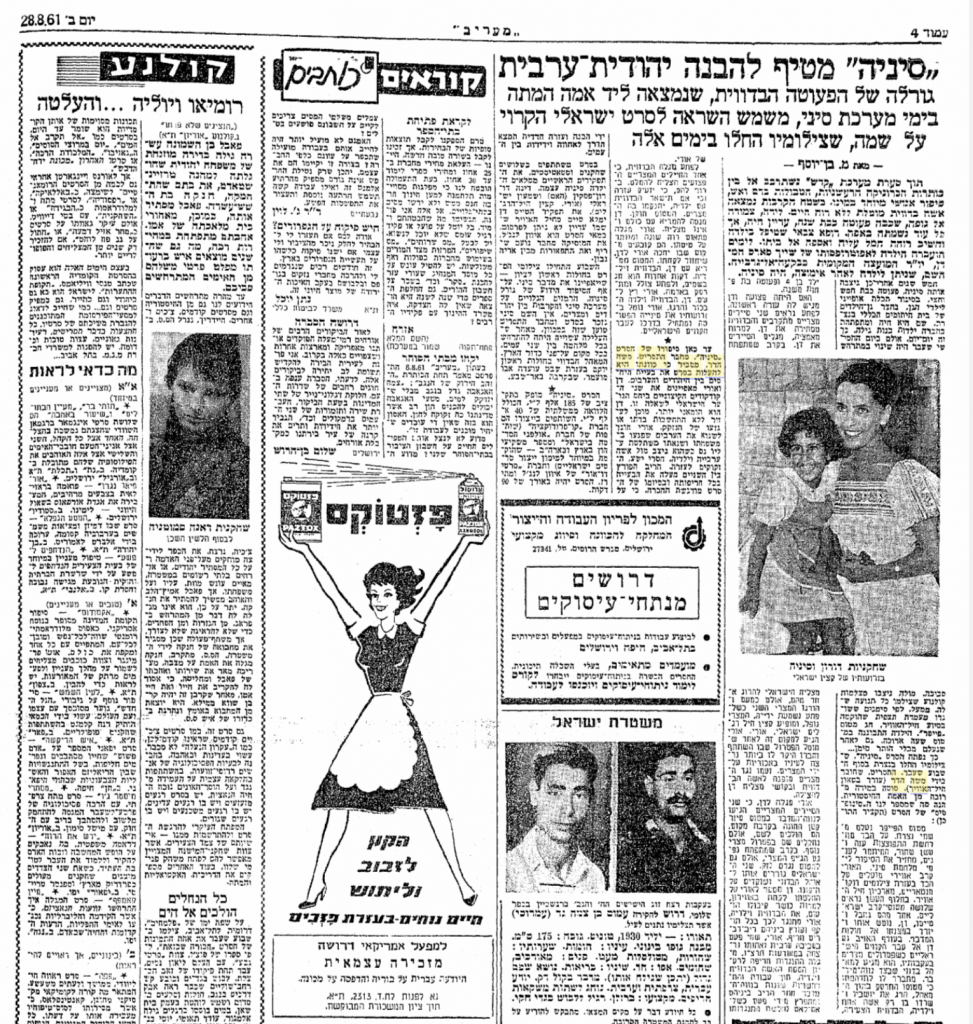
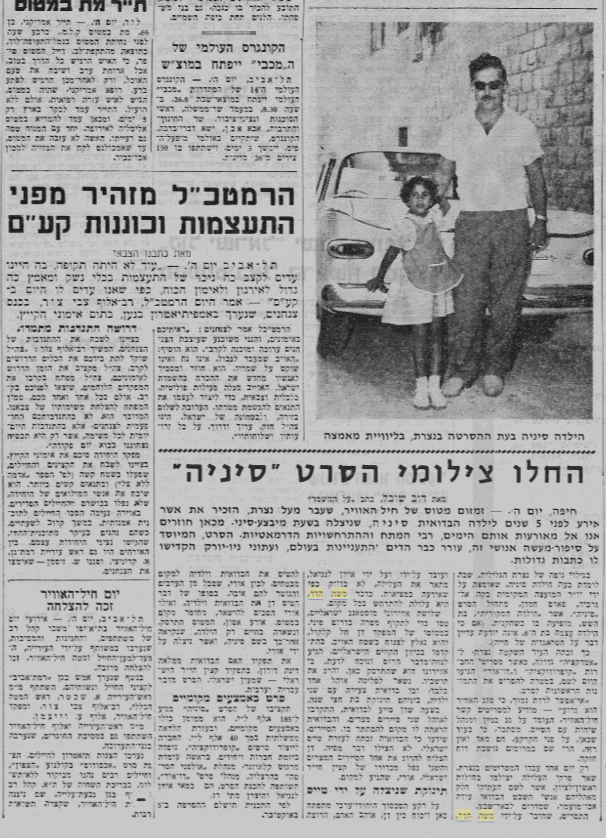
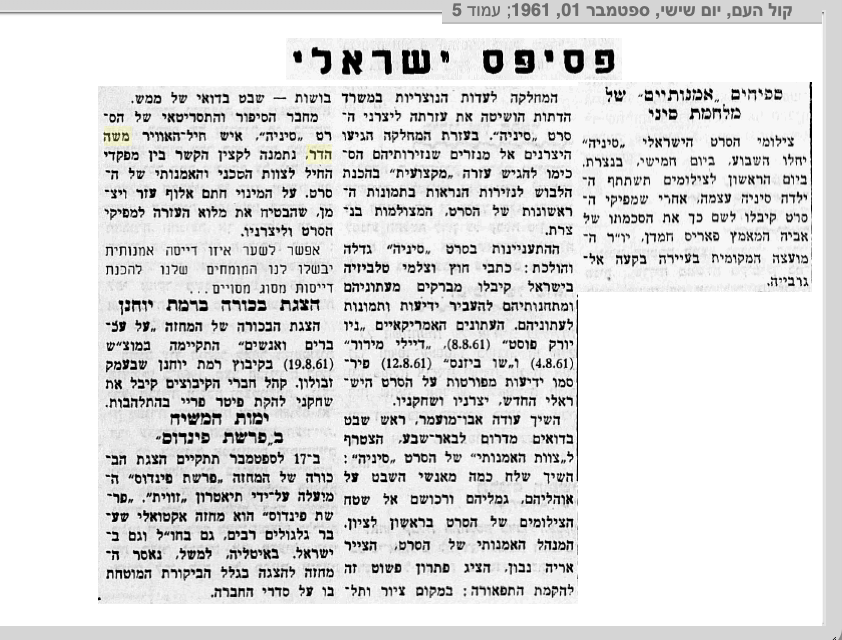
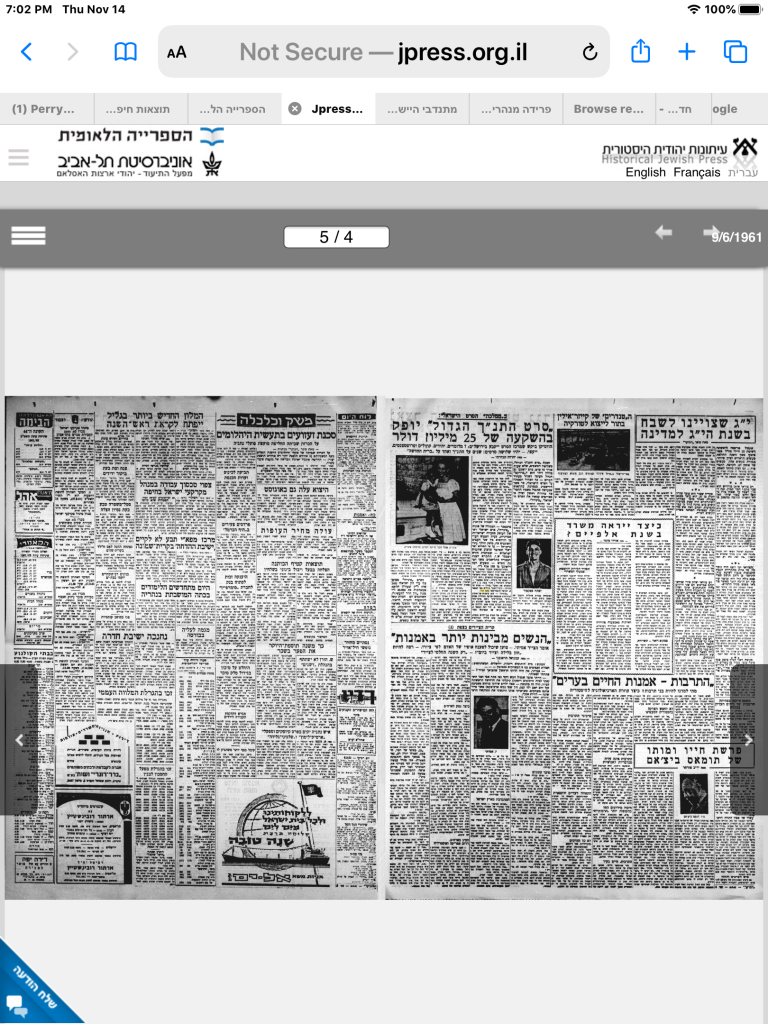
Sinaia turned 60 - Documentary - The first ever meeting with the soldier who saved her
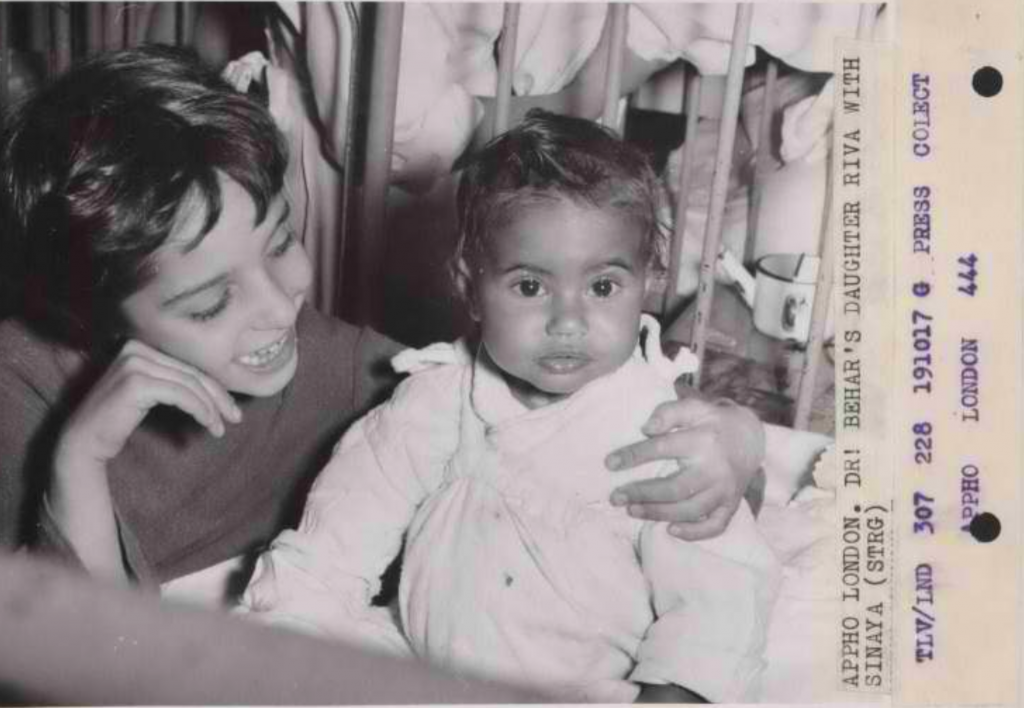
Riva, Dr. Bachar's daughter with Sinaia. Courtesy of Israel State Archives, November 1956
Only One Lira - 1963
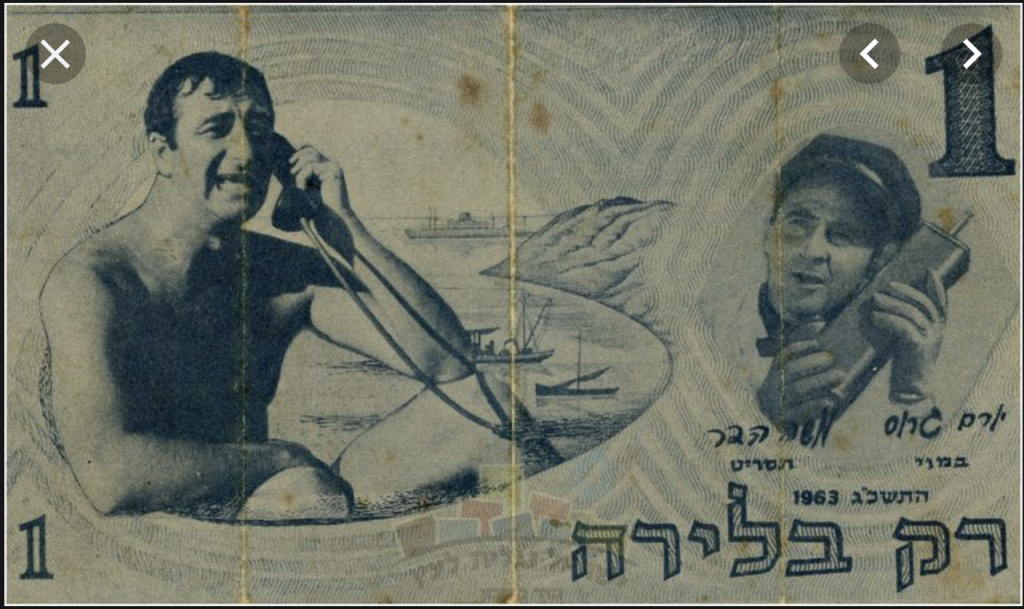
Screenplay: Moshe Hadar
Director: Yoram Gross
Cast: Gideon Singer, Jacob Ben-Sira, Michael Gore, Avraham Argman, Rachel Attias, Shoshana Ravid, Shraga Friedman, Bracha Neeman, Shmuel Rodansky
Length: 81 minutes
“The first slapstick movie in Israel’s history. This first comedy wrote Yaacov Gross, (2015) set the tone to all the future satiric Israeli films of the 1960s.״
The plot: Two street vendors, Gidi and Jaco, homeless hobos, roaming the city of Tel Aviv, selling all kinds of things "Okazion – only in one Lira!". Among the items are dolls of ministers such as Ben-Gurion in Lira and Eshkol in Lira. A plastic head of Brigitte Bardot is offered for two Liras.
The pair of hobos make their "home" on a public park bench and use the municipal garbage truck, as their private transportation. They own a tiny poodle and live a carefree life. Their dream is to be freeloaders. Their carefree peaceful lives come to an end when the bench on which they sleep falls apart. In their search for a suitable roof, the duo connects with a real estate broker named Shmockler, whose archenemy is the internal revenue service. The encounter between Shmockler and the idiot duo creates daily comical episodes. Of course, they have all kinds of adventures. A visit to the IRS, a woman attempting to rape Gideon Singer, and many other slapsticks scenes.
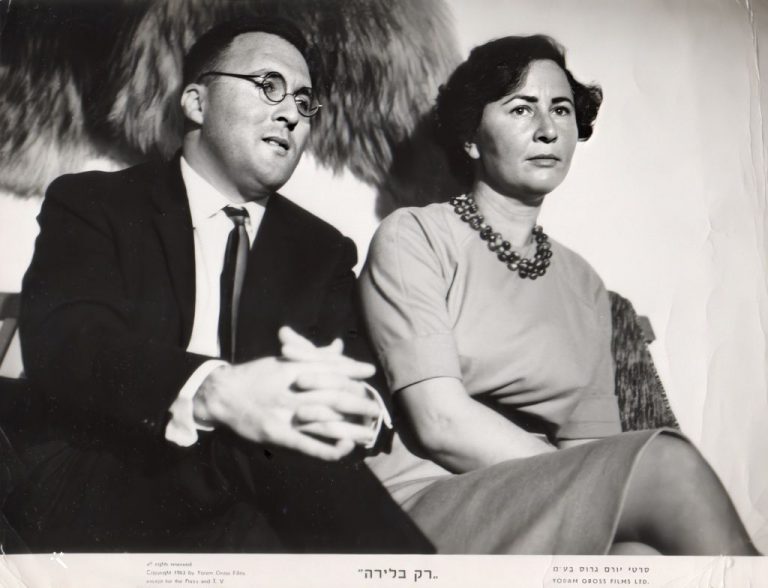
Pommy and Moody, as "extras" in the movie, Only One Lira. The story is told that for one of the scenes, the director was looking for background audience but to no avail, so he called Pommy and Moody, who lived in close proximity to the shooting location… and the rest is history
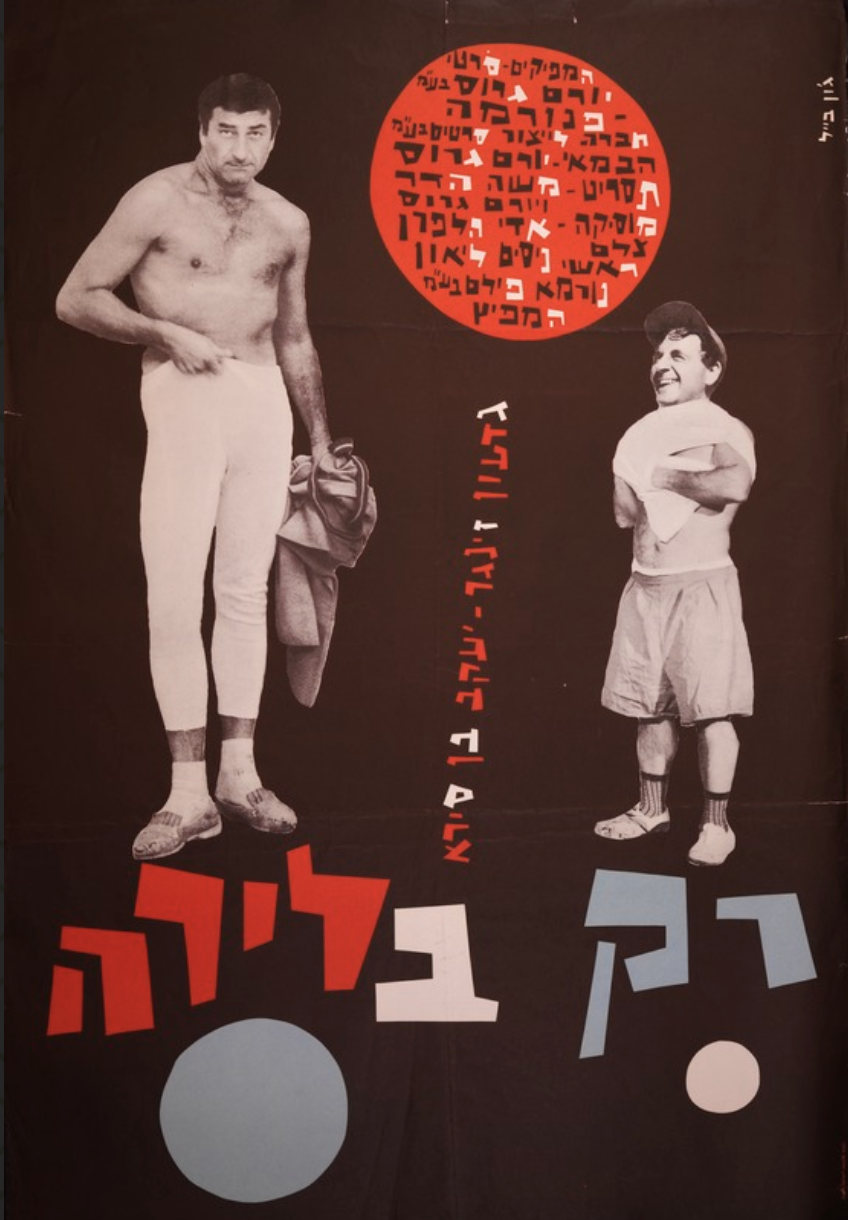
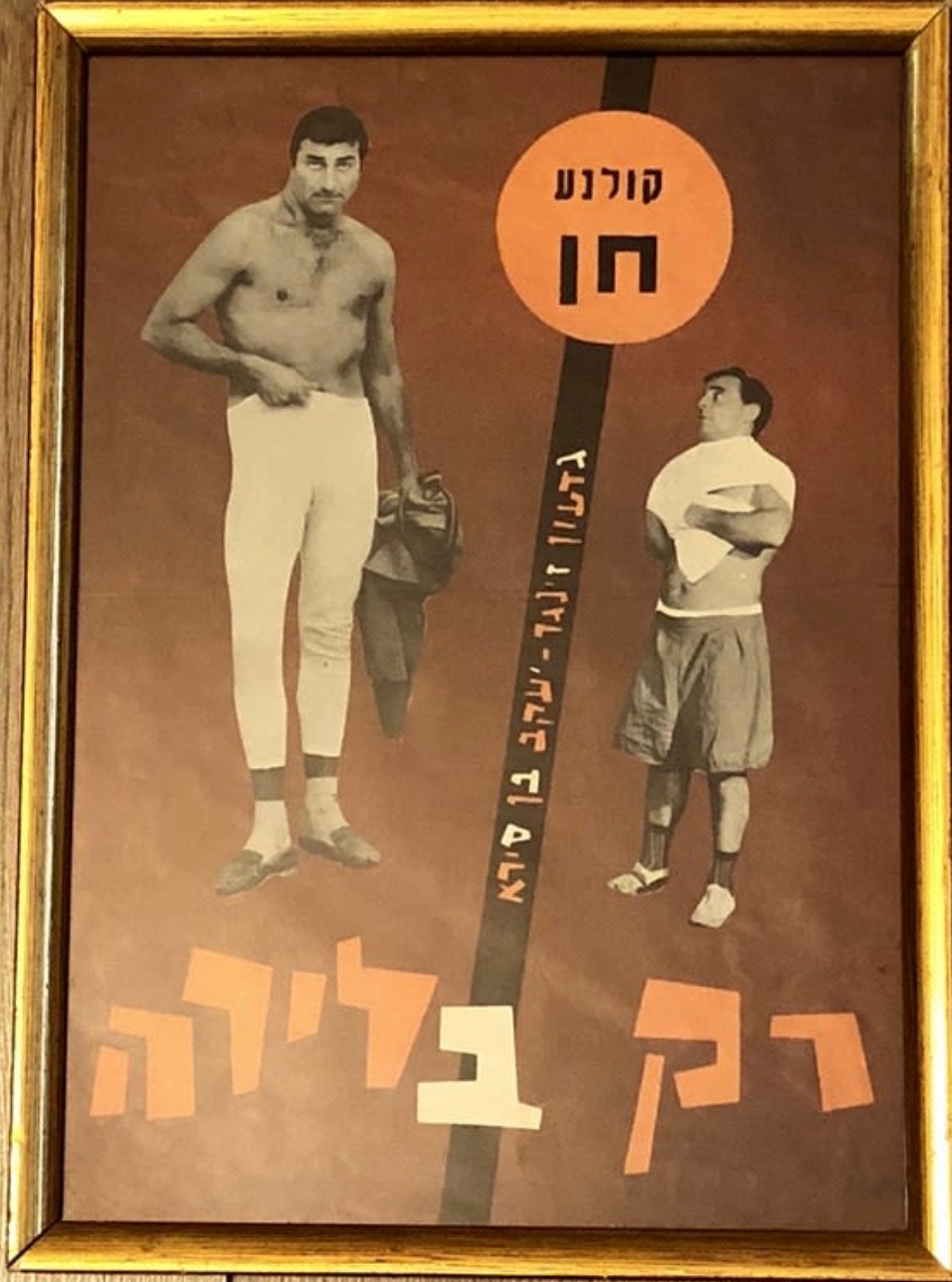
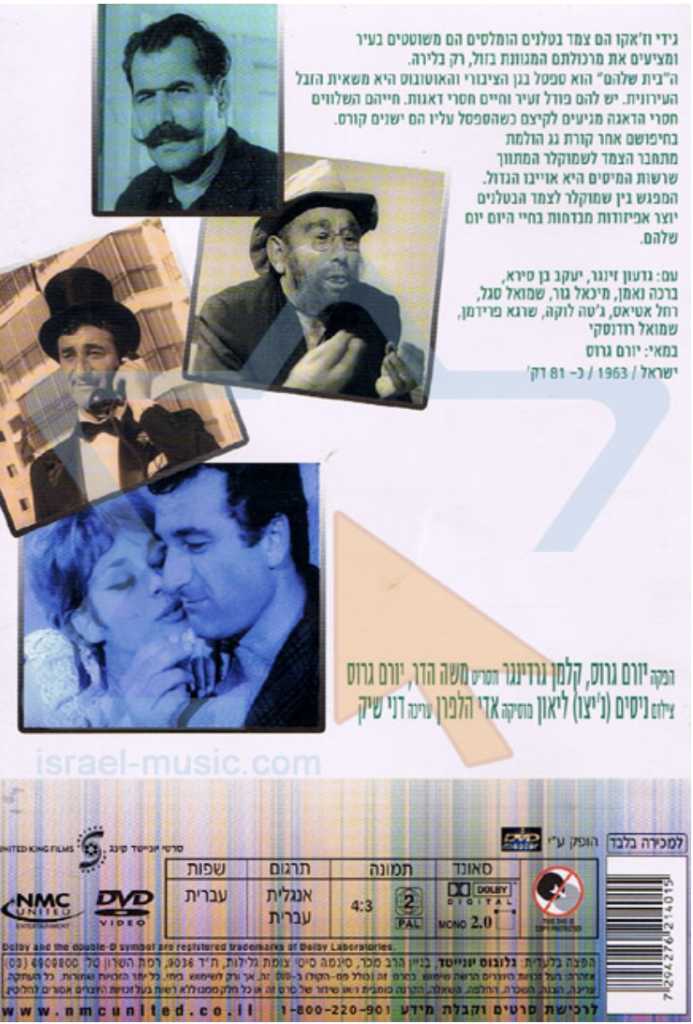
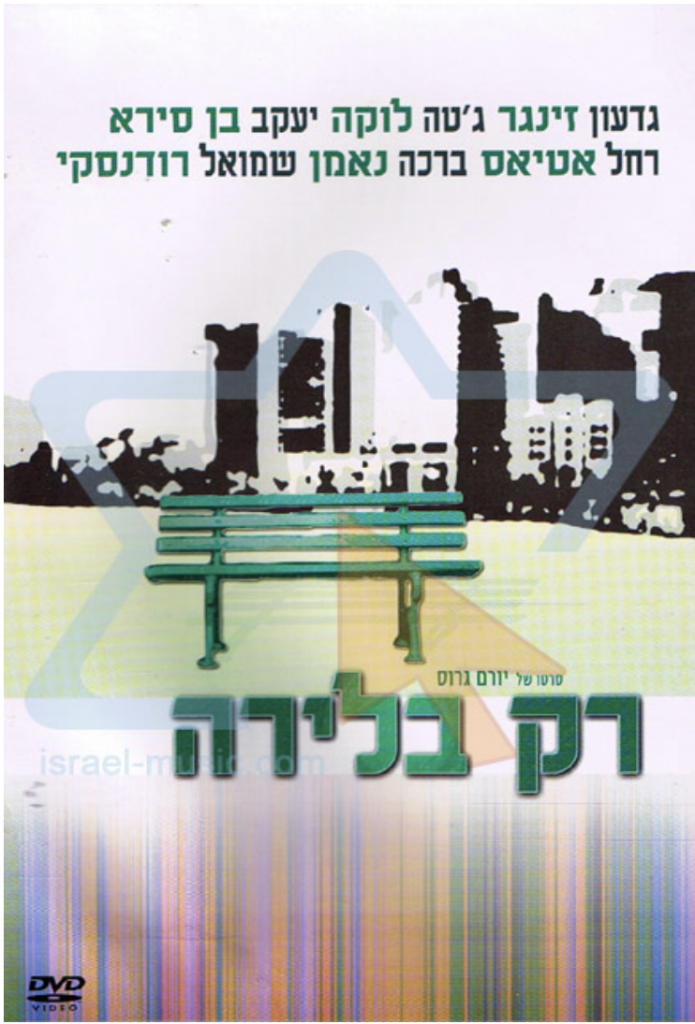
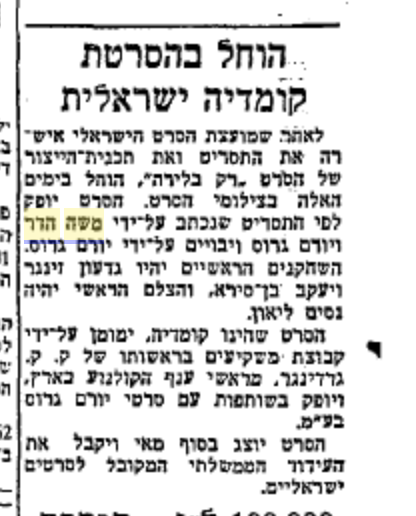
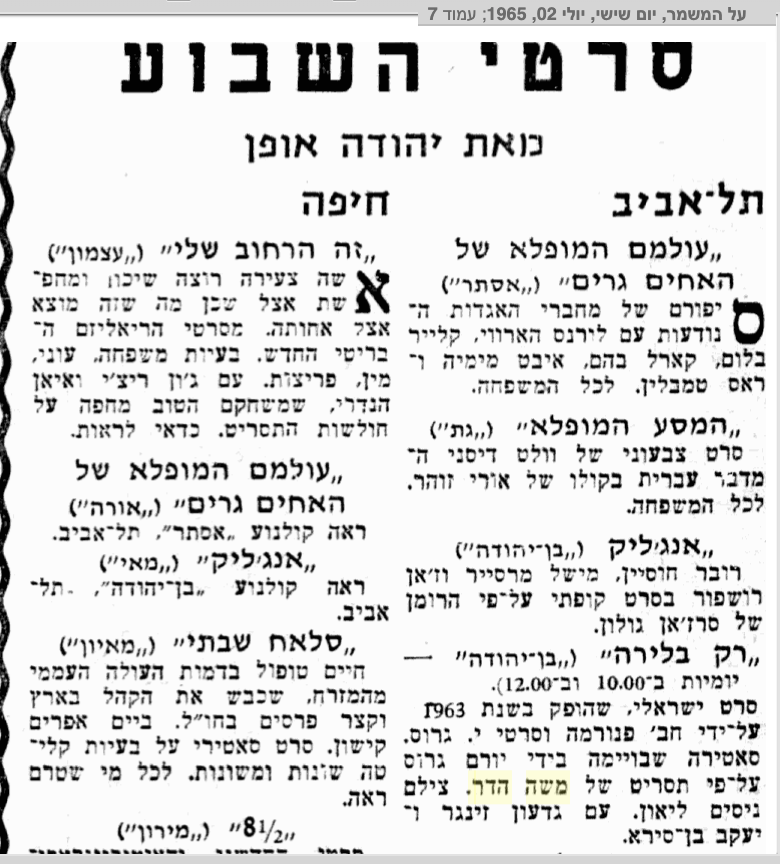

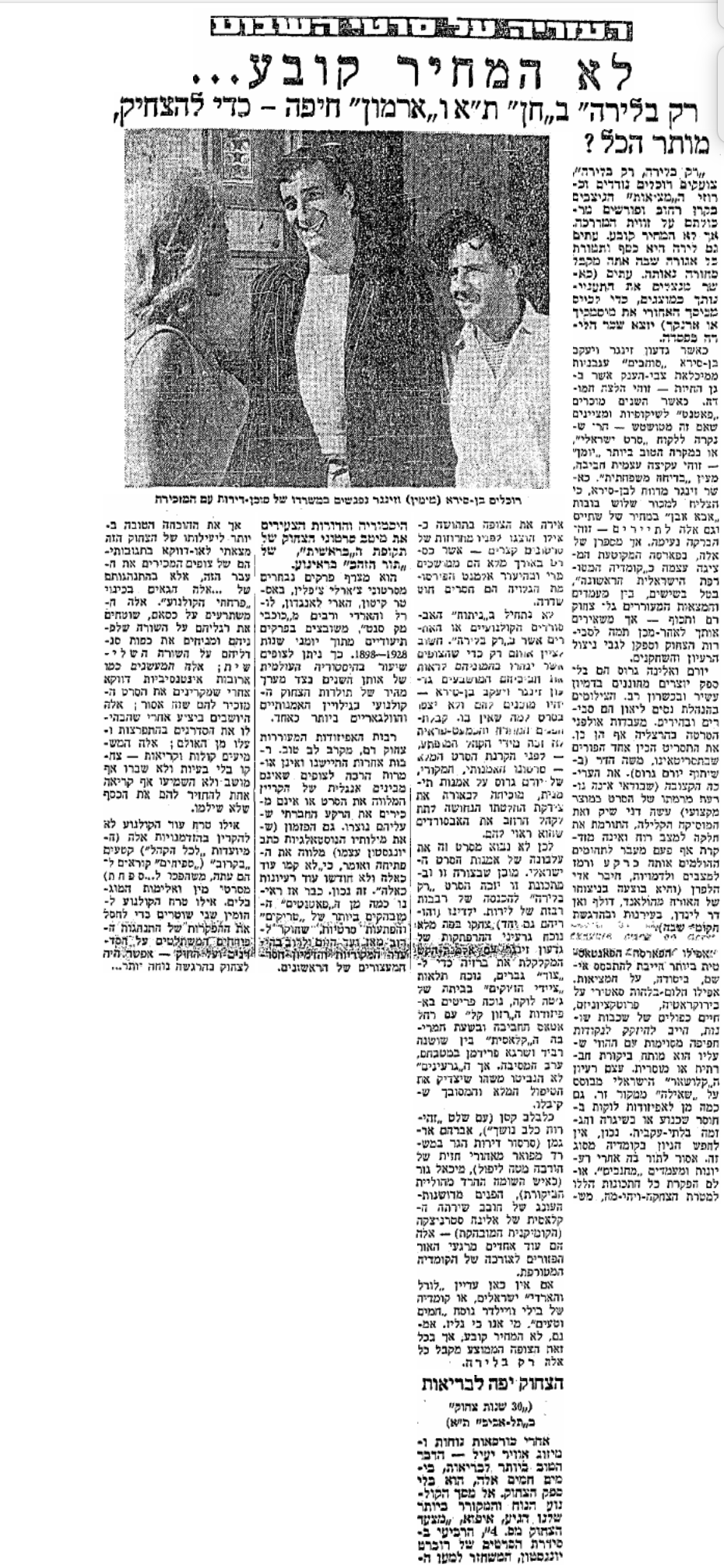
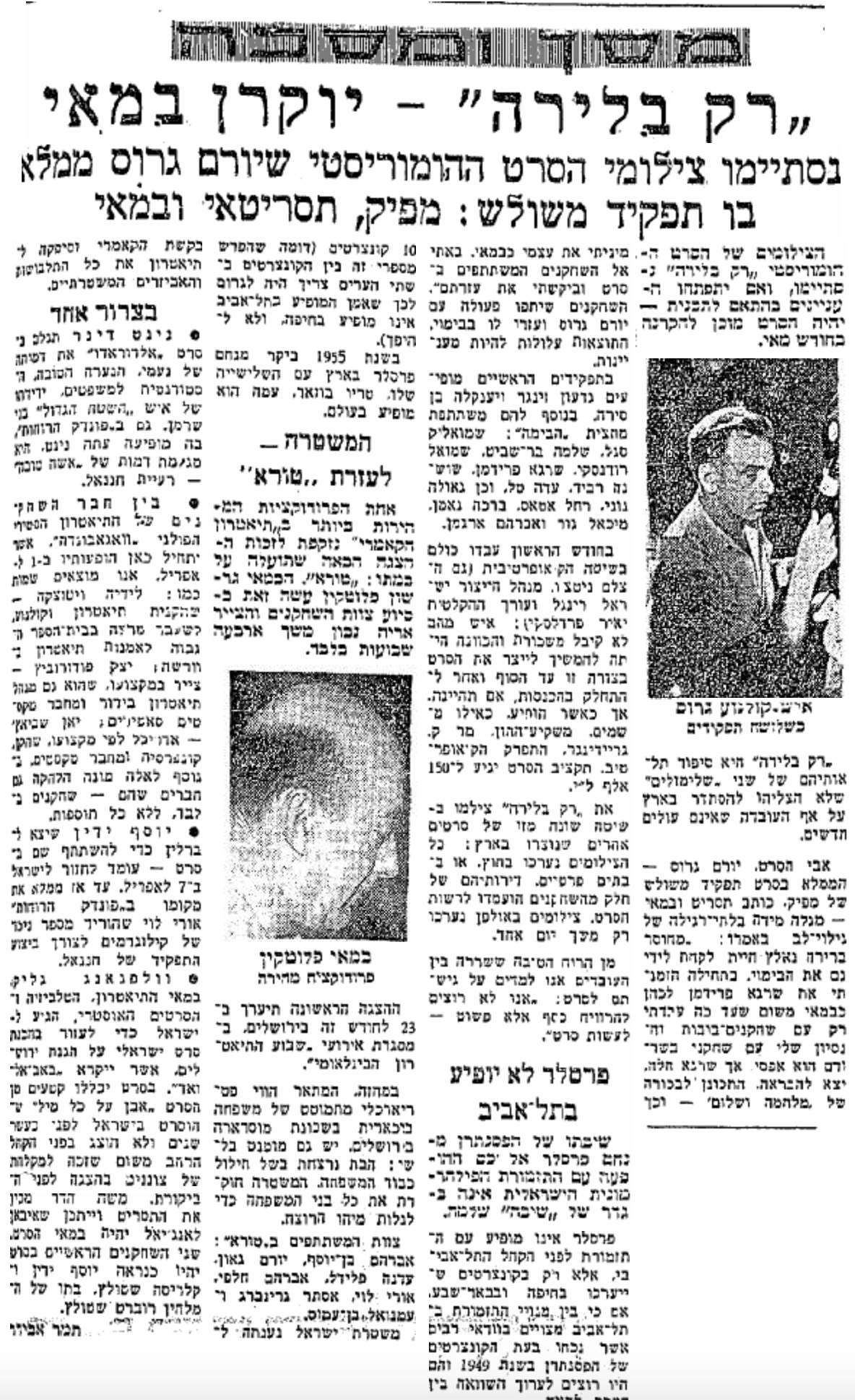
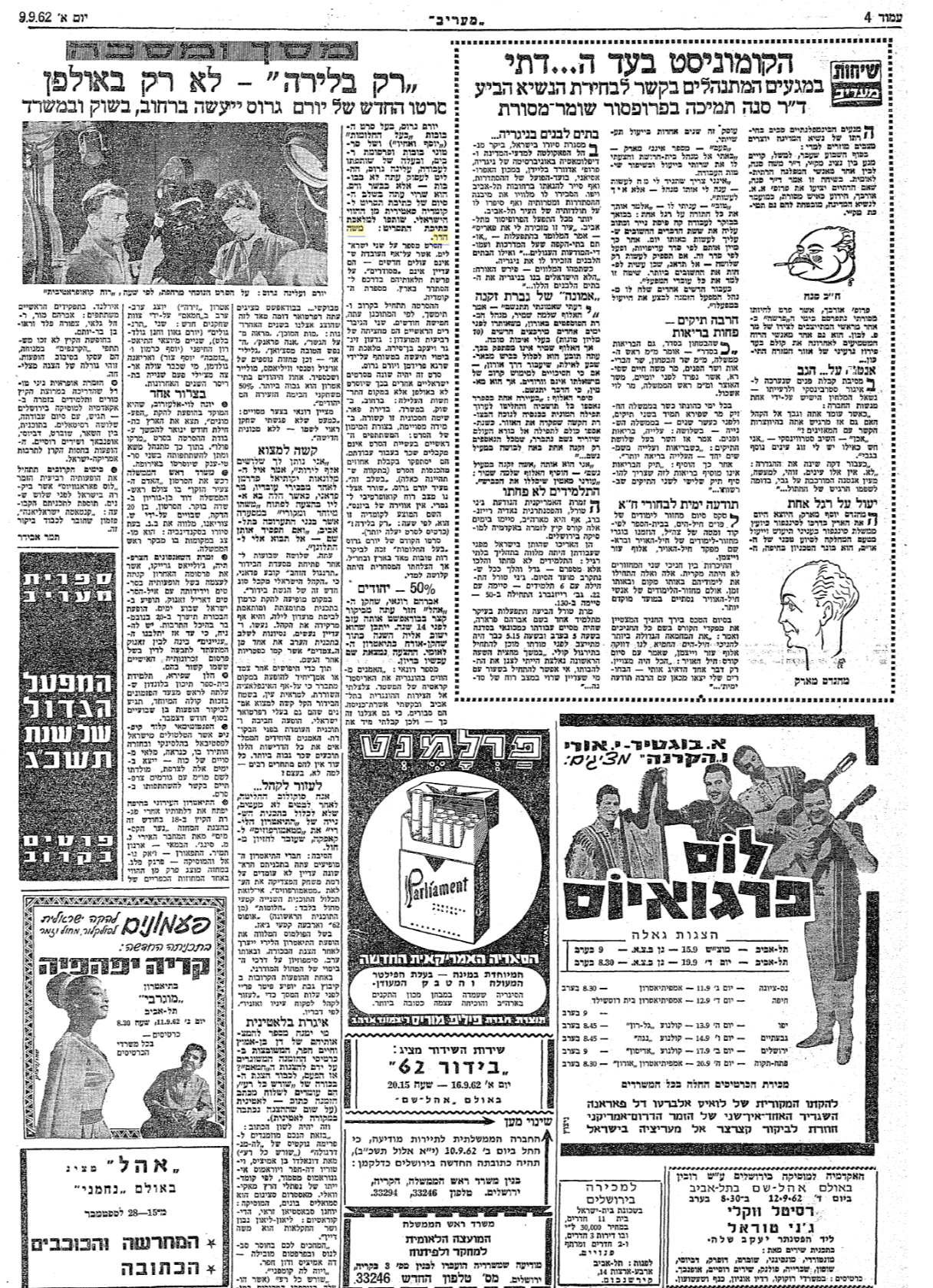
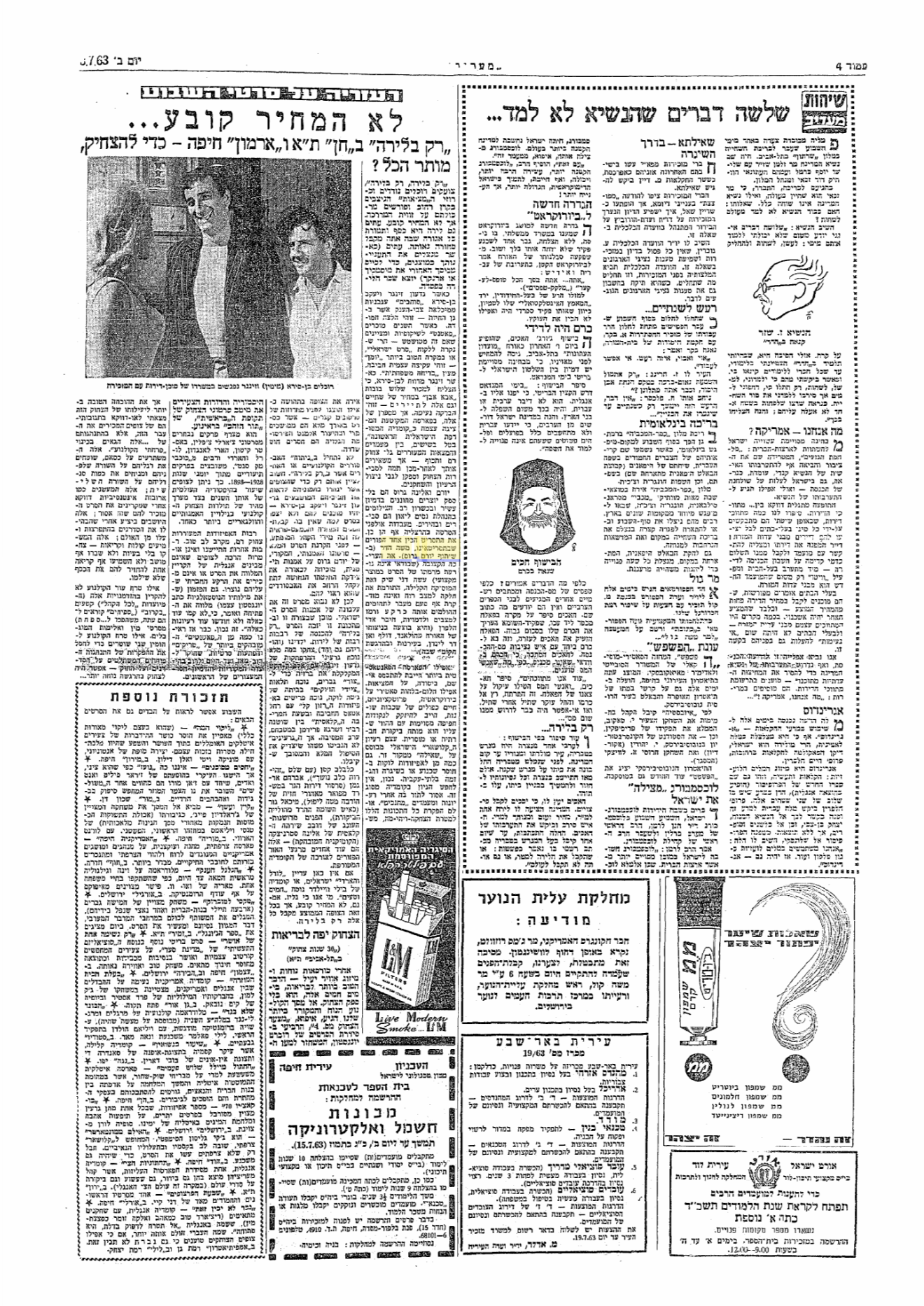
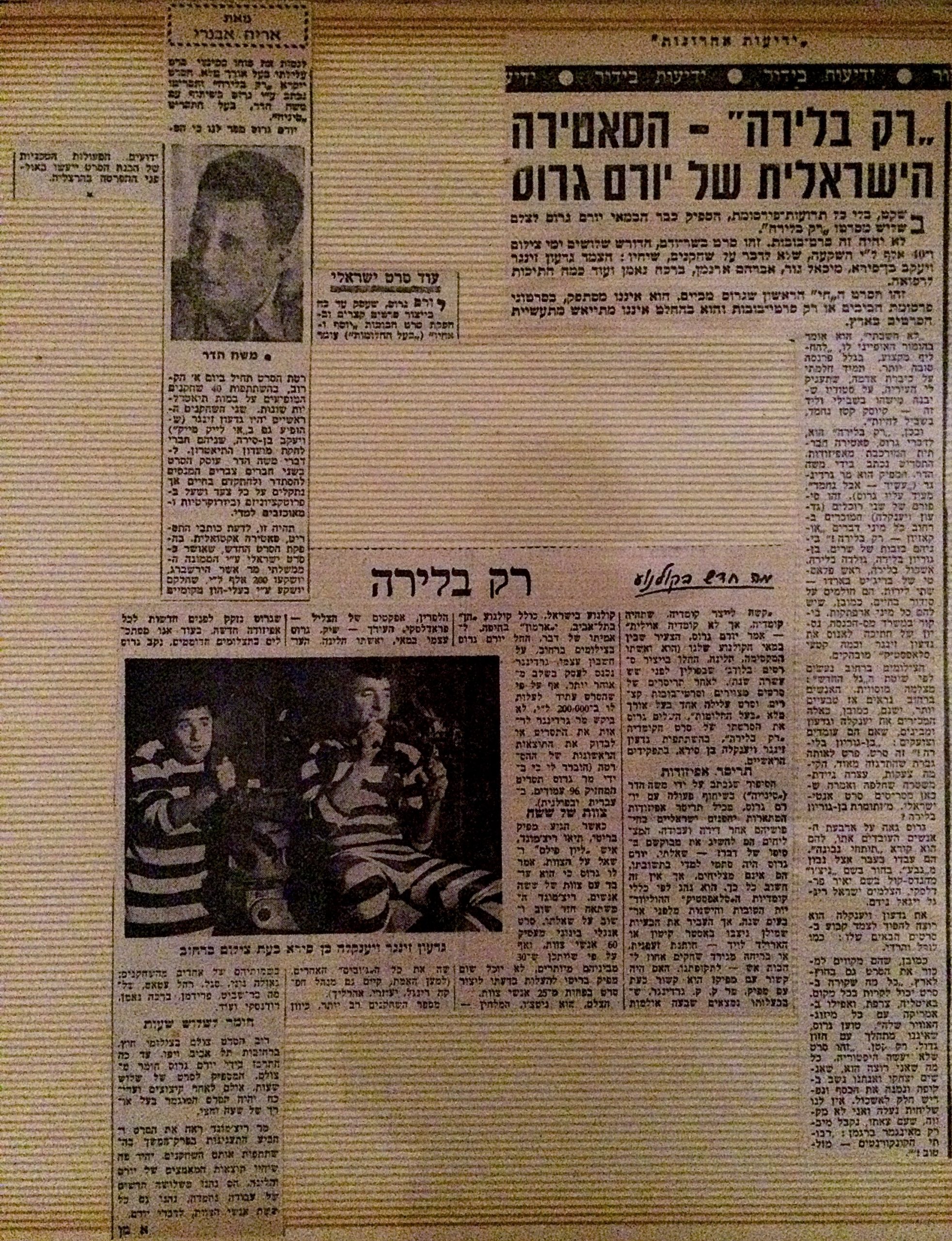
Midnight Blast - 1965
The movie opens with a big explosion set by a Palestinian Fedayeens, who detonated a water tank. A French engineer (Raymond Flagreen) returned to Tiberias to oversee the construction and installations of the National Water Carrier of Israel. His wife (Pascale Petit) joins him but does not have anything in common with the locals – except for one Israeli engineer (Gideon Schemer) who devotes his time to her, probably with good intentions (being a gracious host…). Pascals is very nervous; she calms herself down using drugs.
Her husband works hard and she suspects he likes his secretary Geula Nuni above and behind working relationships (but the movie doesn't portray anything funky…). Either way Pascale is miserable and misses Paris. But most miserable is their little daughter (Eva Klugstein) who suffers because her parents don't pay enough attention to her.
The little girl draws false deductions from Gideon and her mother's relationship. One day the girl disappears and does not return home. The French engineer is certain that his daughter was kidnapped by a Syrians guerrilla who wanted to sabotage the National Water Carrier. The Police Inspector (Isaac Shilo) thinks otherwise, but he spares no effort to find the girl. He uses K-9s and 500 police officers along with a group of Arabs trackers who have great ability to trace people through their footstep. The engineer calls the French government which appeals to the government of Damascus. The father receives a phone call from an extortionist who is ready to return the girl (whom he doesn’t have) in exchange for the secret plans of the National Water Carrier – and he – the French engineer – is ready to hand them over… The Arab trackers and the police find the girl who, in the last minute, escapes her kidnapers and heads towards the border and into a land-mine field. Gideon Schemer manages to pull her out and peace is restored.
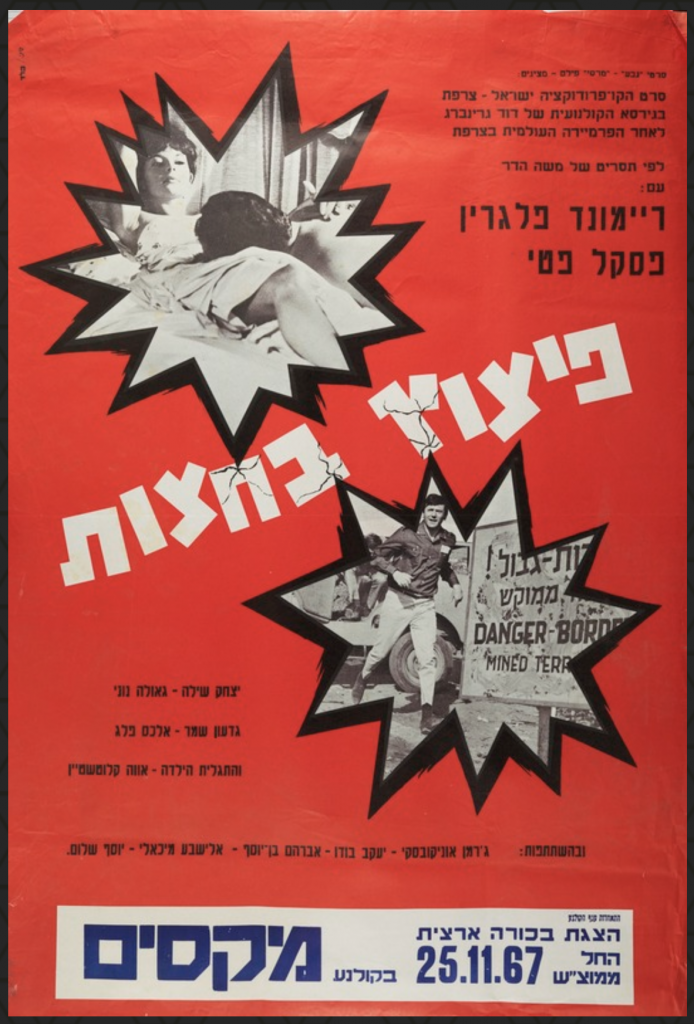
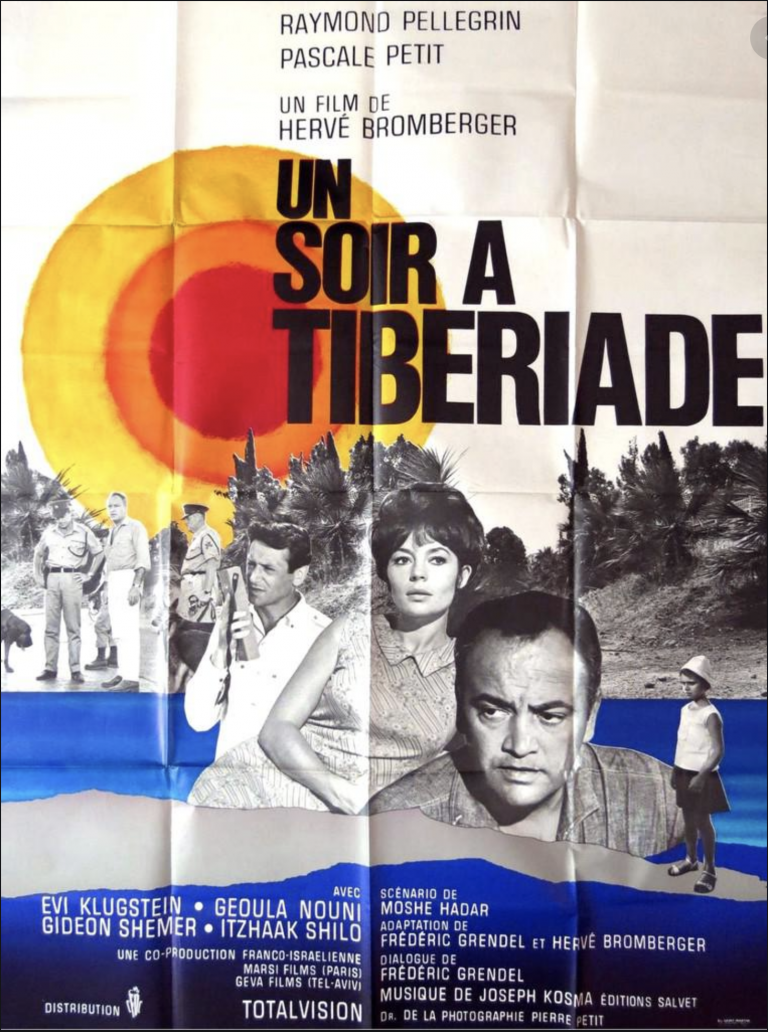
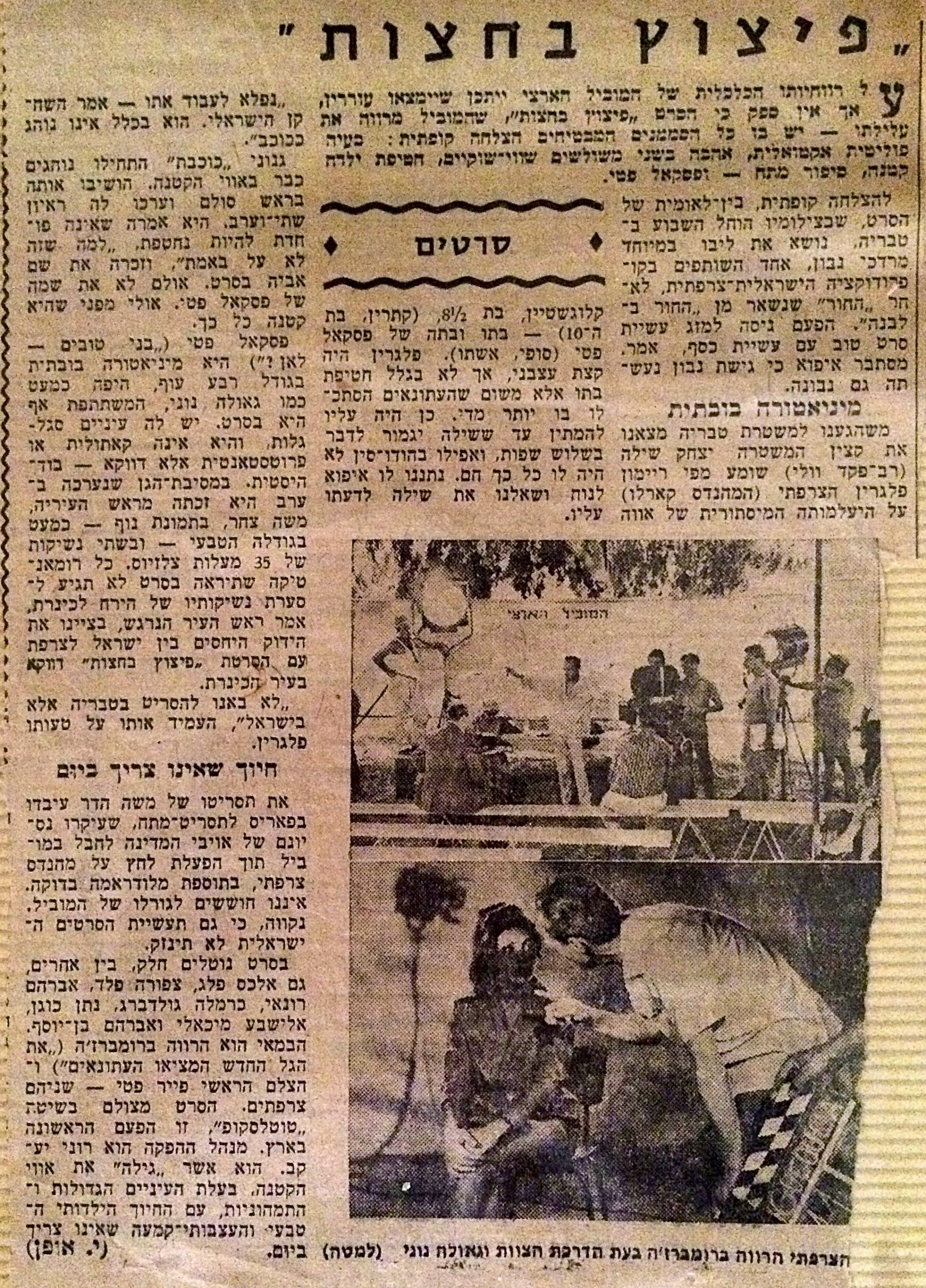

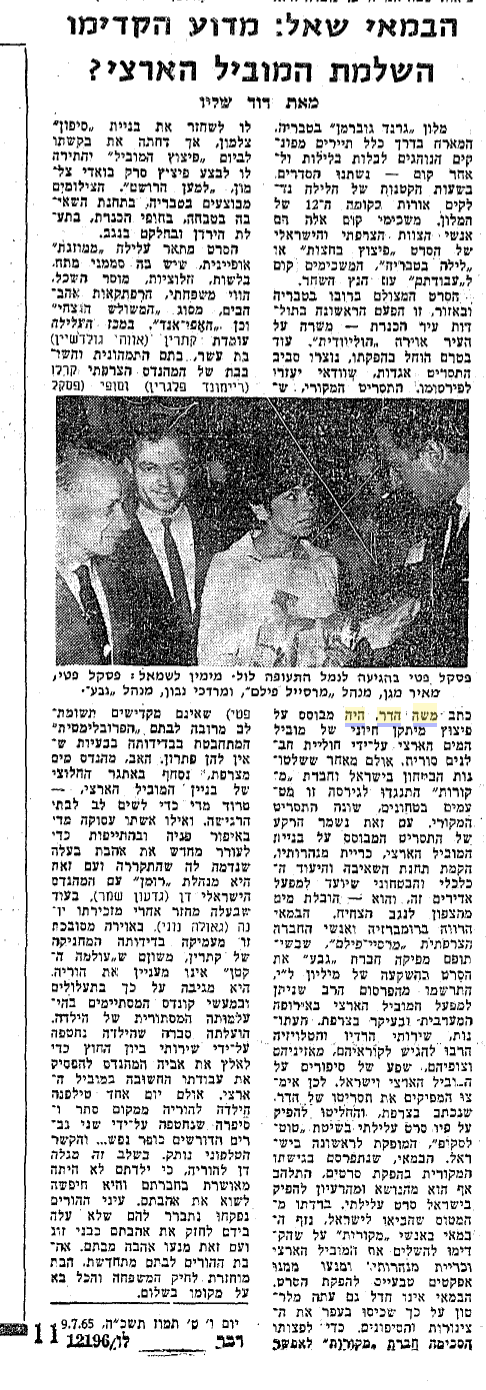
The War After the War – 1969
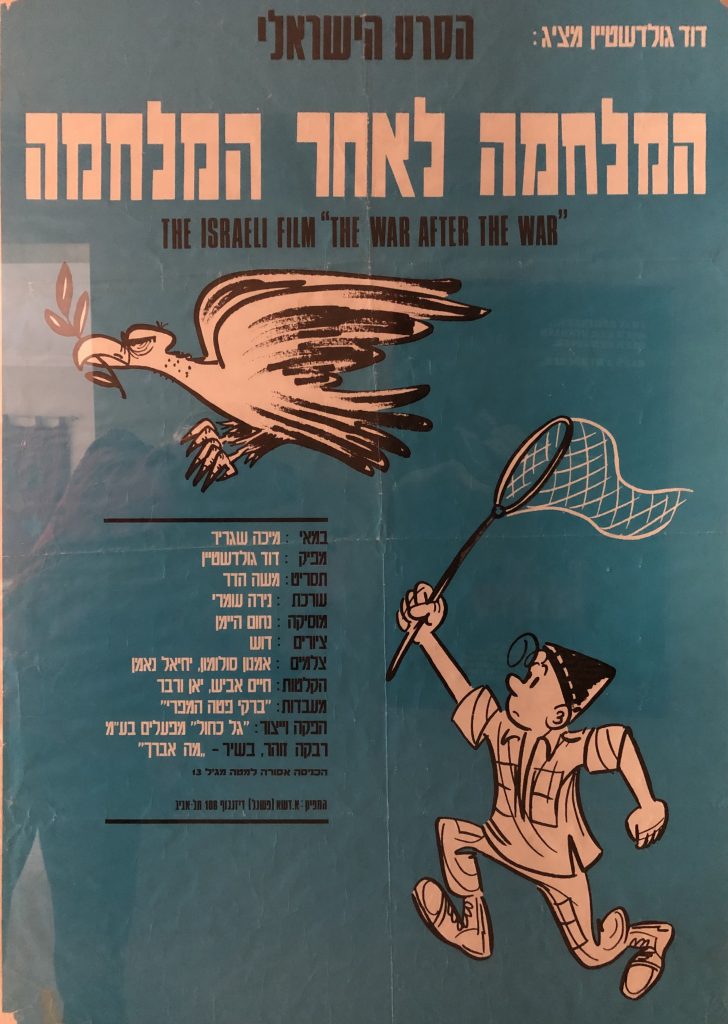
A docudrama film based on a story that accounts an all-encompassing reality and horrific emotional rollercoaster, an almost-fatalistic destiny, which the State of Israel was doomed to live, two years post the 1967, Six Day War. The film is built on sharp and surprising transitions with snappy contrasts.
In one of the battles with the Jordanians, an IDF officer and a Palestinian terrorist were injured. Both are flown in the same helicopter to the same hospital. The fight to save the two lives with all the phases of surgery is the film's narrative framework.
The film has been widely praised by the critics for its ability to transform and capture the "spirit of the period": It describes the military situation along the Jordan border when PLO raids against Israel, followed by IDF chases after the perpetrators, became a daily routine. While the war of attrition is raging in the Jordan Valley, in Tel Aviv civilian are going out to disco. The fear of terror is mounting and with it a feeling that the Arab leaders are unlikely to pursue the peace process. A strong sense of Deja Vu envelops the waiting period of "the war after the war" perhaps because today, in the war after the peace, nothing has changed.
In a newspaper article, "The war is not over …" by Nathan Gross, Al Ha’meshmar, May 4, 1969, Pommy said, "The idea has been haunting me since I completed the movie, Three Hours in June, about our Air Force in the Six Day War. When I first saw the final cut of the film and the word 'end' at the end, I suddenly realized that it is not true, it is not yet the end … This ‘end’ scene has hunted me, constantly, I could not sleep at all! We are living in the midst of an extraordinary national drama with different and varied aspects…this should be documented! And one day, I said to myself: Let's summarize the situation, let's try to describe how this country has lived for a year and a half after the war! That is – during the war-after-the-war because the war still raging… "
Pommy went on, "As soon as the idea culminated in my head, I called the producer David Goldstein (Didi) from Gal Films. He promised to return my call as soon as possible and after ten minutes he phoned: 'We are making the movie!”
The film produced two songs that sung themselves into the hearts of the citizens and became popular among Israeli singer's repertoire
The first song: "Chase" words by Yaron London, composer Nachum Heiman. It was the most poetic expression of Israel’s struggle for survival and peace. Performer: Chava Alberstein
The second song: "Alanbi Bridge, words by Yaron London, composed by Nurit Hirsch. Performer: Yoram Gaon
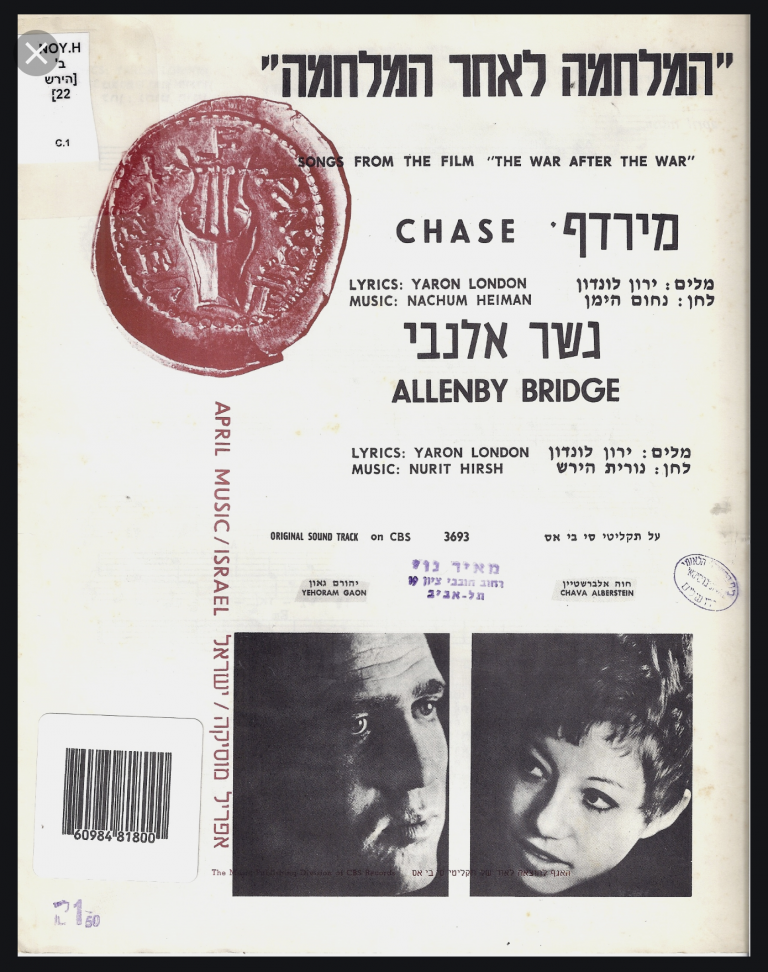
Ehud Ashri, a reporter for the Haaretz newspaper, wrote on May 21, 2017, that the six-day war songs were the first symptoms of the megalomania and messianic complexes plaguing the new Israeli empire.
The 1967 creative storm also invaded 1968, the source of inspiration were the daily pursuits after terrorists in the Jordan valley, which entered the Israeli ethos as a direct disciple of the war. Yaron London (today, a top TV anchor and a popular talk show host), then a young man in his 20s, has not yet established a clear political stance. This is the only explanation to the considerable discrepancy in the words he had written in the two songs that year (to the War After the War docudrama).
The first song, "Chase," is influenced by the atmosphere of euphoria, nationalism and supremacy that prevailed in the country after the (Six Day) war. Later London admits that he regrets writing the chorus, which he says has become the settlers' anthem. "This is a fascist song," he said in an interview with the IDF Army radio, "an enslavement to blood and earth myths."
Generous land, her veins full of honey
and blood in her rivers like water still flows.
Land whose tall mountains are carved out of copper
But her nerves out of iron, she knows.
A land whose long history is but chase after chase,
Two thousand pages plus one,
The air in her lungs half consumed, she is tired,
But will chase back her foes in the run.
London said he enjoyed the French version Composed by Nahum Hyman and sang by Marie Laforet, 1969 (enclosed below).
From the song emerges a patriotic-belligerent worldview of a bloodthirsty land, a species of modern Sparta living on its sword and perceiving its neighbors as an eternal and one-dimensional enemy. It is a little strange that London, at the time, also wrote "Allenby Bridge," a refrain that adopts a universal-human position: Instead of dwelling on the blood streams and iron nerves of his country, London chooses to write about the place that symbolizes the human encounter between Jews and Arabs; Instead of telling about pursuing its enemy, he prefers to tell of one, Abdullah, who crosses the bridge on his way to one of the neighboring states.
The bridge burns in the faint of afternoon
the road jumps on the warm river
that's between the homestead of Judea and Efraim
and Gad Reuben and half of Menashe
Among Eucalyptus and palm trees
spiky acacia and orange and lemon
Over river stones and river plants
Abdullah goes to the land of Amon
London's Allenby Bridge is a secular, mundane, almost pastoral site where a transistor plays a singer in the background, a soldier moving to the jazz beat, Abdullah awaits his turn wearing striped coat, a custom officer checks from front of the car to the wheel and hundred drivers smoke (Israeli made) Freed and El Al cigarettes? London finds it difficult to relate this vision to the raids against Israel, followed by IDF chases:
- Bailey Bridge, bridge, bridge
- between the green river banks
- but what are these shots and what’s the meaning
- of (all) the deep machine guns
With a slight effort, this song can be seen as the first sprout of the Peace Songs trend that sprung as a counter-reaction to the six-day (war) atmosphere.
Allenby Bridge
The Song "Allenby Bridge," describes the pastoral view of the bridge after the Six Days War
Lyrics: Yaron London
Composure: Nurit Hirsh
Singer: Yoram Gaon
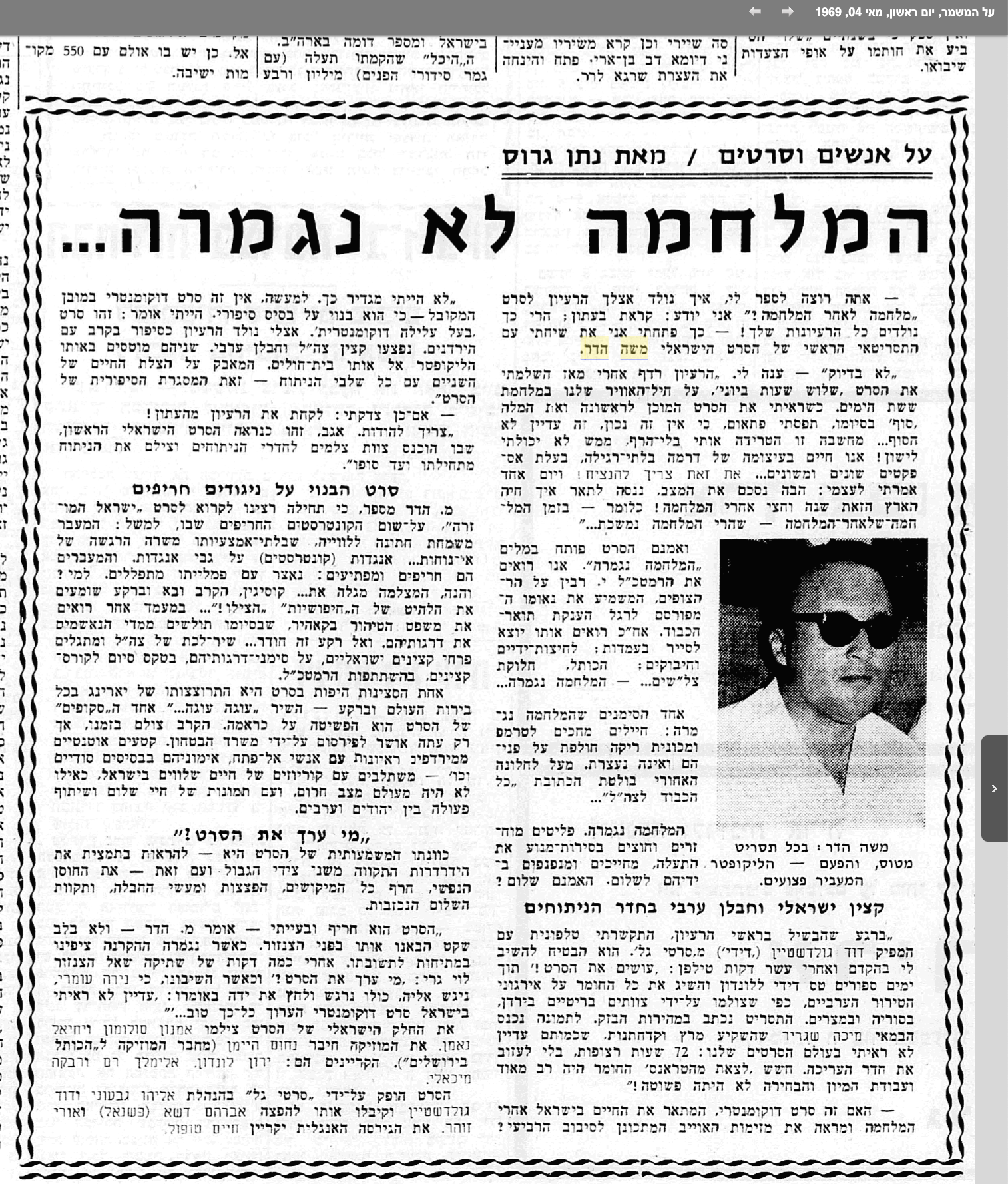
Chase
The first song that Nachum (Nachcha) Heyman ever composed for a movie was "Chase." He composed it for the singer, Chava Alberstein, early on in her professional life. Heyman was then, at the beginning of his career and Micah Shagrir, the director of the film "The War After War," was making his film debut, gave Heyman the words to song written by Yaron London. He was asked to work a song that would be nonstop and create the sense of suffocation and feeling out of breath in a relentless pursuit.
Lyrics: Yaron London
Composed and adapted: Nachum Heiman
Performer: Chava Alberstein
Marie Laforêt - Mes bouquets d'Asphodèles, 1969
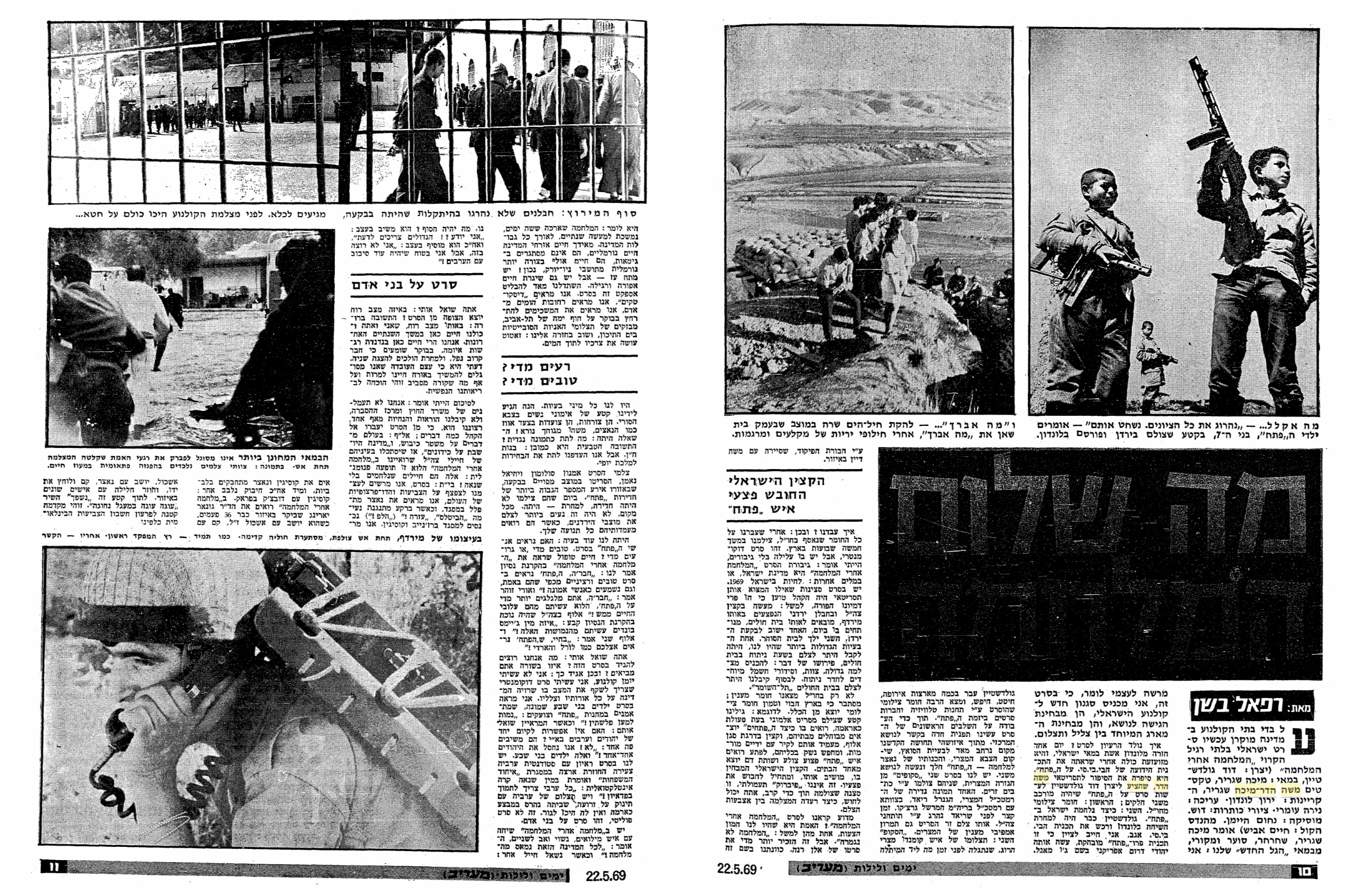
What Should I Bless, Ma Eva'rech
Written by Rachel Shapiro and composed by Yair Rosenblum. It was one of the most well-known memorial songs in Israeli culture.
The song is performed at the end of the movie "The War After the War," by the Israeli Navy Band with vocalist, Rivka Zohar .
This is a eulogy that tells of a world that God has blessed with countless qualities of exalted body and soul, but at the end of the song the call is heard:
God, God, God
If you wish him a blessing – life.
Shapira, a member of Kibbutz Shefayim, wrote the song after the Six-Day War in memory of a member of her kibbutz, Eldad (Dedi) Crook, who fell in the same war in the Shuafat neighborhood of Jerusalem, and he was 22 years old.
The War After The War – A Must See
Yaacov Haelyon, Ma'ariv Newspaper, 27 May 1969
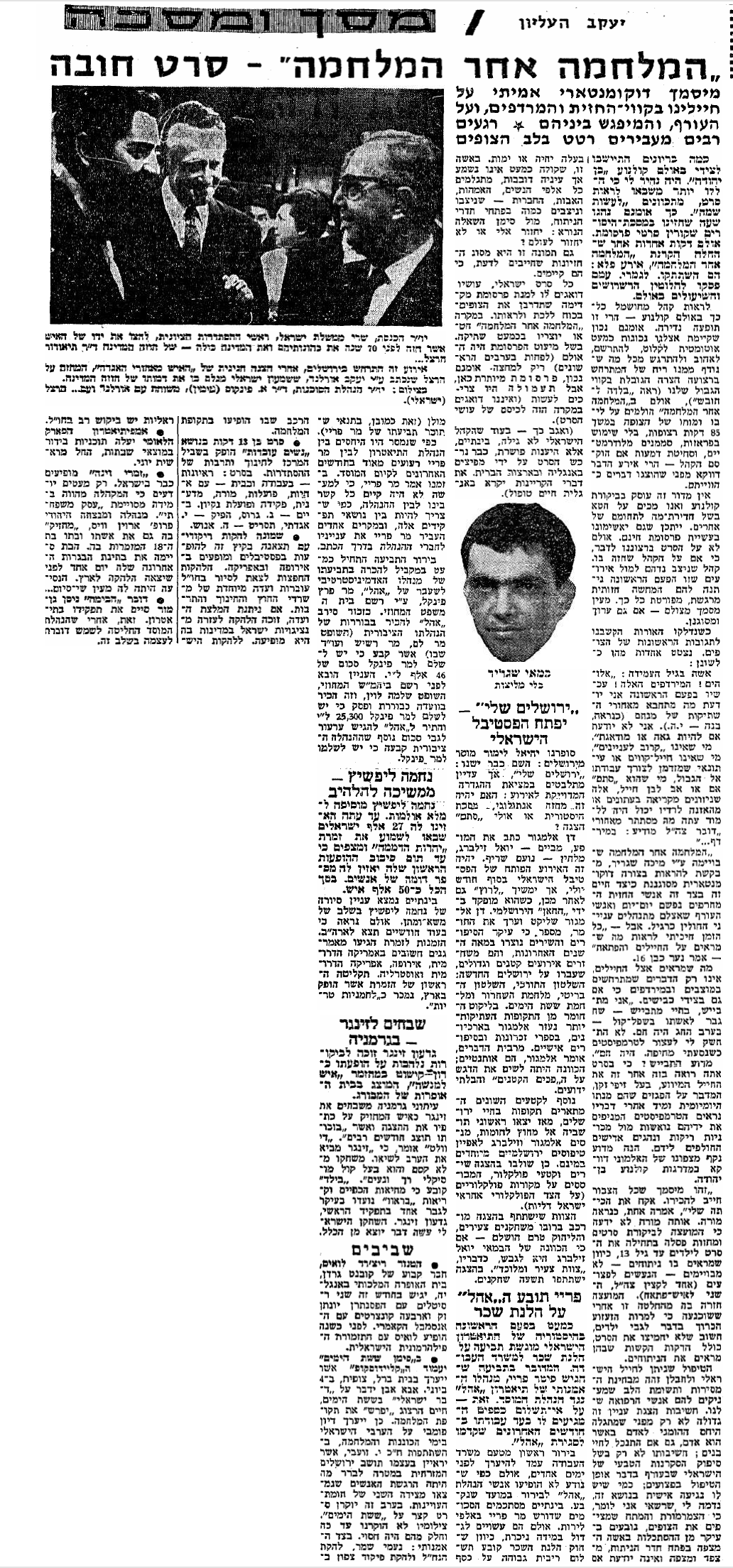
Two Heart Beats – 1972
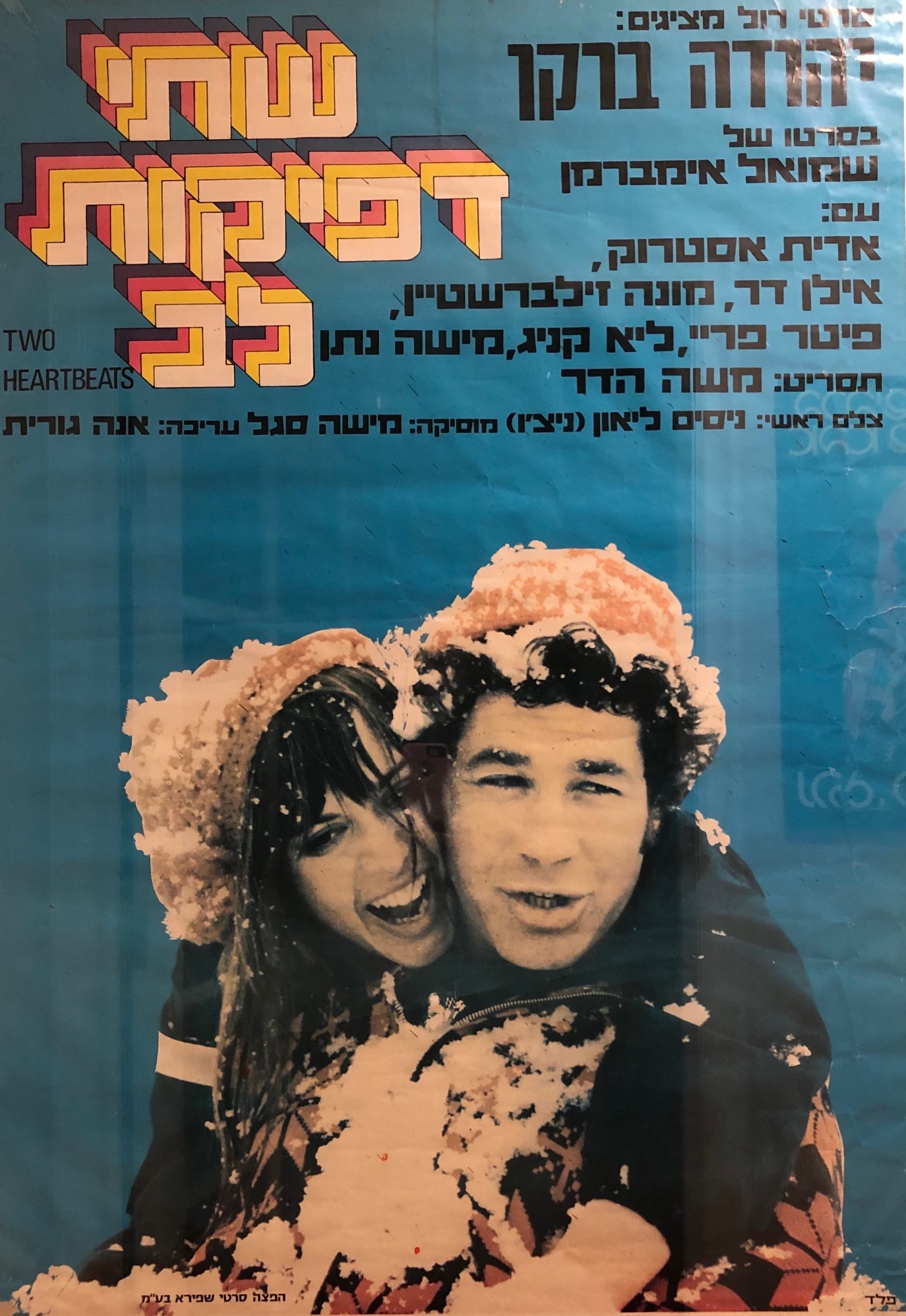
The Plot: A handsome young university student (Yehuda Barkan) finds a new way to make extra money by becoming a sperm donor. But something goes terribly wrong (see enclosed pamphlets in English)
In an interview with Ma'ariv Newspaper, in 1972, Pommy said that the idea came to him "following a case he was involved with.” He continued, “before the Six Days War, an IDF officer turned to an OBGYN clinic and asked to freeze his sperms so that in case he did not return from the war, his wife could be inseminated."
The Song "Until the End of Summer" from the movie, 1972, Hebrew Version. Written by Ehud Manor. Composed by: Misha Segal. Performer, Eli Magen
The Song "Until the End of Summer". English Version. Written by Ehud Manor. Composed and performed by: Misha Segal
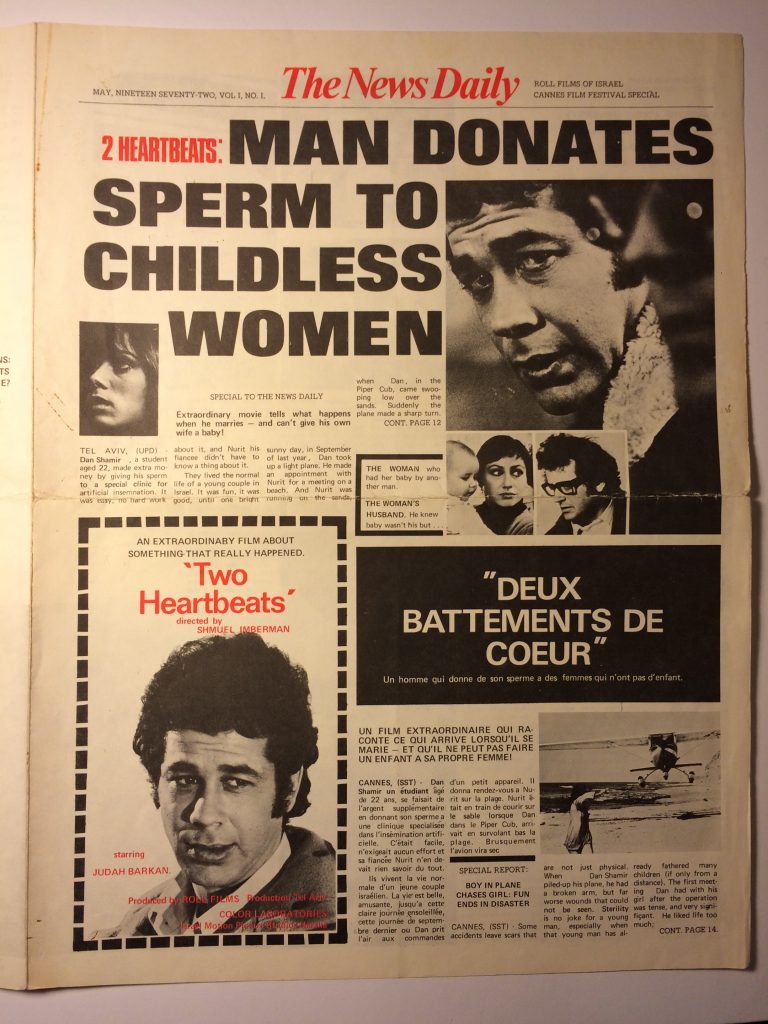
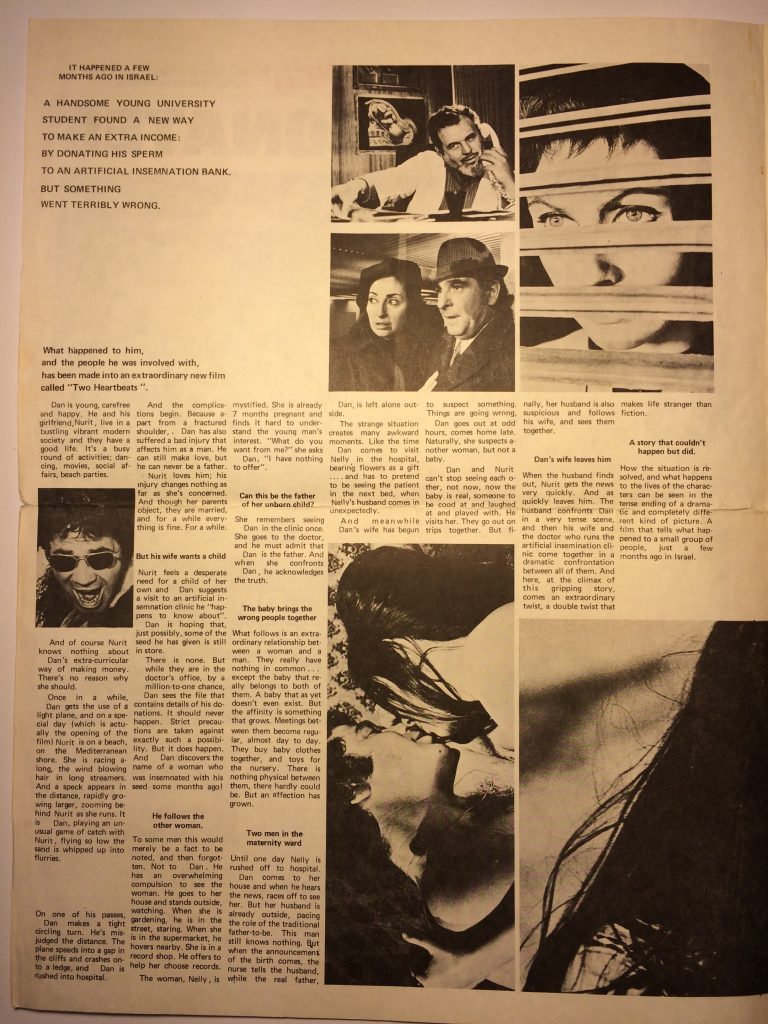
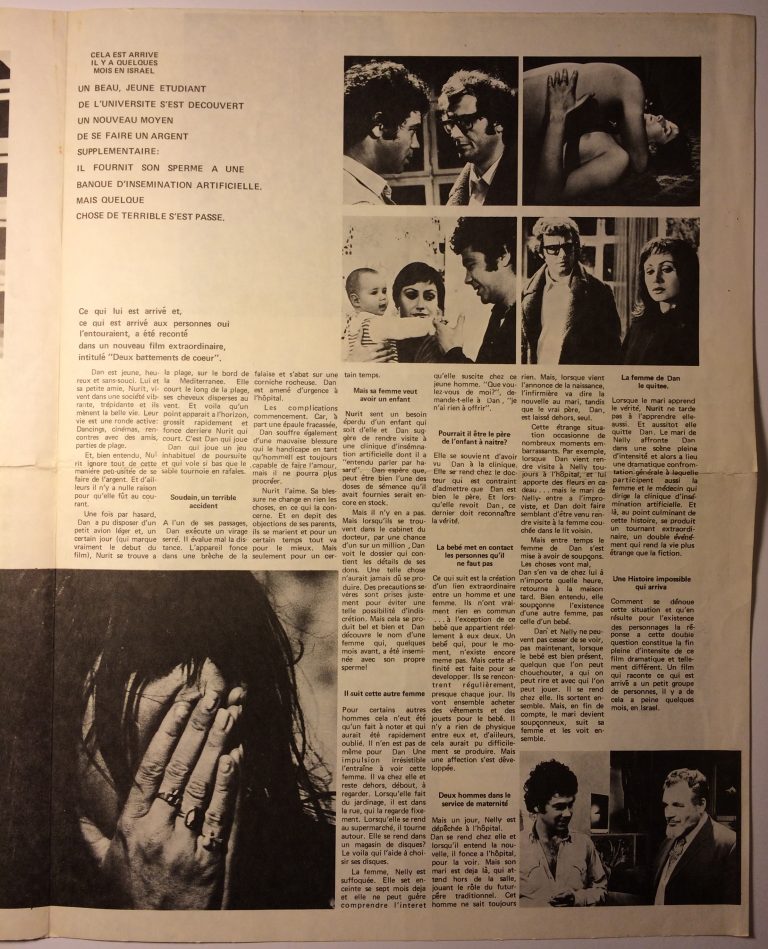
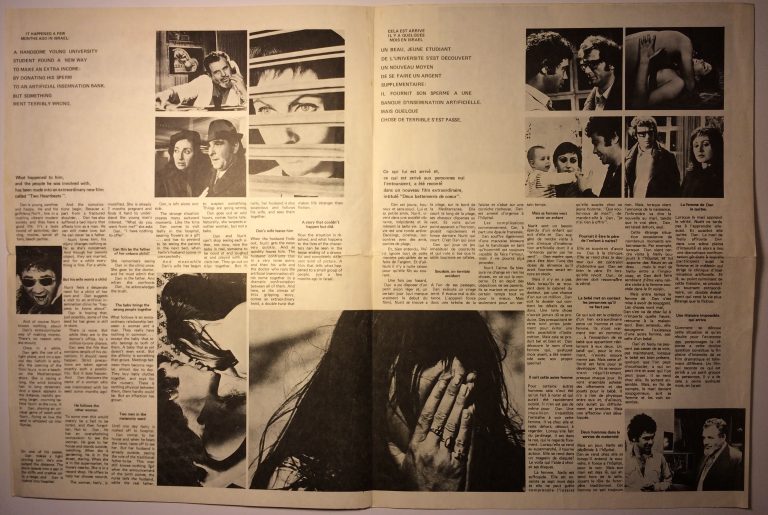
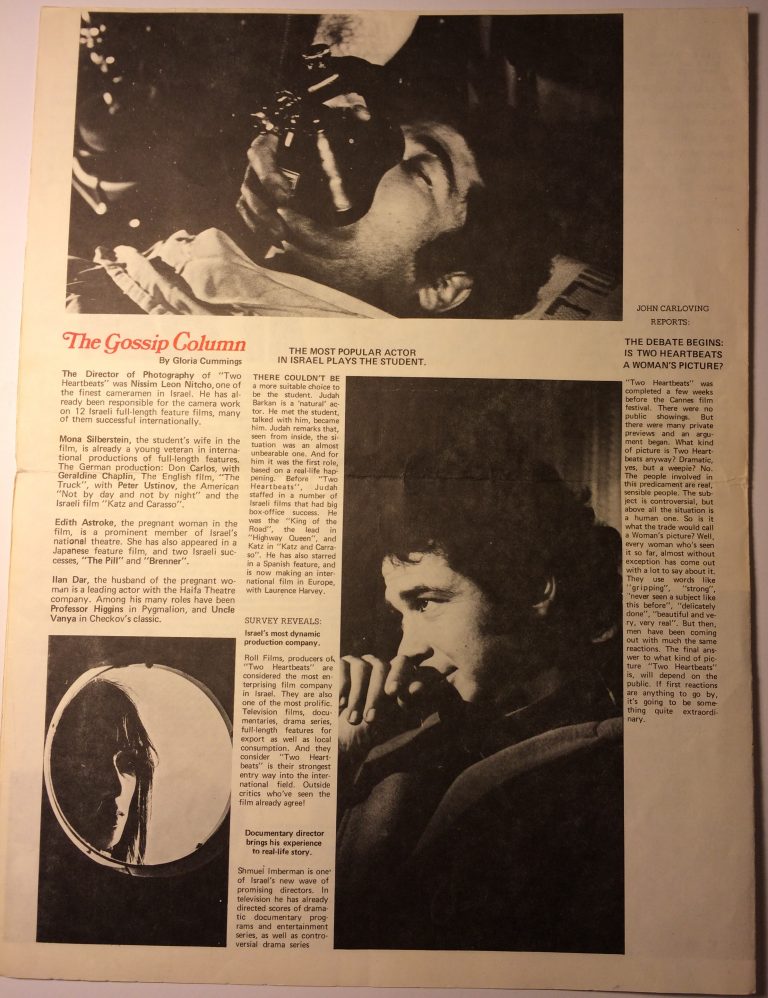
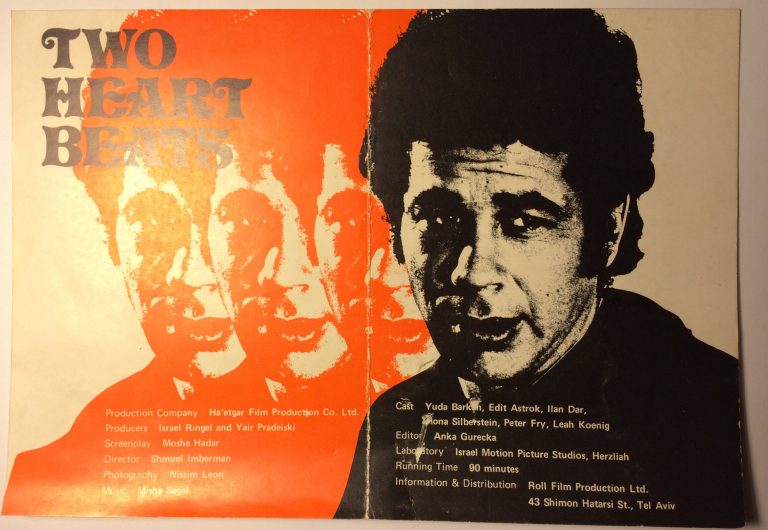
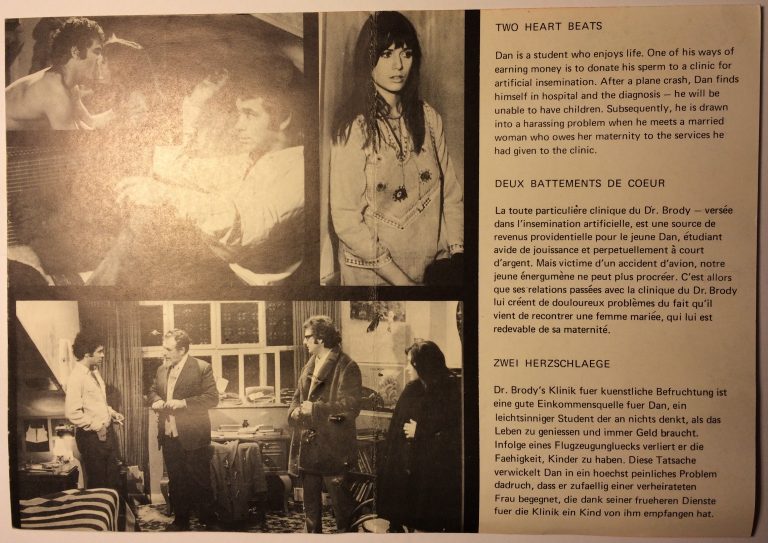
The Great Telephone Heist – 1972
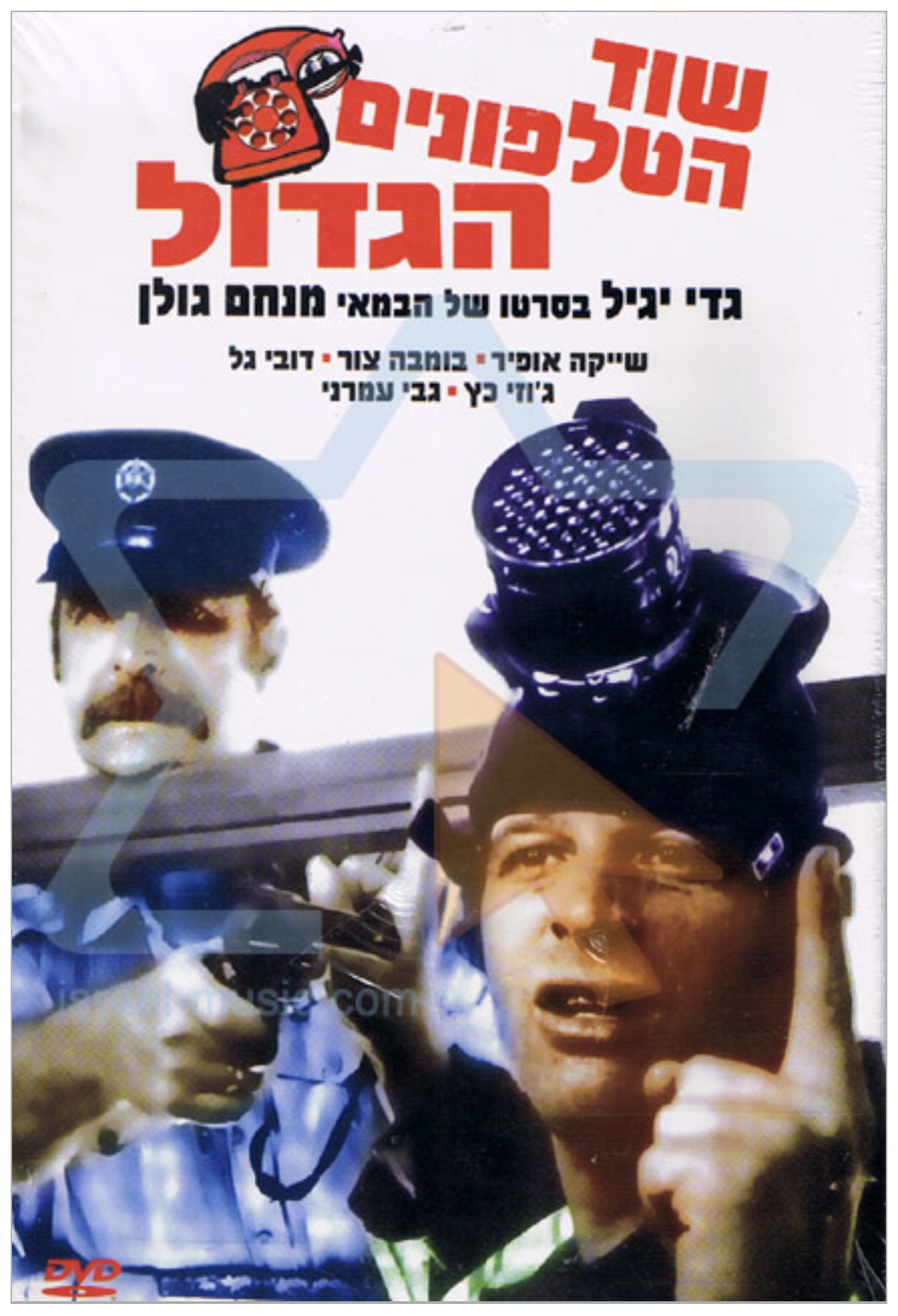
The plot: A bank teller, Meshulam Wasserman (Gadi Yagil), has two strange hobbies, he is an avid reader of thrillers and detective novels and he could figure monthly and yearly interest payments in his head. He dreams of becoming a detective or a police officer. In the not too distant past, he even tried to enroll in the police academy, but because of his high IQ, the force deemed him too smart to be an enforcement officer and denied him employment.
A bank robbery is carried out in his branch by a crew of gangs and Meshulam finds an opportunity to live his book fantasy by trying to stop the robbers in a sophisticated ploy. Matters at the police station get twisted and Meshulam finds himself suspected of being one of the gang members. His mother gets abducted and the gang members call him "the brain" because of his ability to calculate anything at a lightning speed. They turned him into a game pawn, as each gang trying to have a piece of his intellect and services. Meshulam realizes that he is in a deep and dangerous s–t. He pulls off a cunning maneuver conning the conmen and clearing his name.
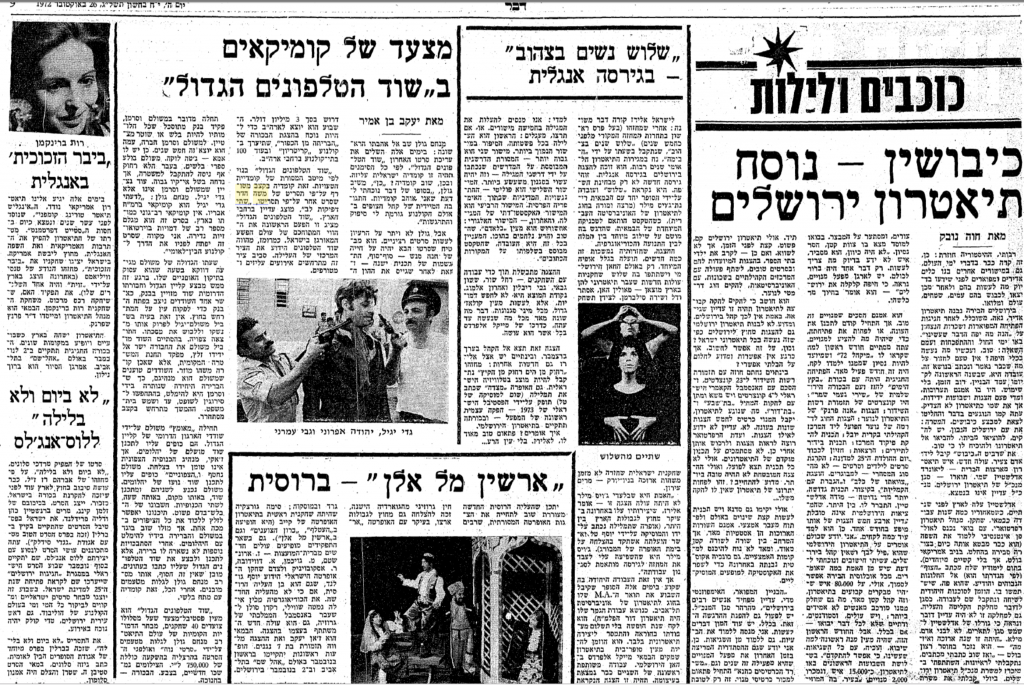
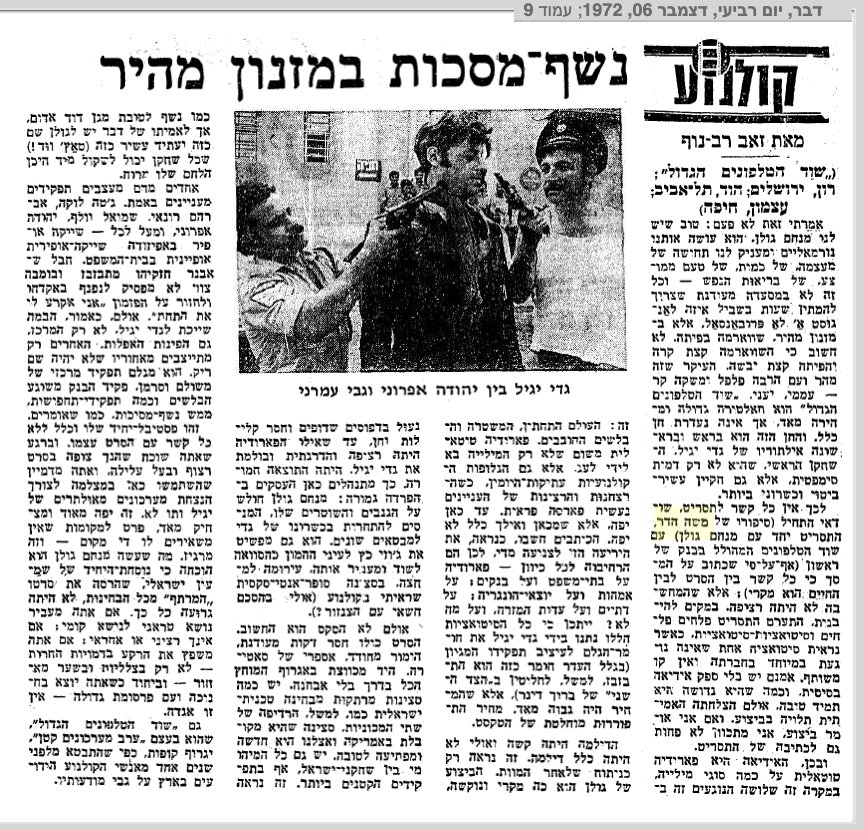
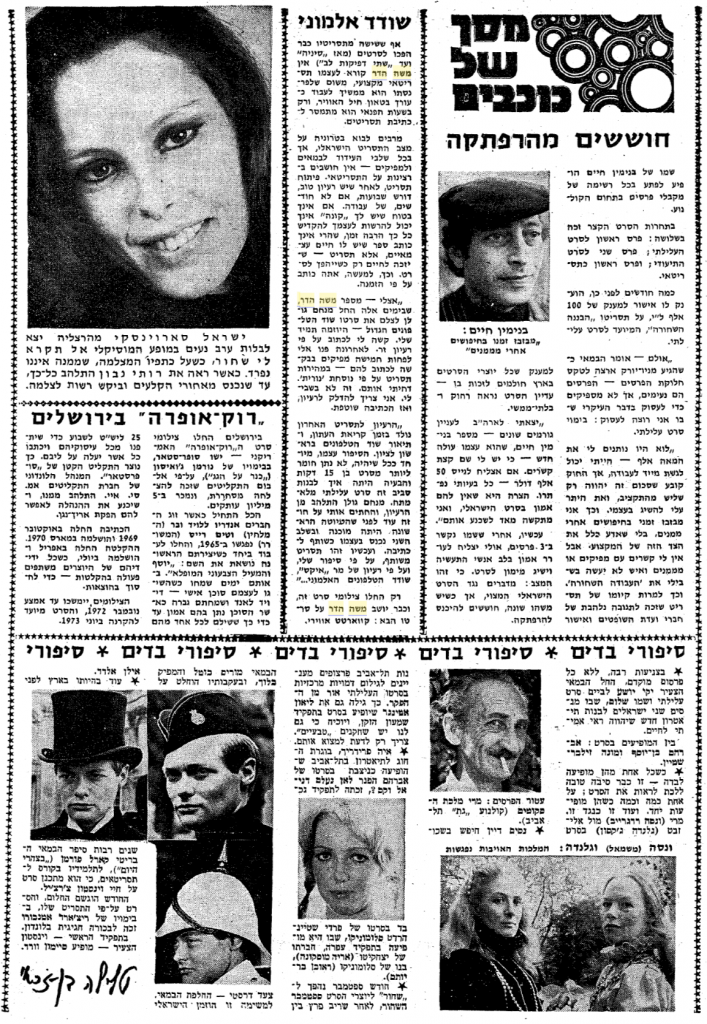
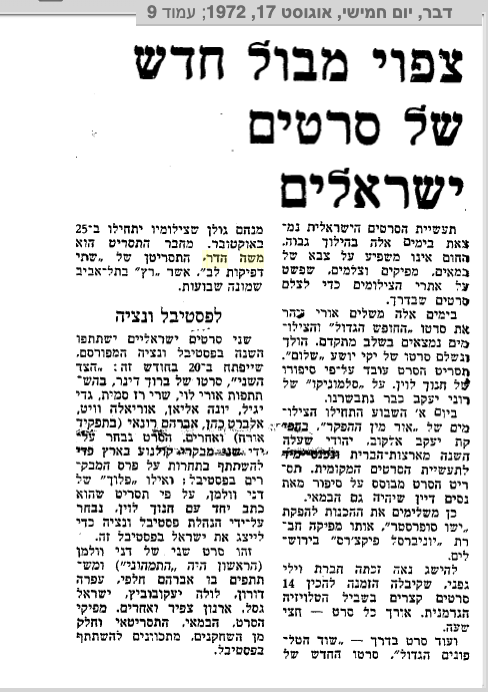
Gamliel The Wise (Jewish Marriage) 1973
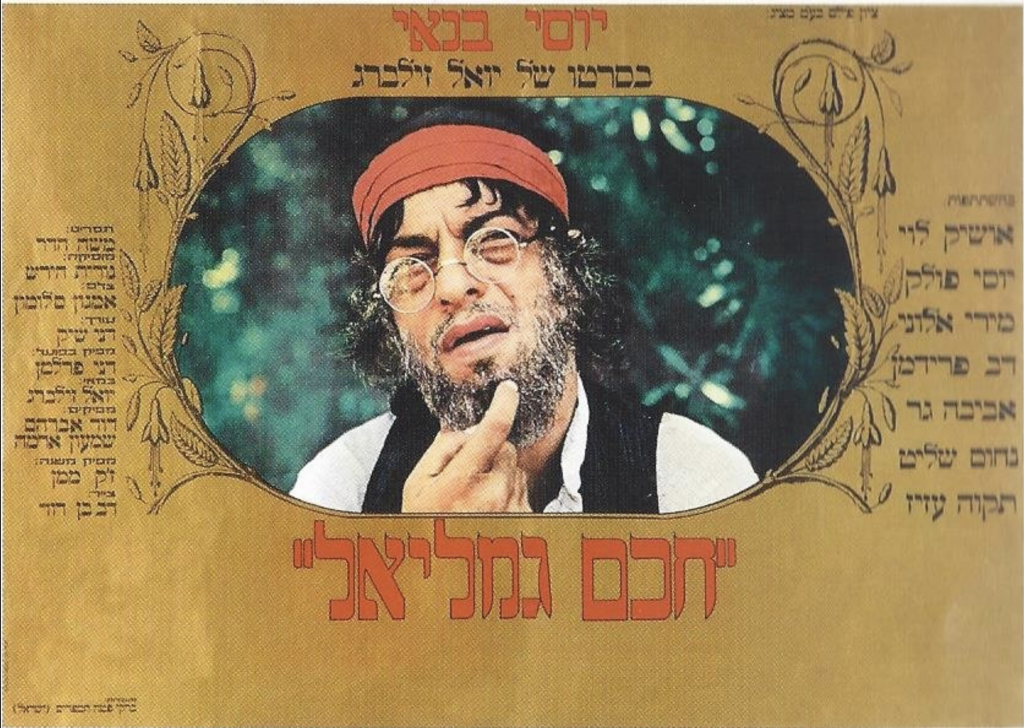
A romantic drama. it was initially released as “Gamliel The Wise” and later was changed to “Jewish Marriage”. It won the Bronze medal at the Third Film Festival in Atlanta, Georgia, Spring 1979.
The Plot: "Gamliel The Wise" (Yossi Banai) is a kind of folk wiseman (a Shaman) who makes a living by providing folk remedies, treatments against the evil eye and assistance with matchmaking.
His son Nissim (Oshik Levy) does not believe in his father's “witchcraft” but respects him. He works in a nearby quarry alongside his boss, the deputy director of the quarry, Uzi (Dov Friedman).
Gamaliel's daughter is Dinah (Aviva Gar), a single young woman. An ugly suitor (Nahum Shalit) asking for her hand in marriage but is thrown out of the room with the help of Shalom (Yossi Pollack), the shrewd assistant of Gamliel the wise.
Uzi, the quarry deputy director, is about to propose to his girlfriend Ruthie (Miri Aloni). He bought her a beautiful engagement ring and the couple made an appointment at rabbinic council to issue a marriage certificate.
Nissim brings his boss, Uzi to meet his father, Gamliel the Wise. Uzi’s eyes meet Dina's eyes and the sparks fly. Gamaliel invites Uzi to a Yemenite wedding in the moshav. Uzi meets Dina again and invites her to go sightseeing in his car, where he shows her the engagement ring, he bought his girlfriend. He puts the ring on Dinah’s finger. This has been witnessed by some people who report it to Gamaliel the Wise, who tells the amazed Uzi that according to Jewish law, by performing this action, he sanctified Dinah and she is now his wife.
Uzi leaves the place and tells his trouble to Ruthie, but the next day Gamliel the Wise sends Dinah to the quarry to be with her husband. Uzi initially wants to send her back but soon falls in love with her, yet, again and they spend the night together in his office at the quarry.
Ruthie arrives to the quarry and sees them both. She understands the situation and decides to hire a lawyer (Shimon Lev-Ari) who asks Gamaliel the Wise to annul Uzi and Dinah's marriage but to no avail. It is only after Ruthie lies and tells him that she is pregnant, that he consents and permits the divorce.
After the divorce ceremony at the rabbinate council, Dinah returns to her home depressed. Uzi rekindles his relationship with Ruthie. While preparing for their marriage he is constantly thinking about Dinah.
There are few twists, tricks and turns…an explosion in the quarry, brings the “divorced” couple back together and true love finally prevails.
The soundtrack was written and composed by Nurit Hirsch . The theme song "Dinah" performed by Miri Aloni to the words of Tirza Athar.
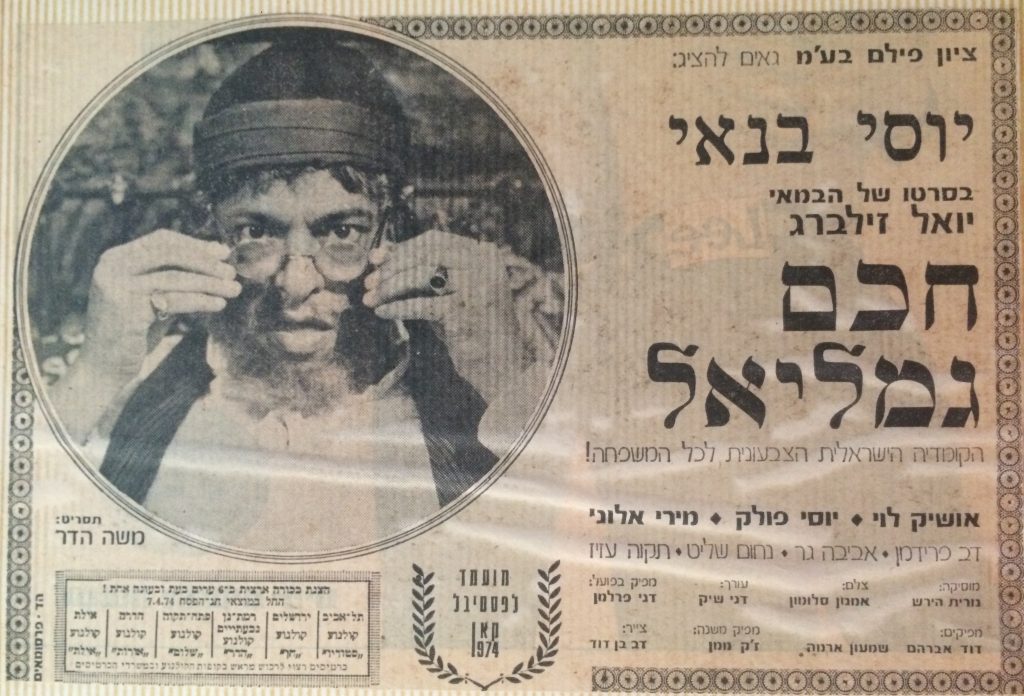
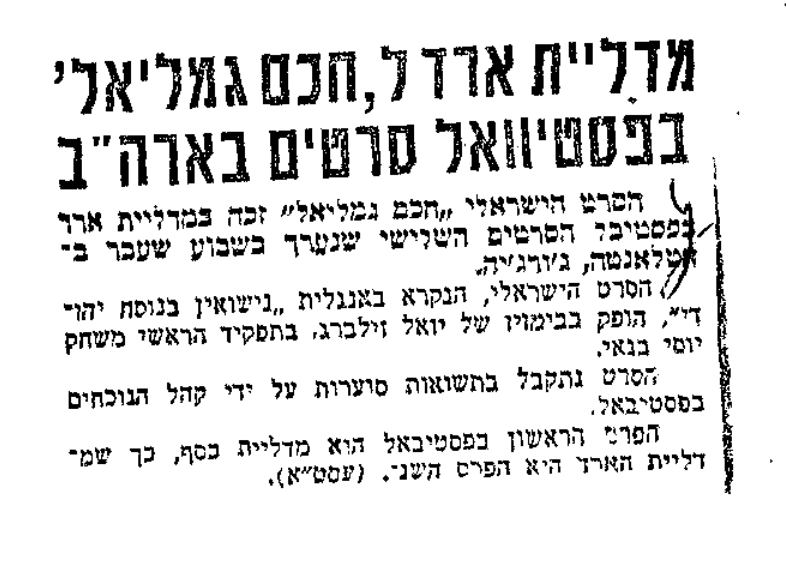
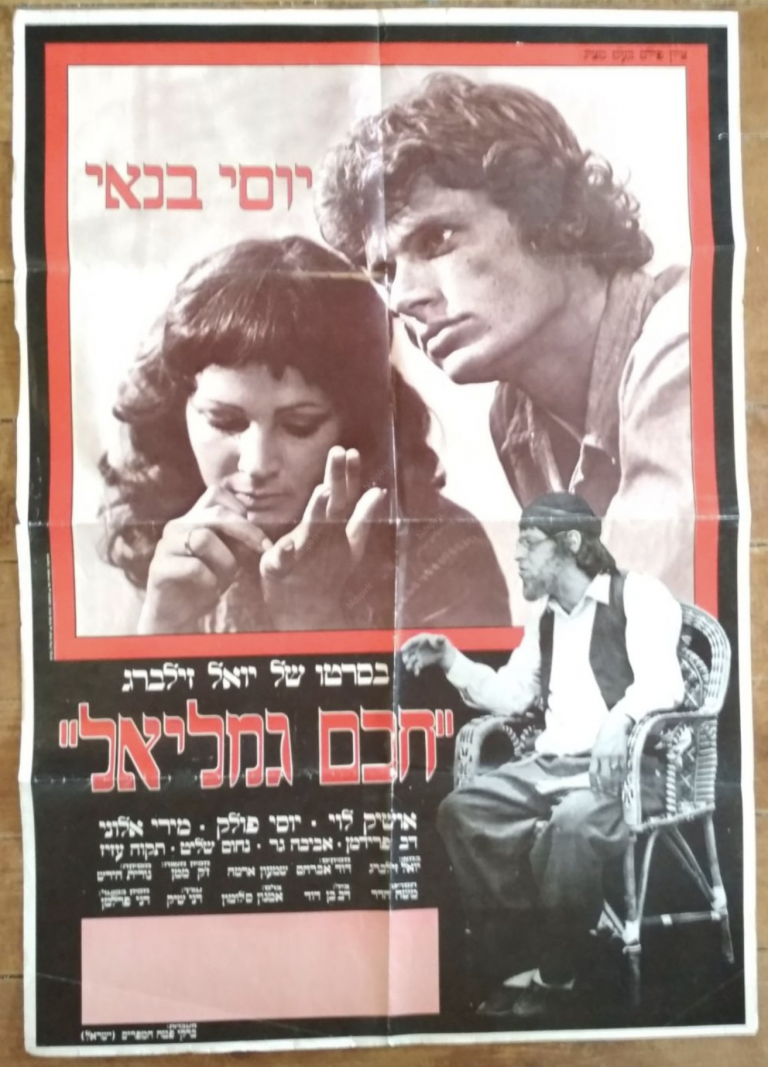
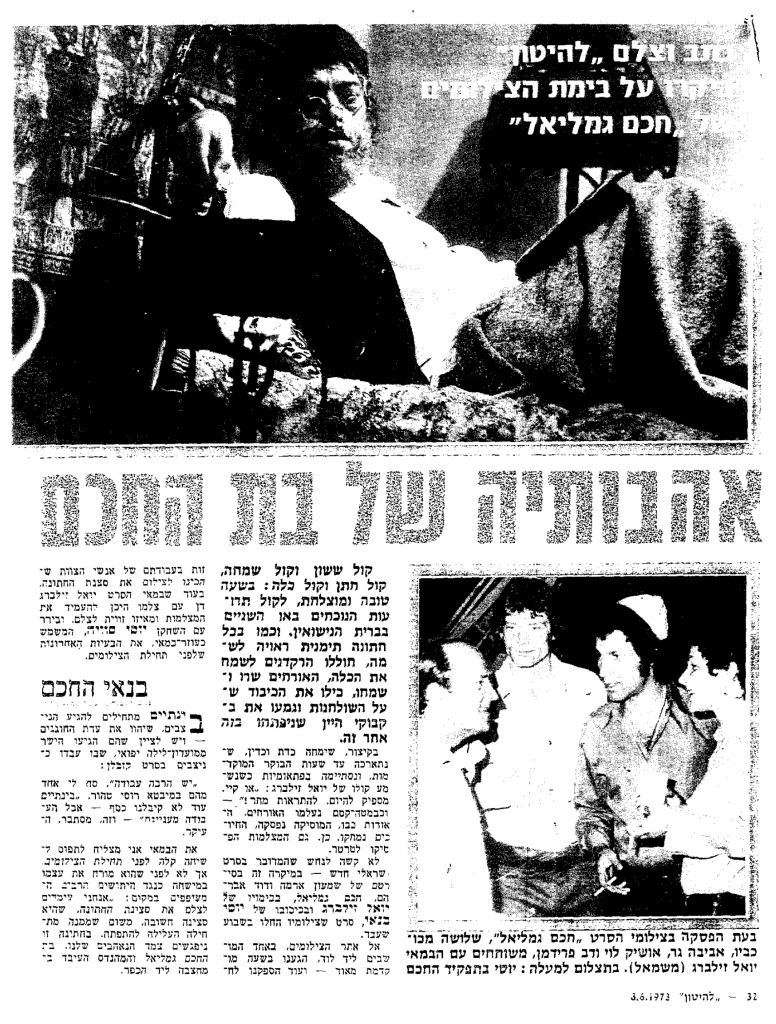
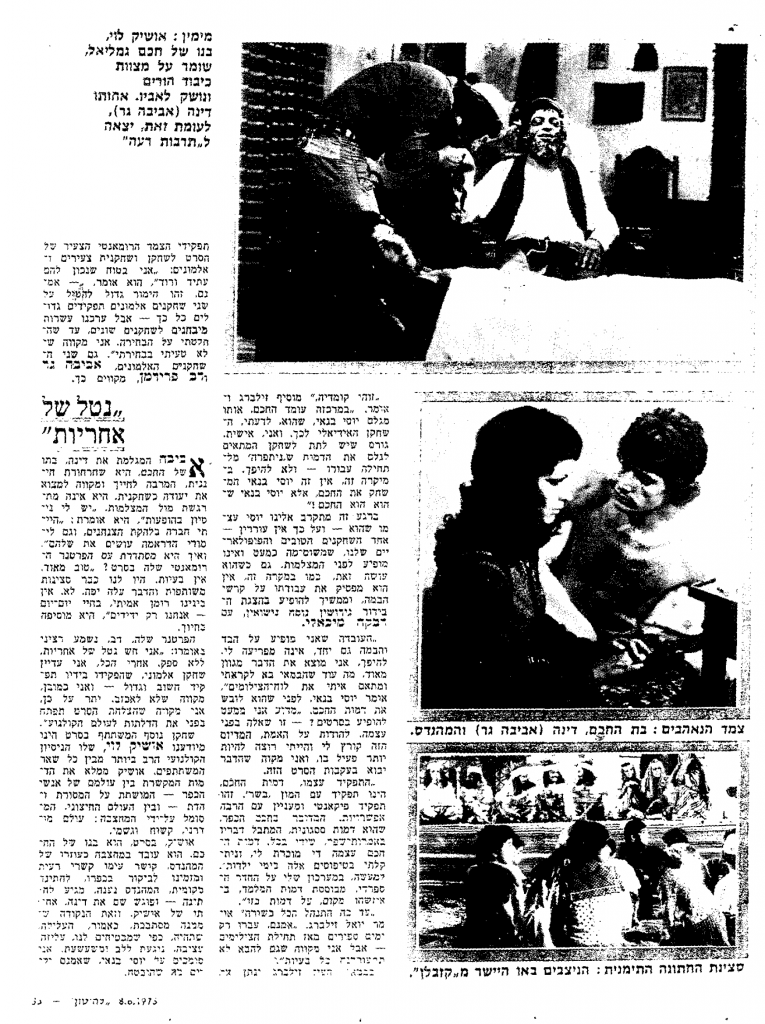
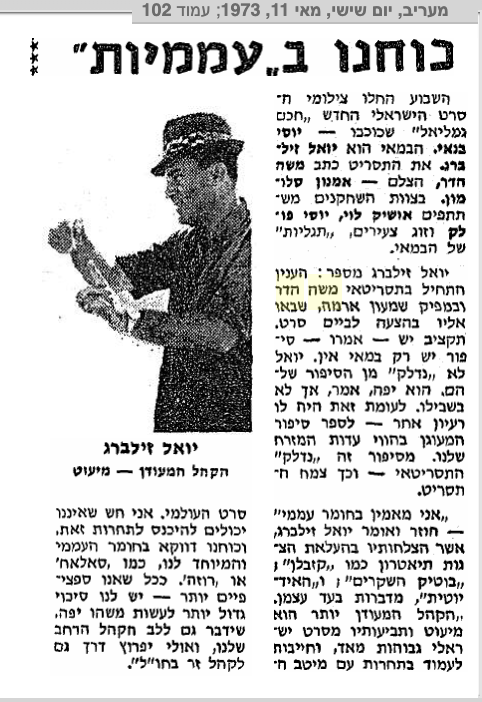
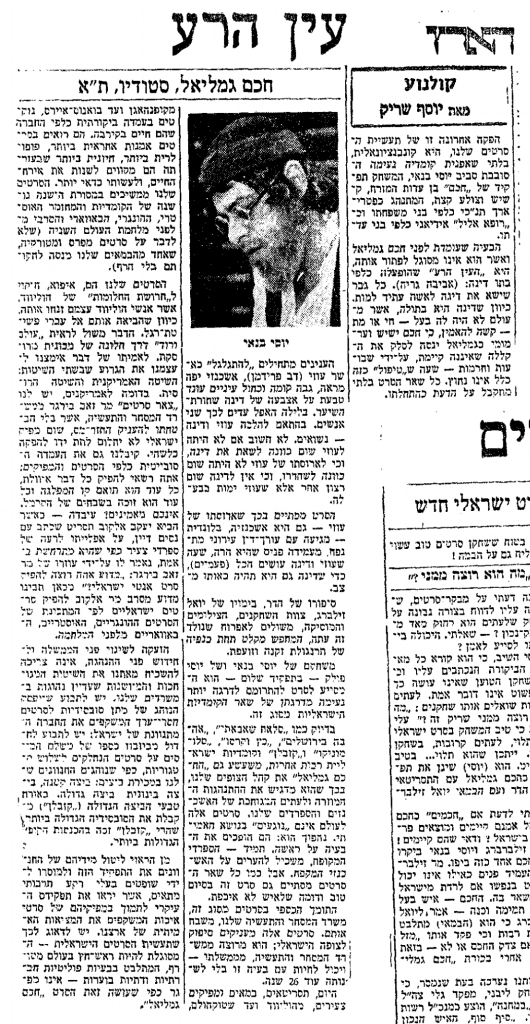
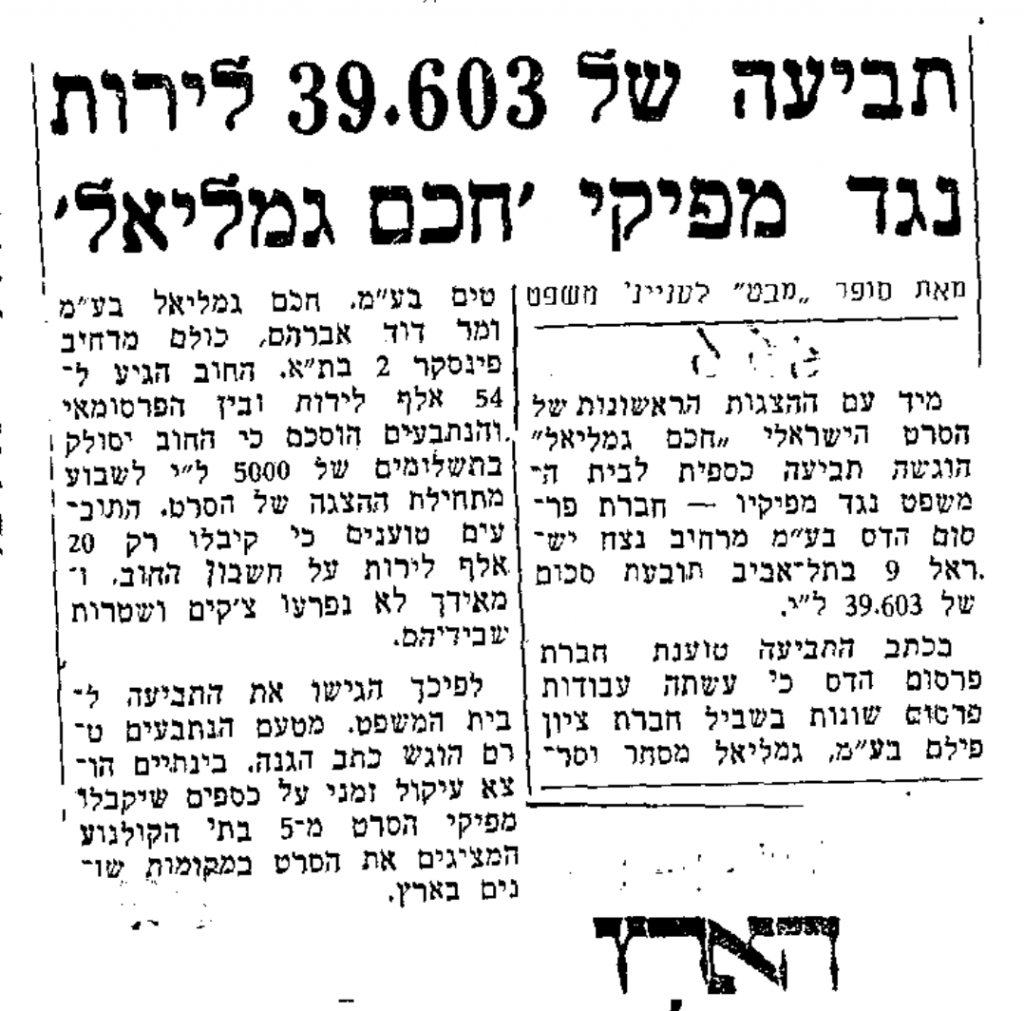
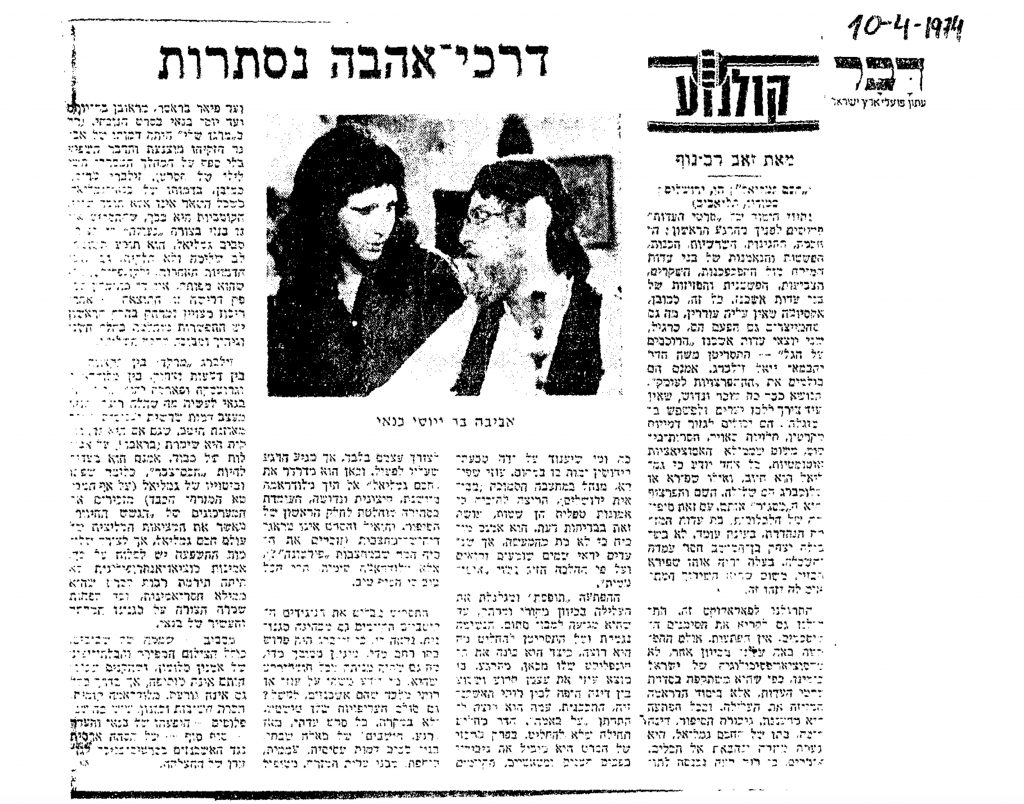
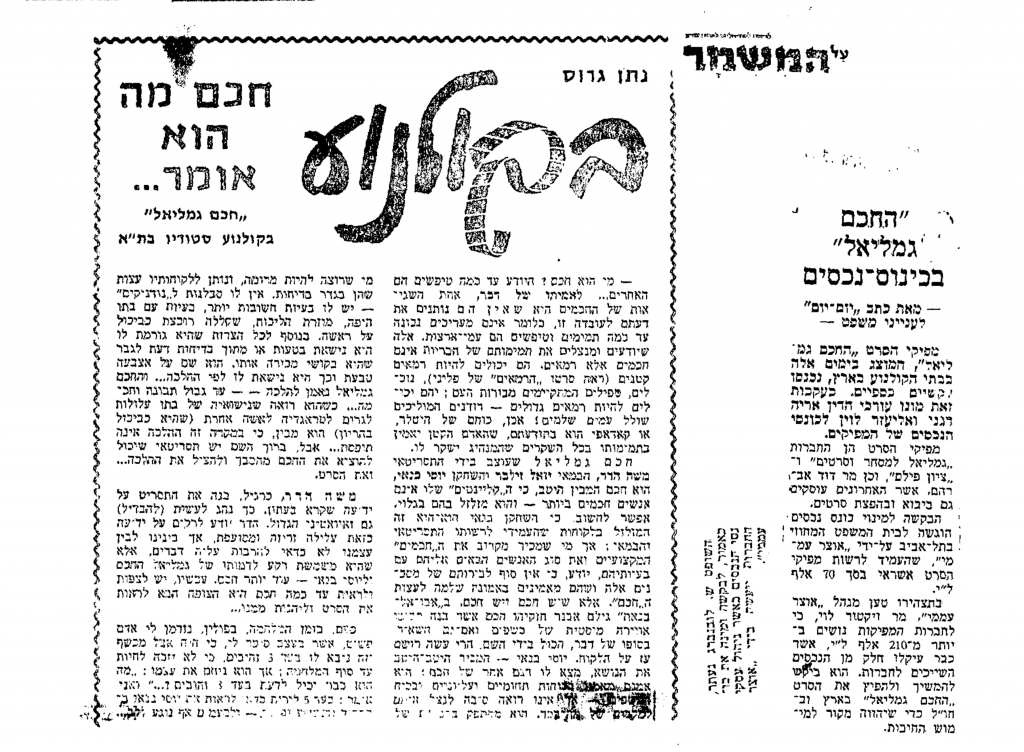
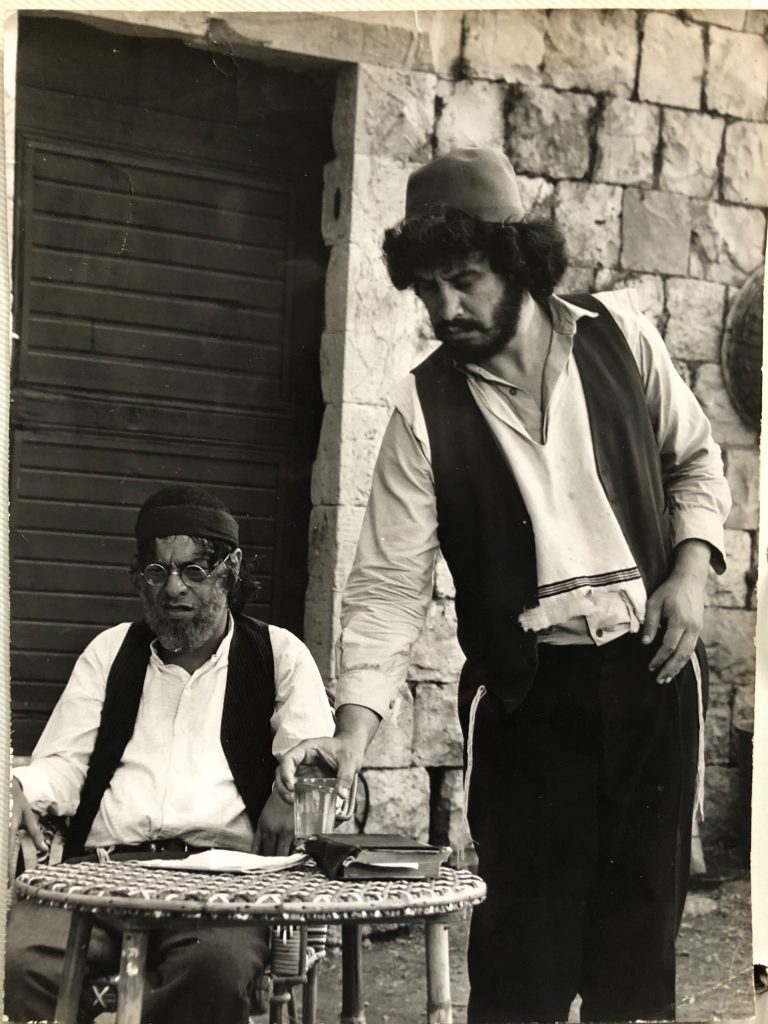
Down The Drain - 1989
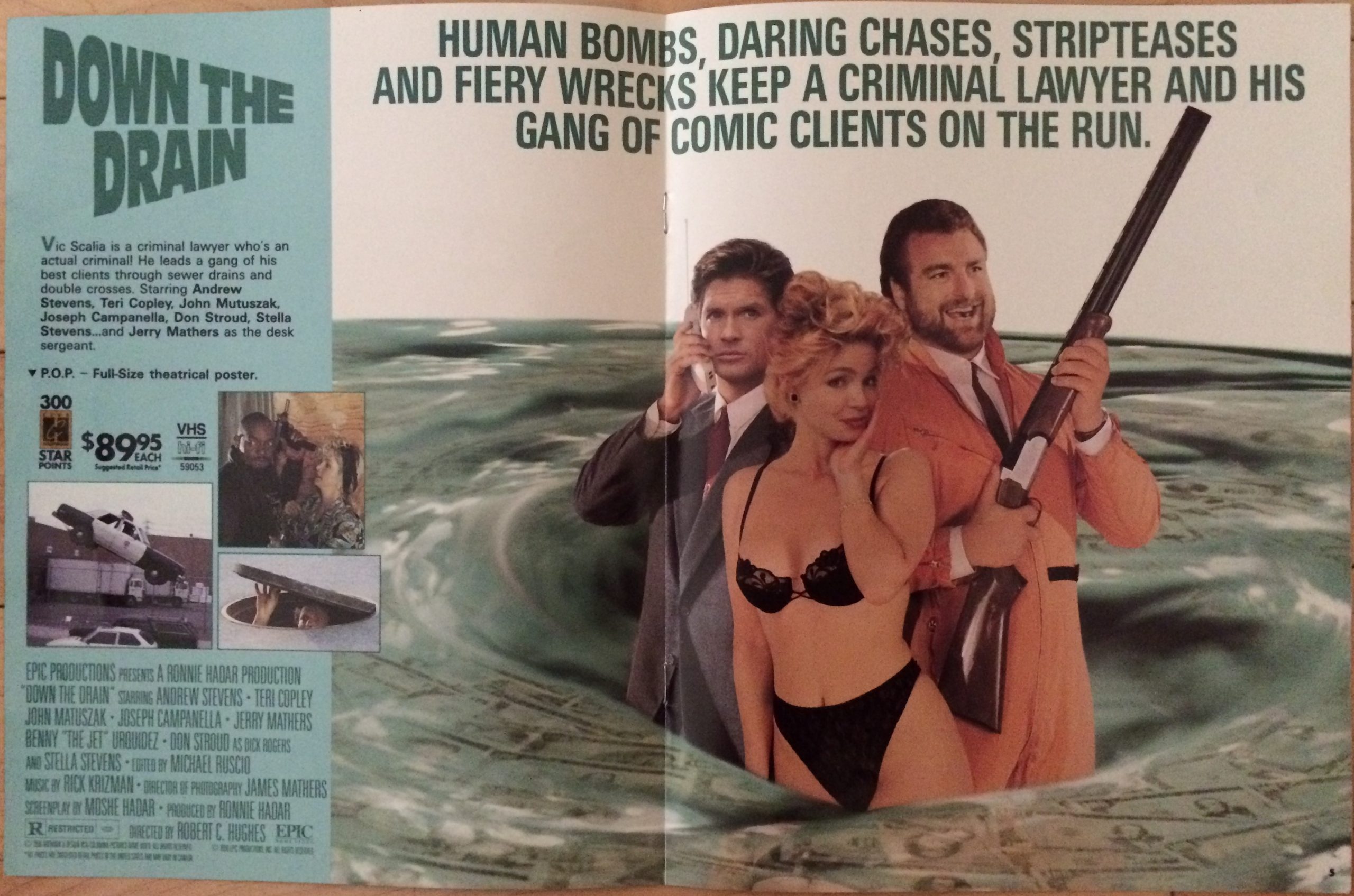
The Plot: A crooked lawyer (Andrew Stevens) brings together some of the clients he has gotten off and together they scheme to rob a bank vault. However, after the robbery, the lawyer discovers that the "goods" he's stolen is actually a top-secret microchip that foreign powers are after, and they will stop at nothing to get it.
Trailer from the movie Down the Drain 1989
TAKE TWO -1987
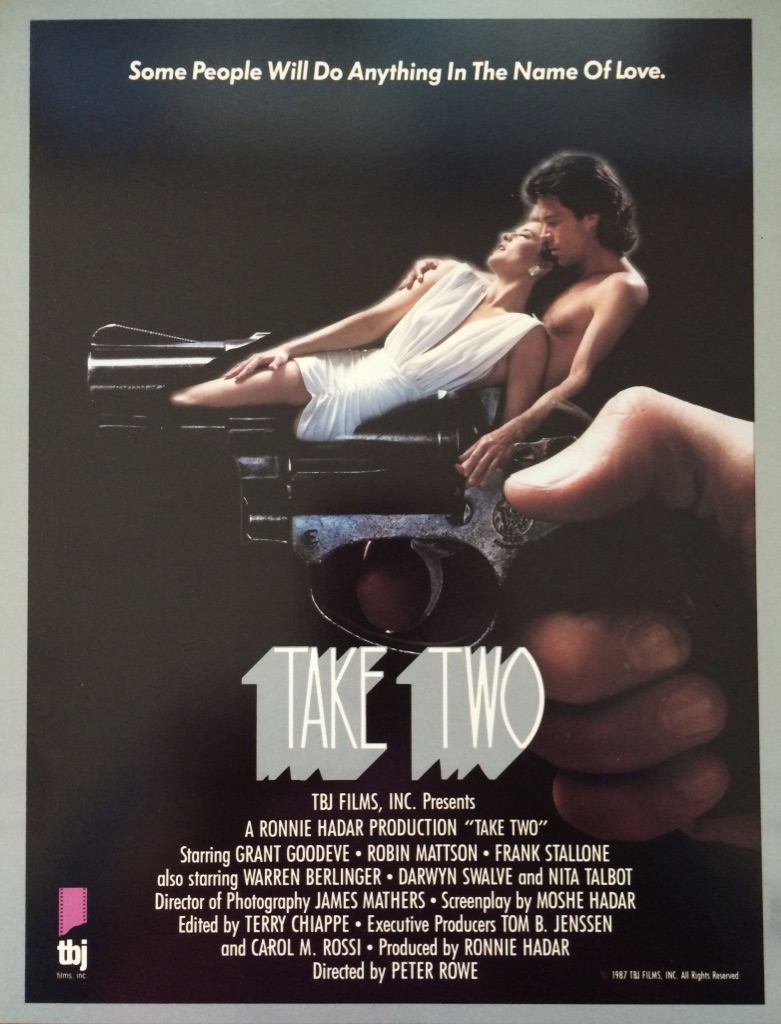
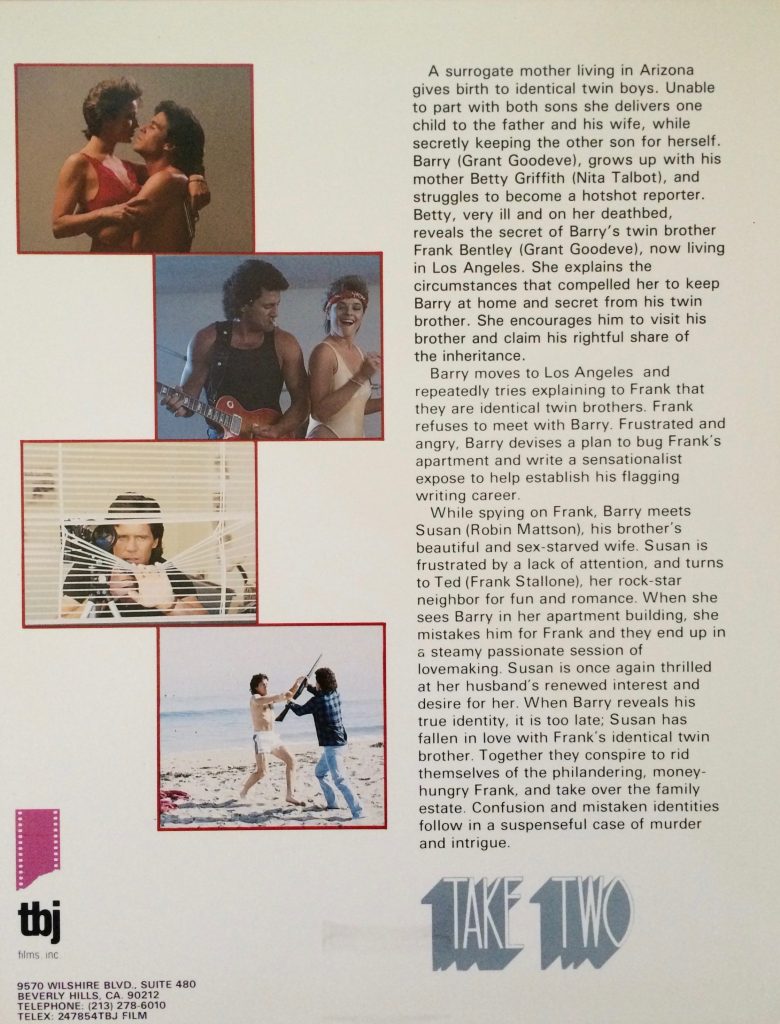
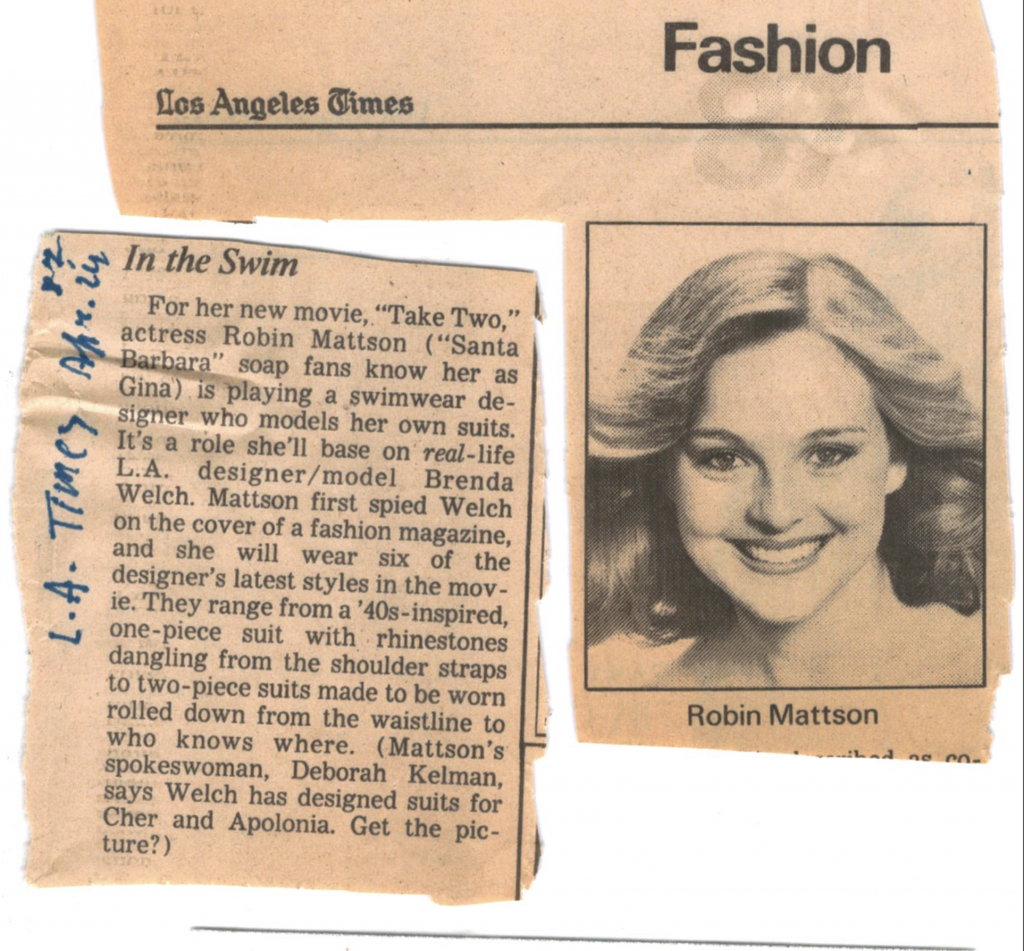
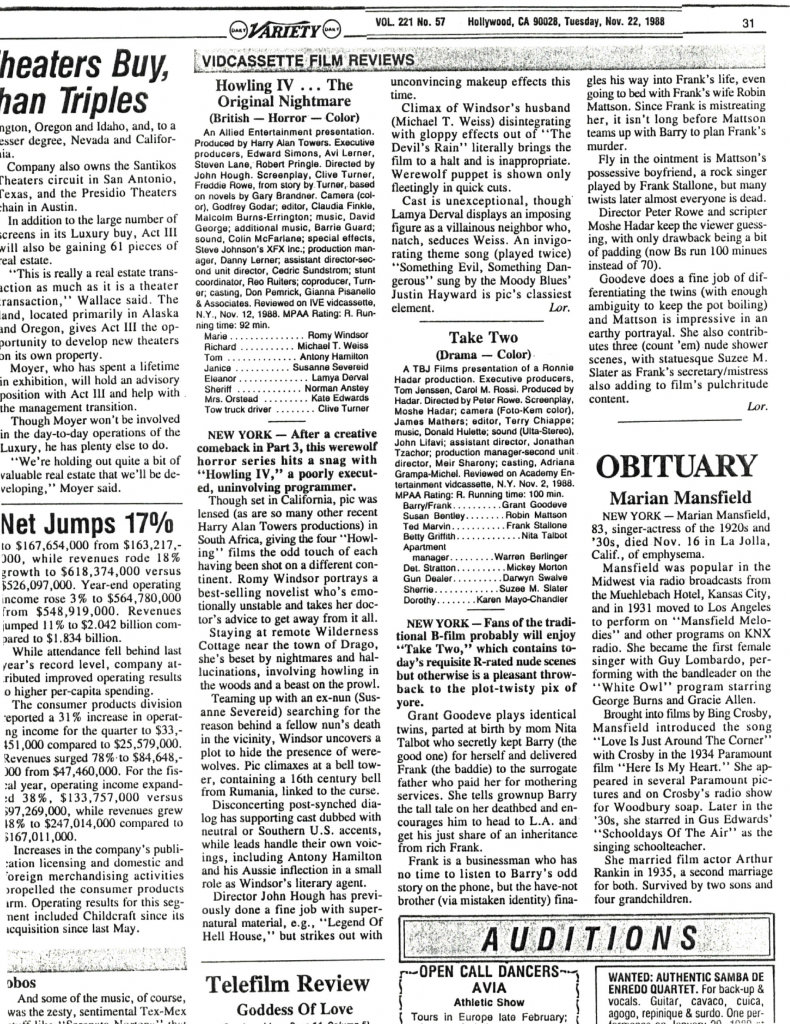
Cartel - 1989
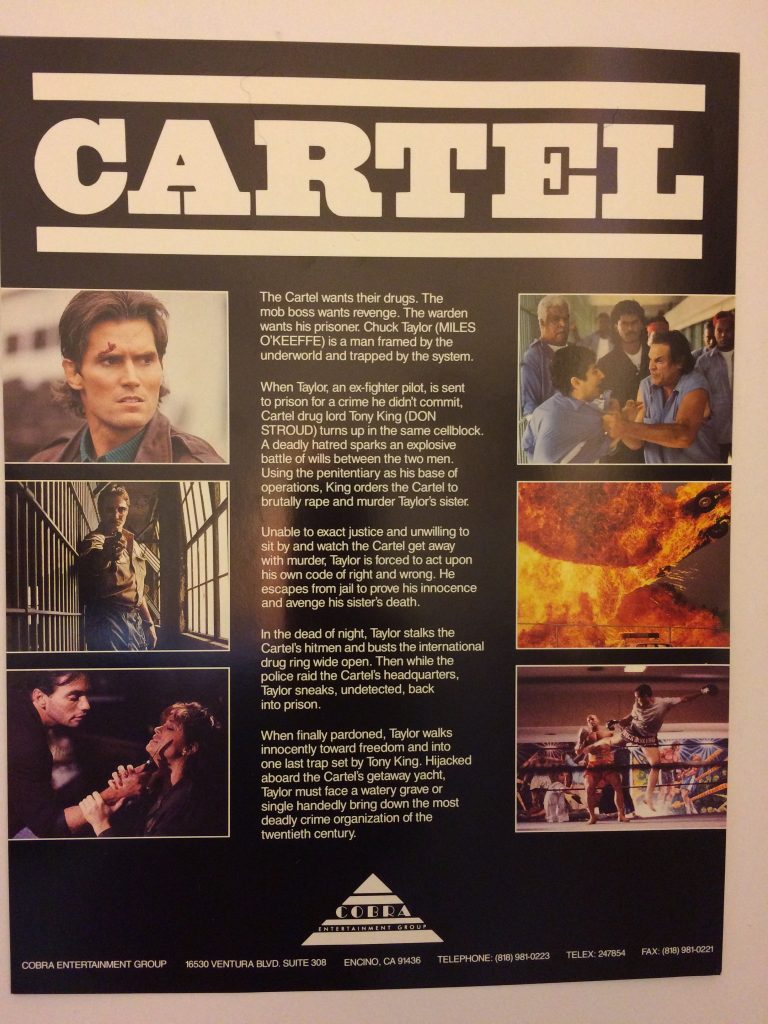
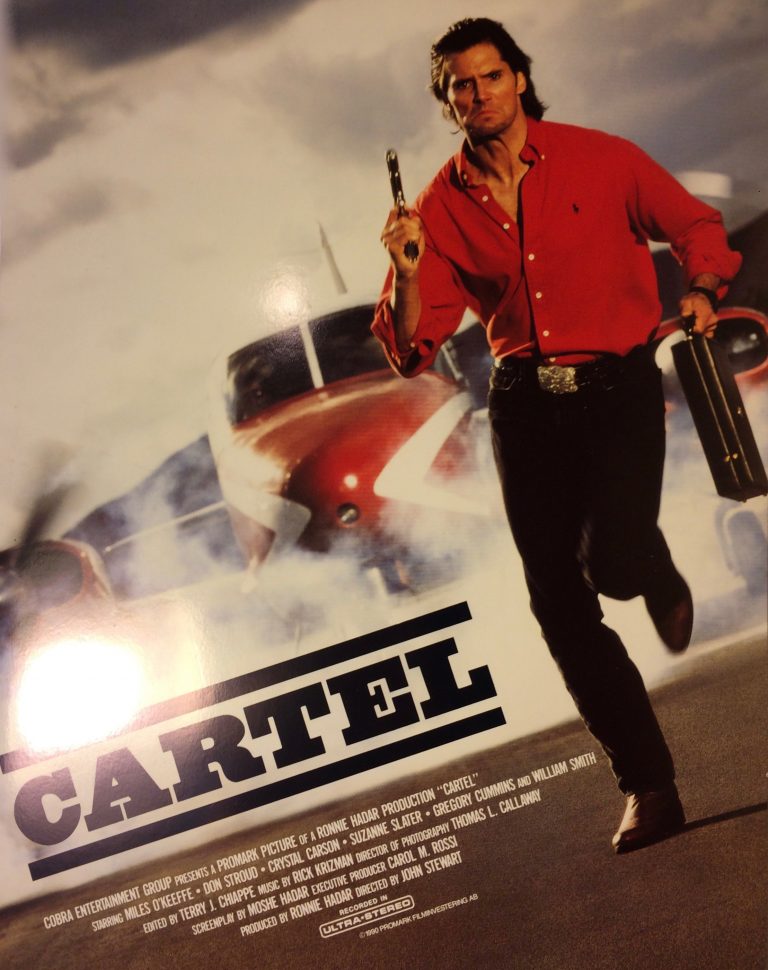
Watch the movie Cartel
Image Sources: Moshe "Pommy" Hadar's Archive

